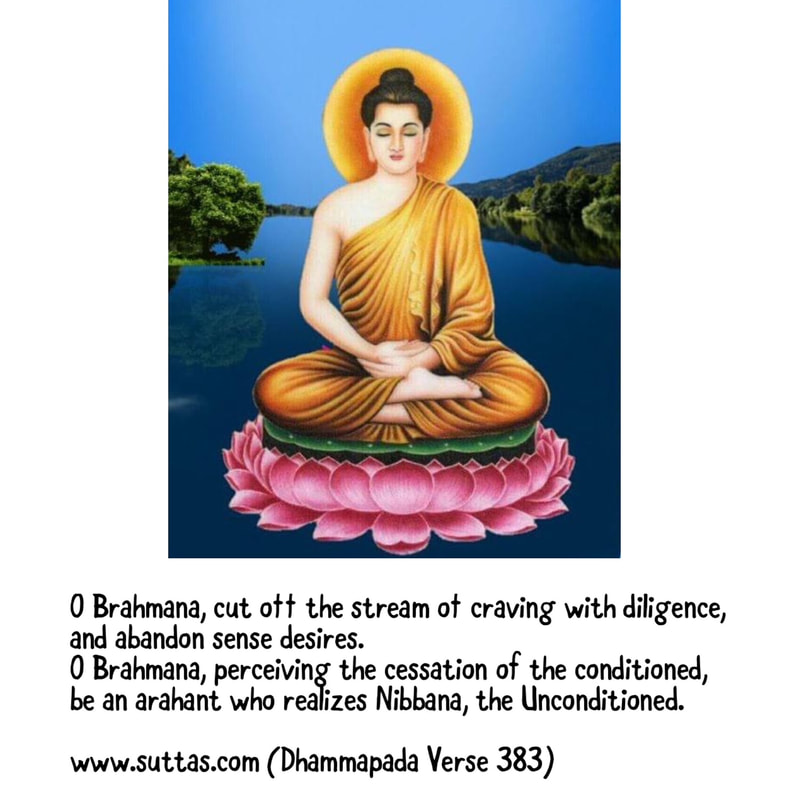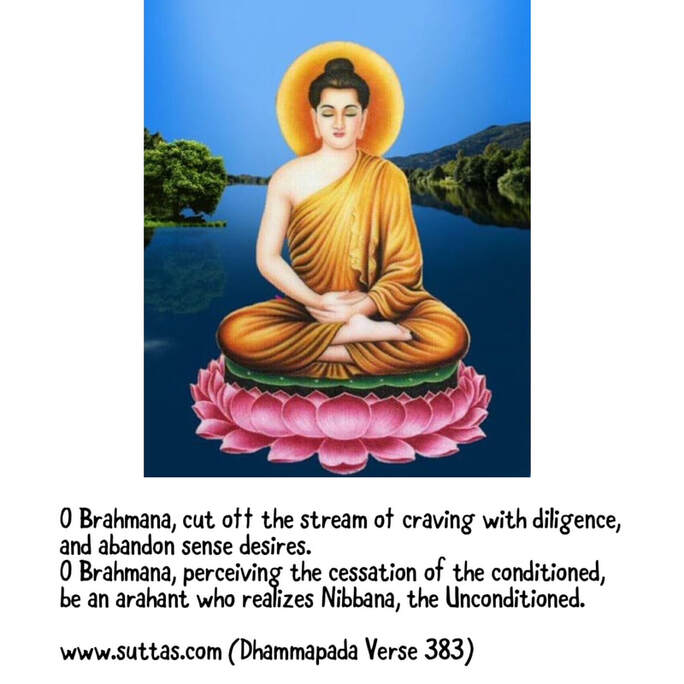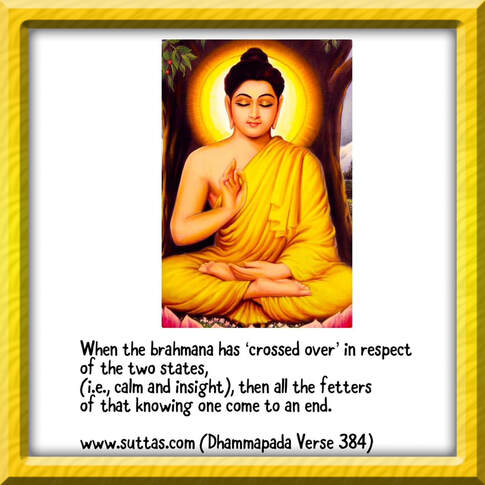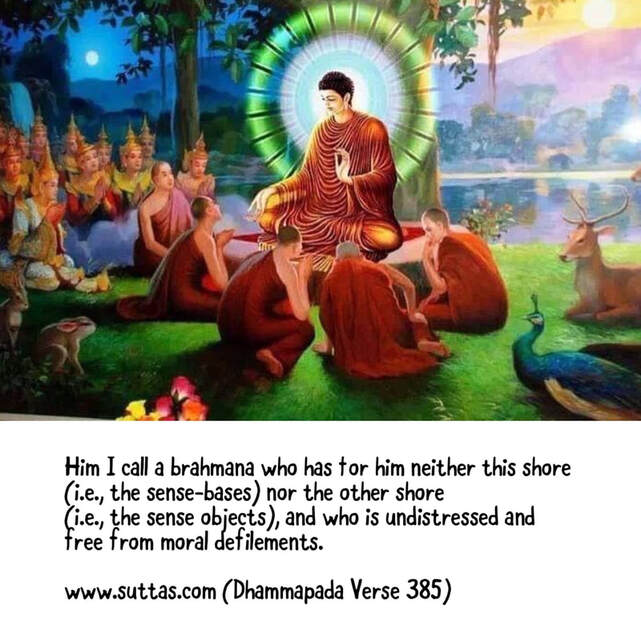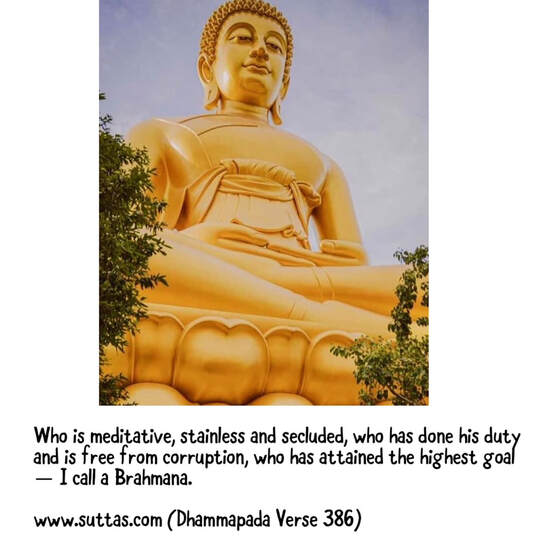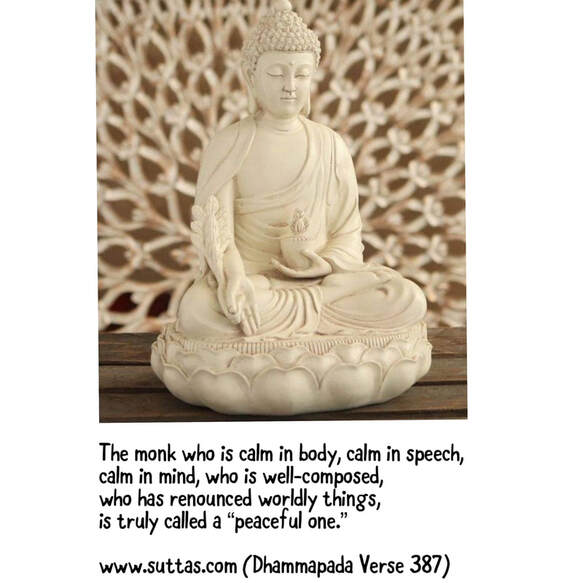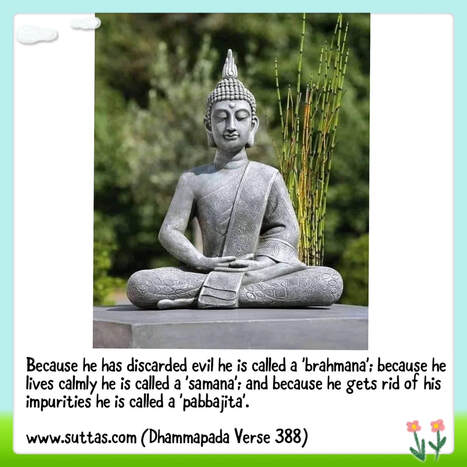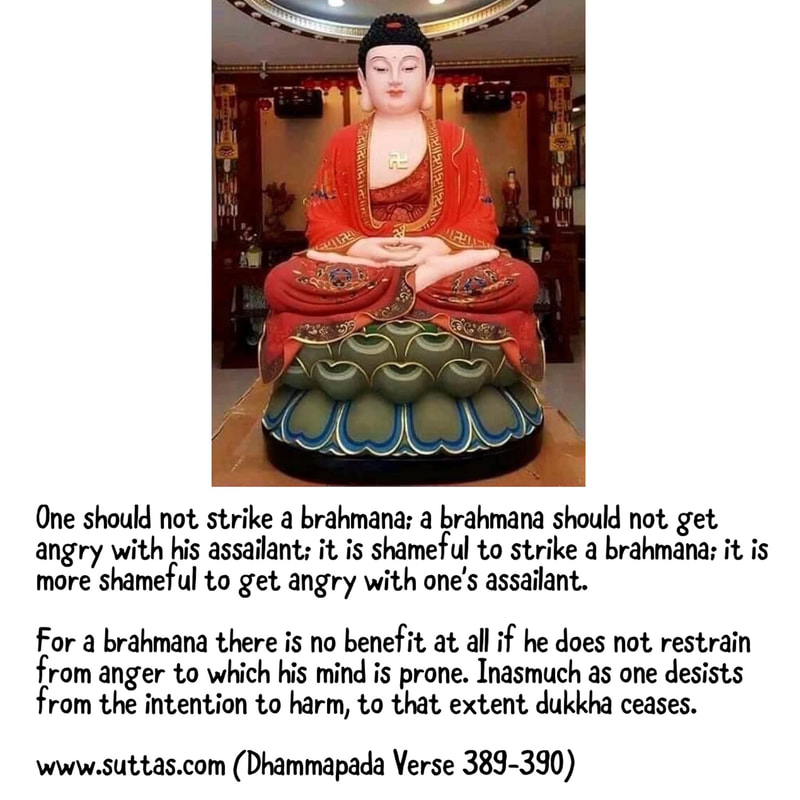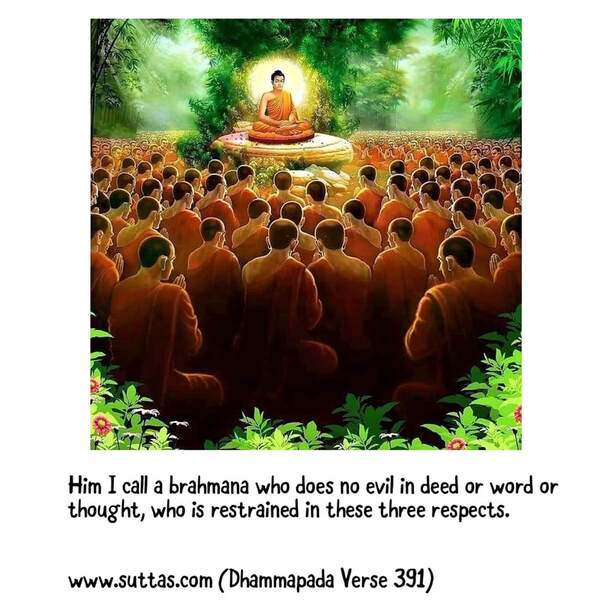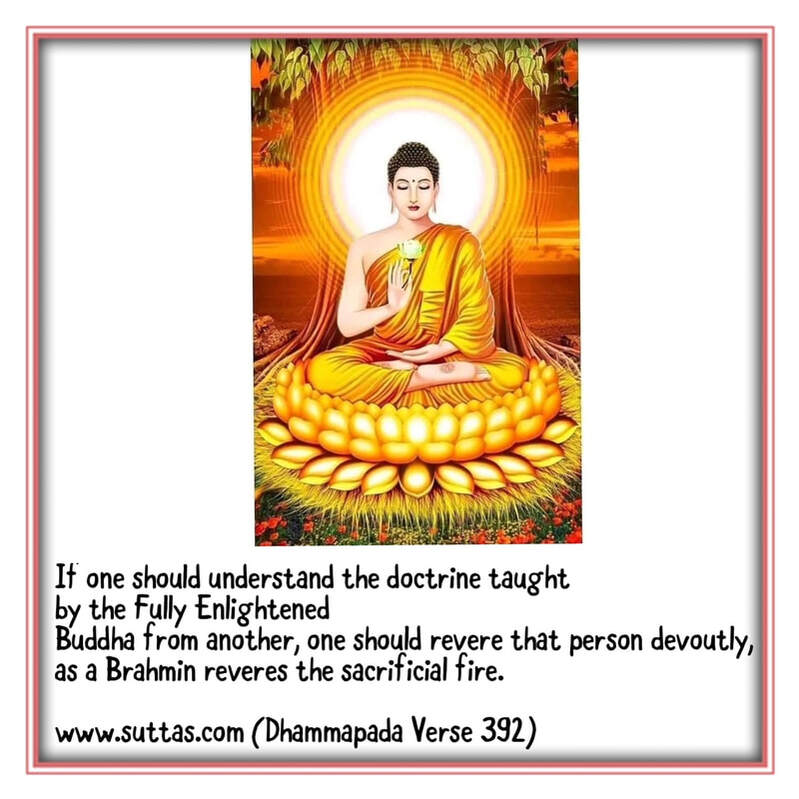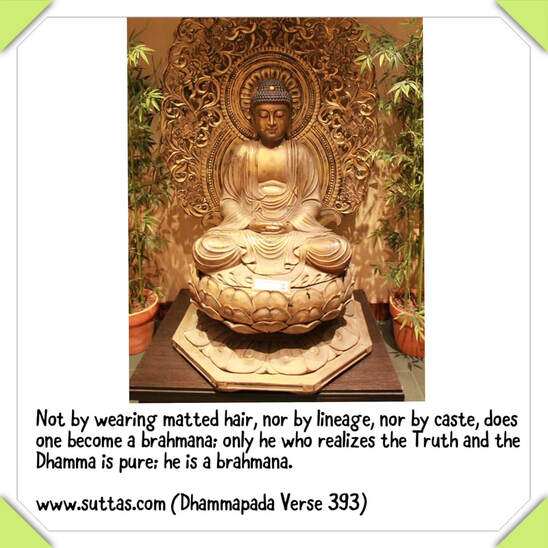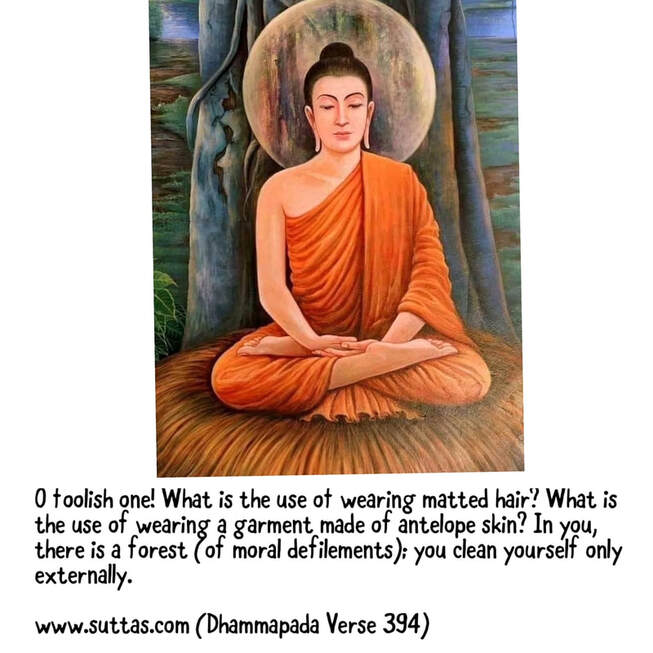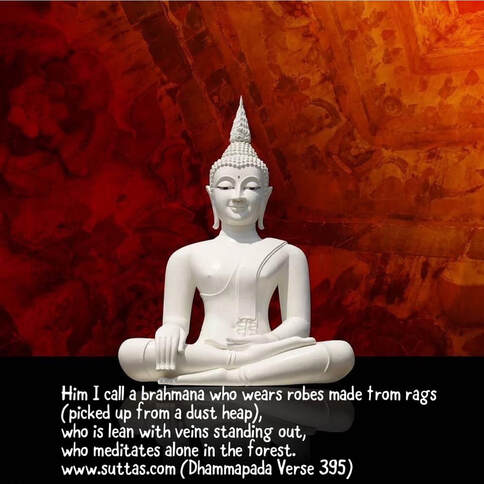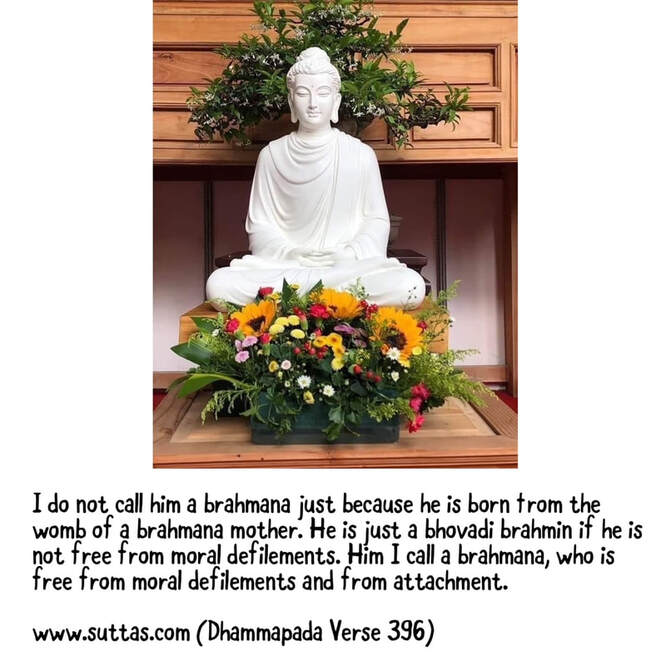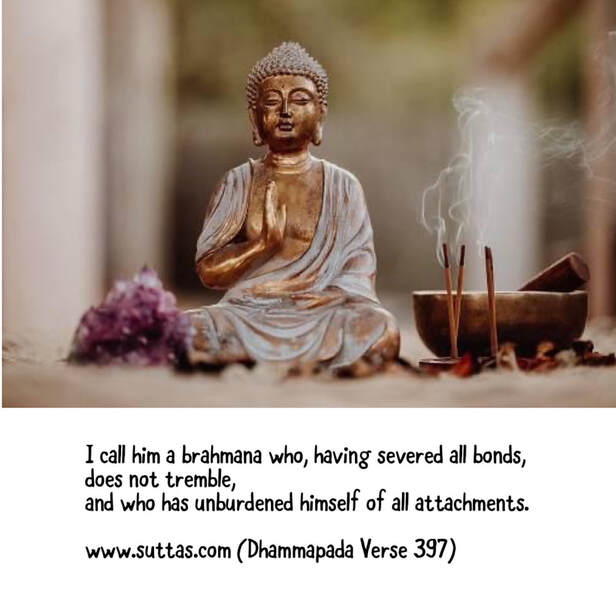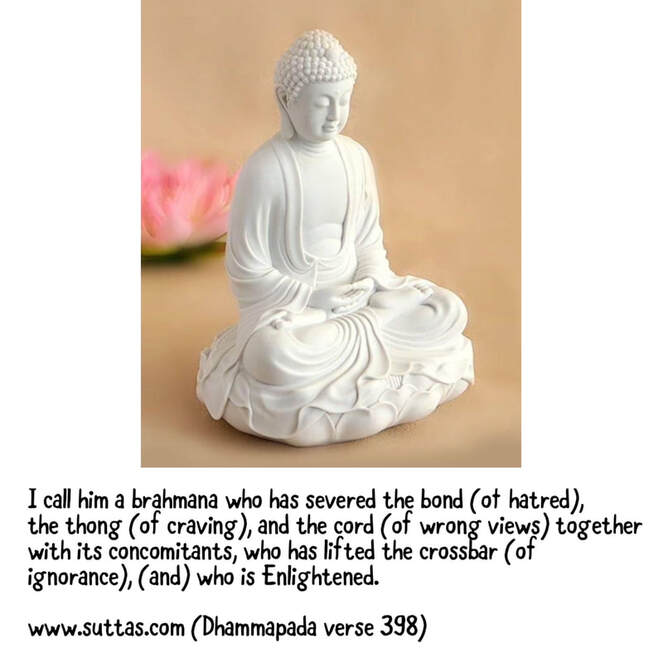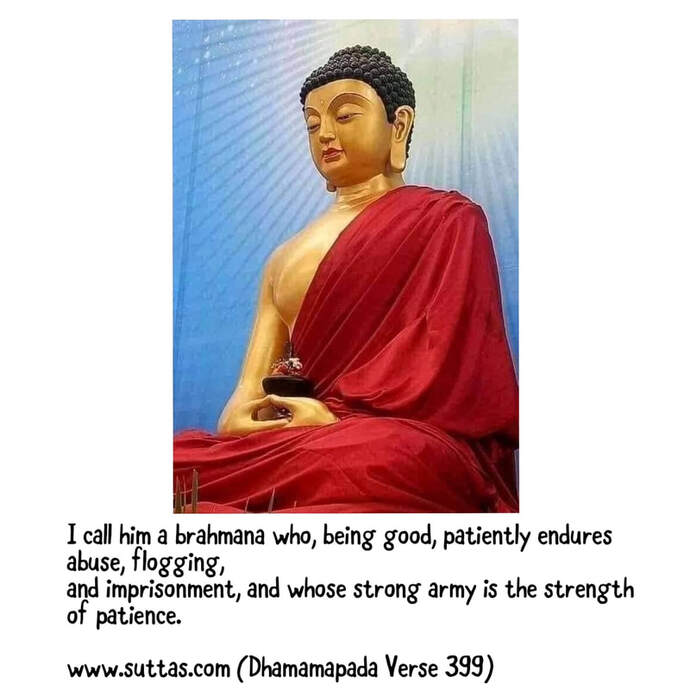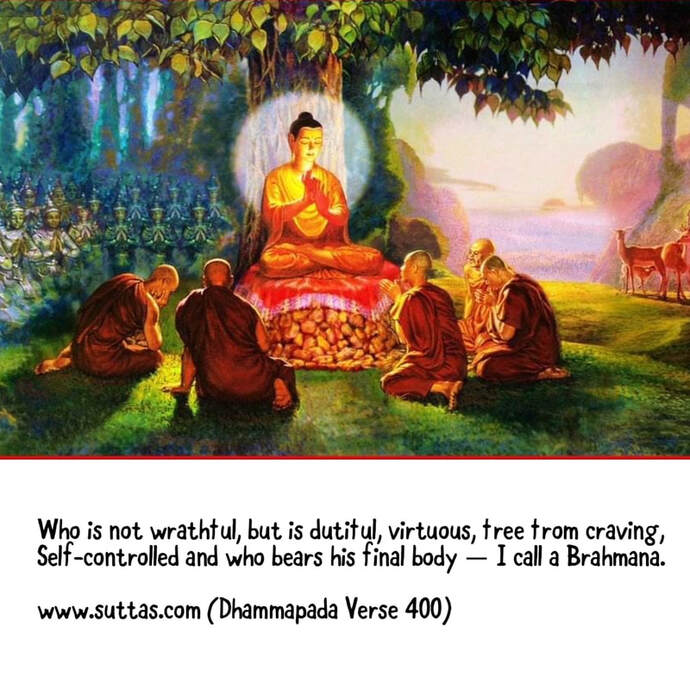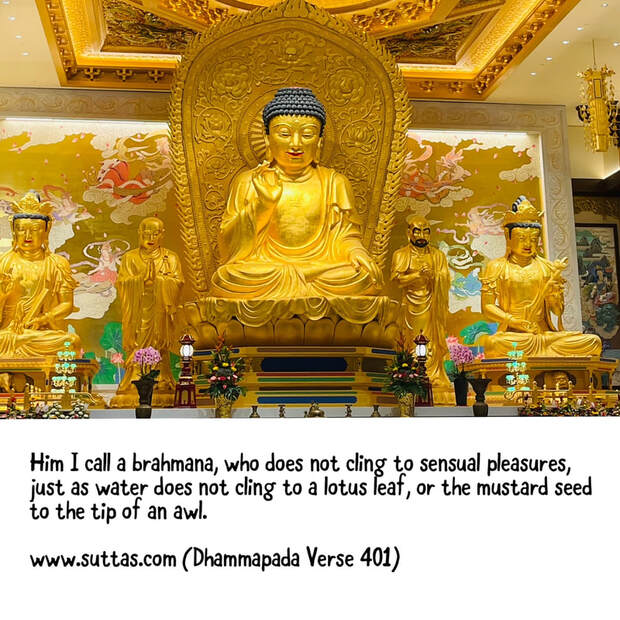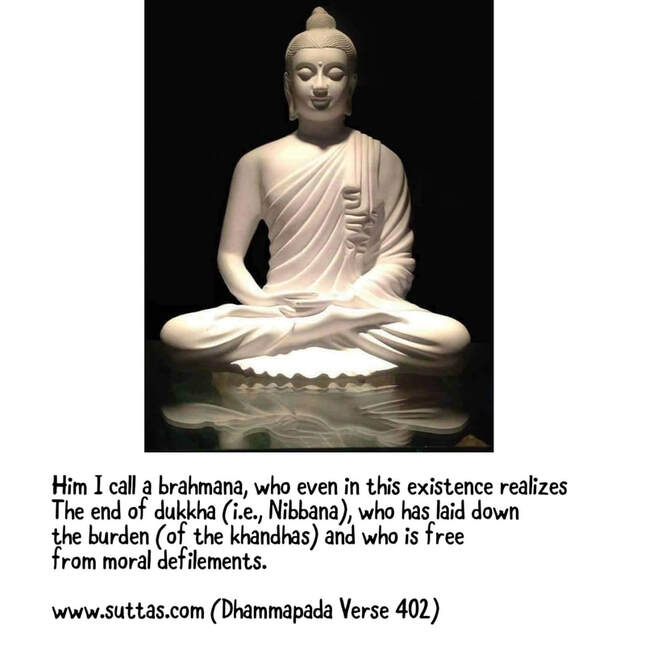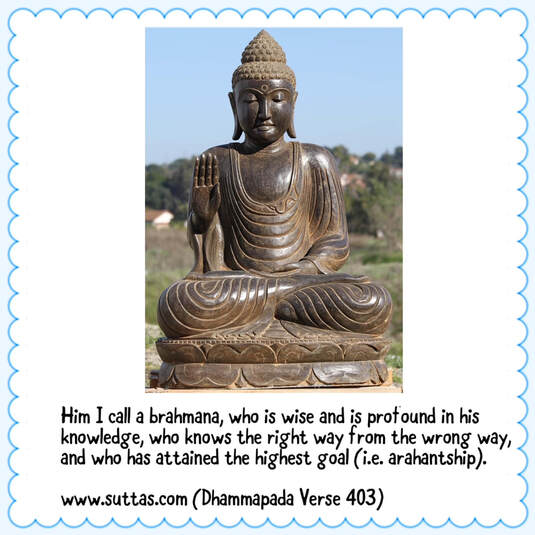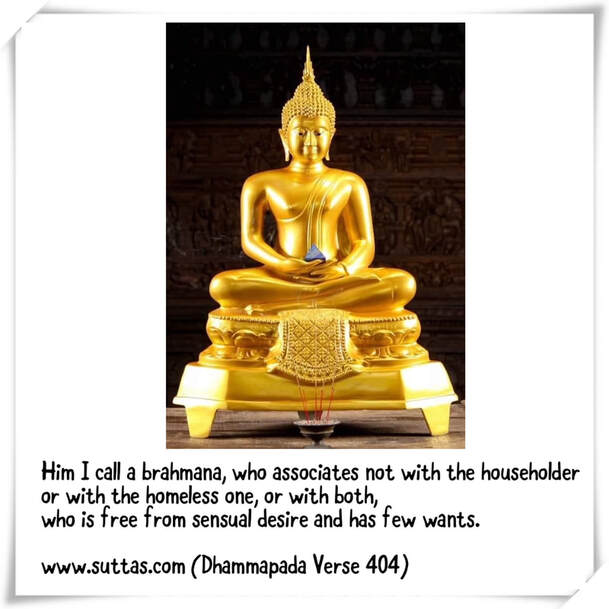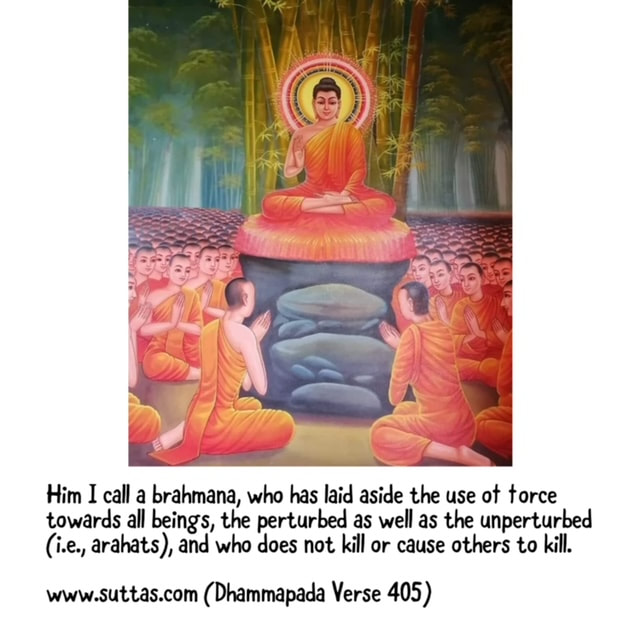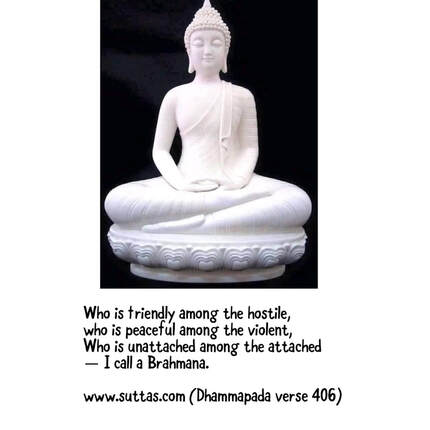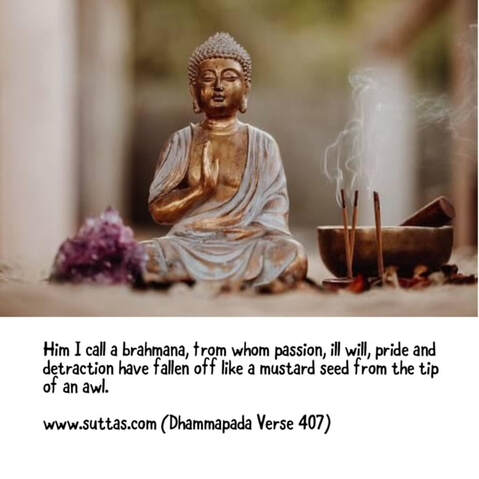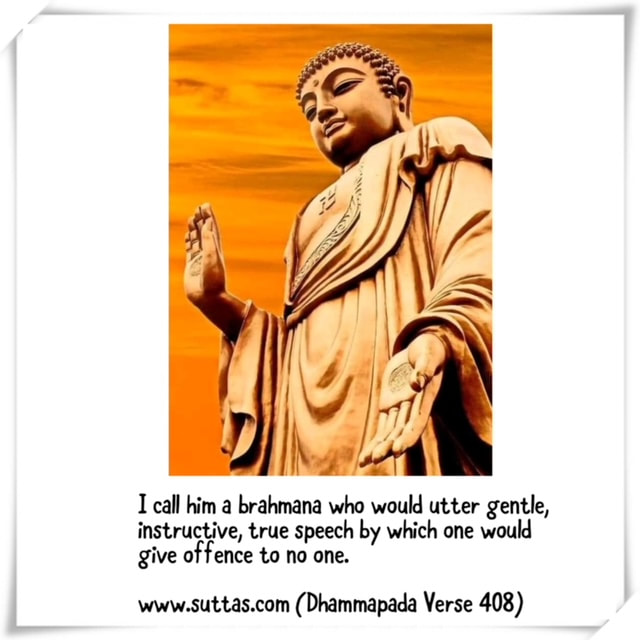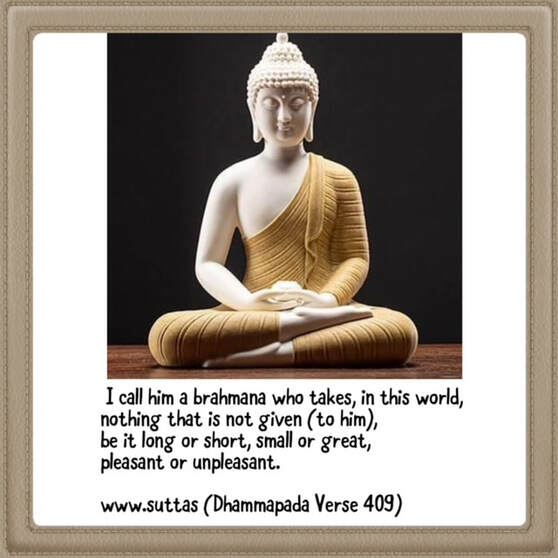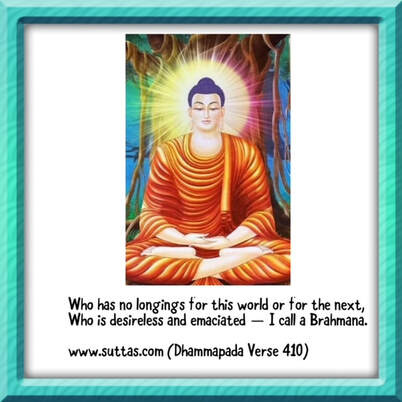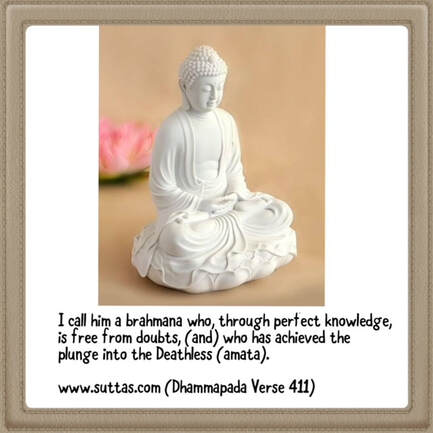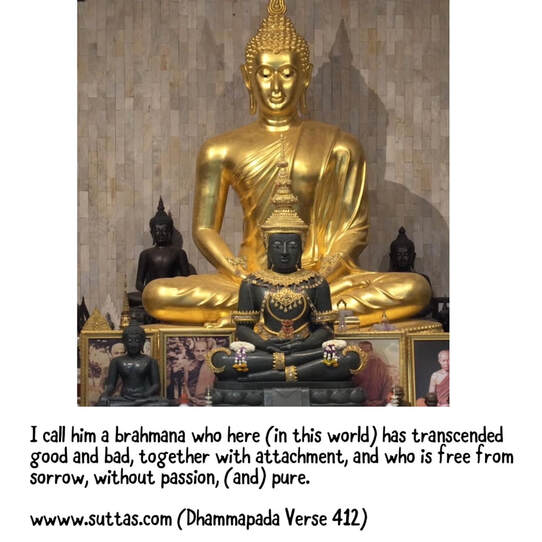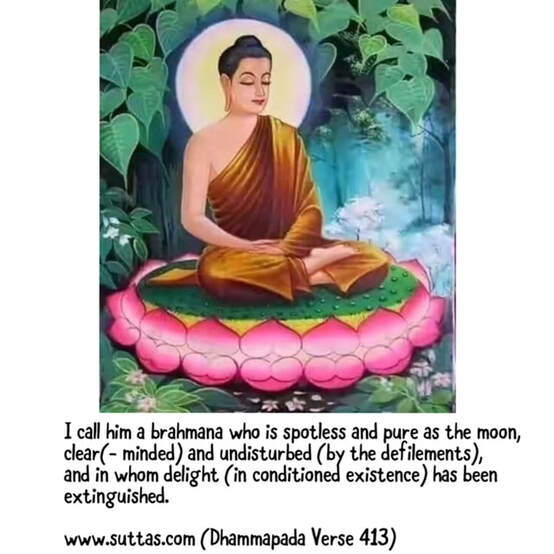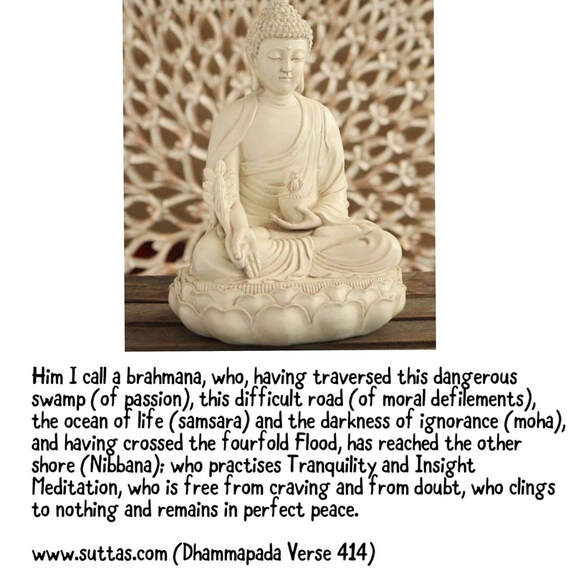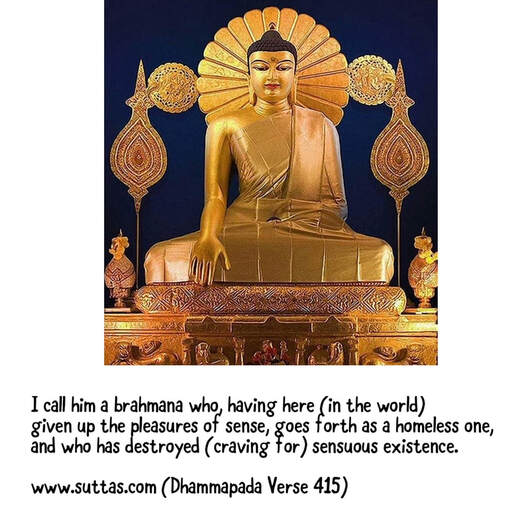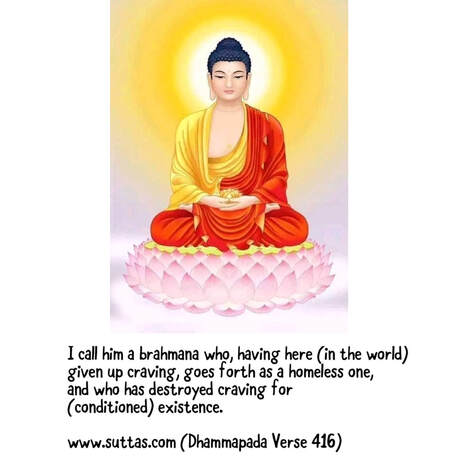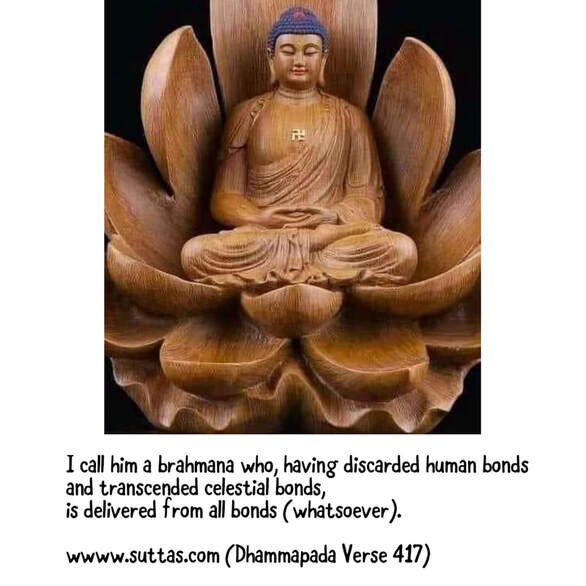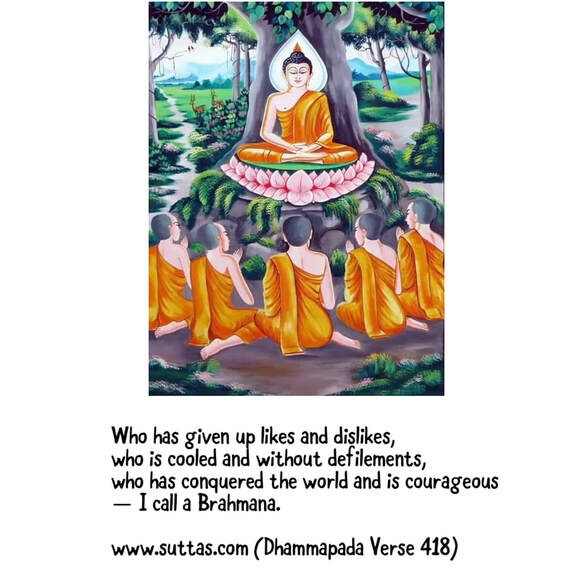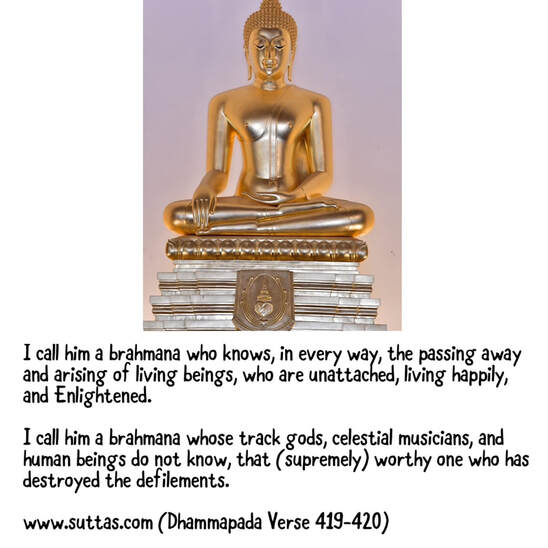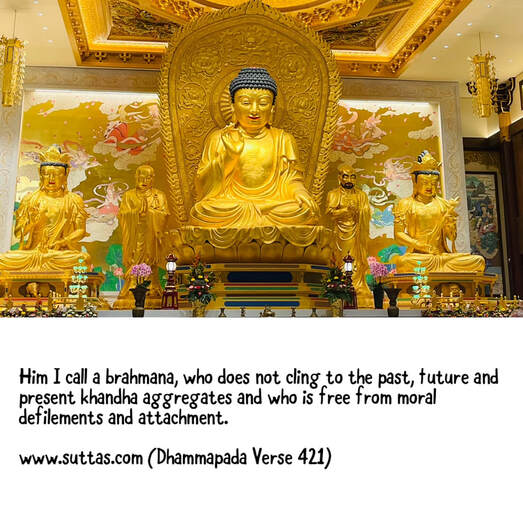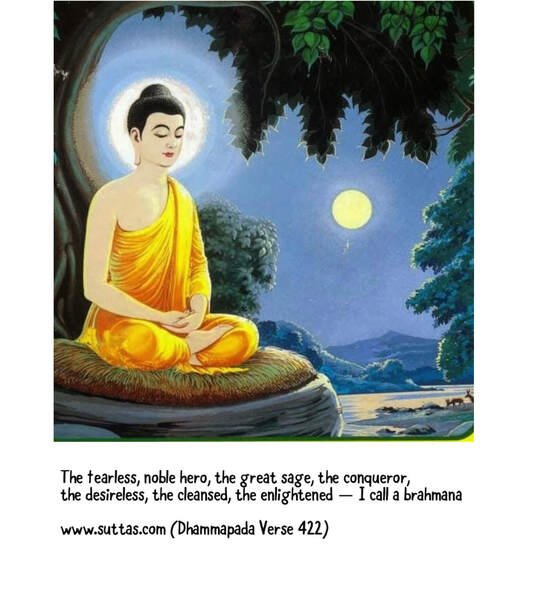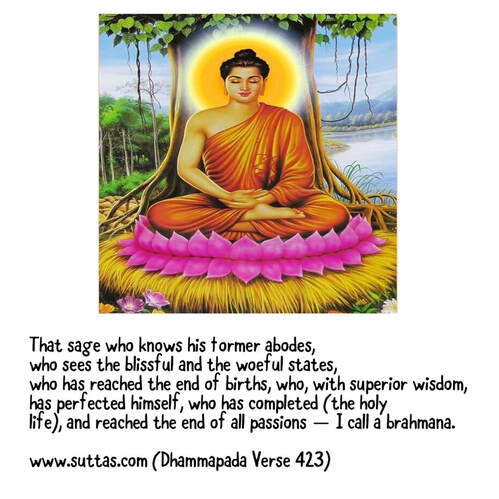- Home
-
The Buddha and His Teachings
- Chapter 1 The Buddha
- Chapter 2 His struggle for enlightenment
- Chapter 3 The buddhahood
- Chapter 4 After The Enlightenment
- Chapter 5 The invitation to expound the dhamma
- Chapter 6 Dhammacakkappavattana Sutta
- Chapter 7 The Teaching of the Dhamma
- Chapter 8 The Buddha and his relatives
- Chapter 9 The Buddha and his relatives
- Chapter 10 The Buddha's chief opponents and supporters
- Chapter 11 The Buddha's Royal Patrons
- Chapter 12 The Buddha's Ministry
- Chapter 13 The Buddha's daily routine
- Chapter 14 The Buddha’s Parinibbāna (Death)
- Chapter 15 What is Buddhism
- Chapter 16 Some Salient Characteristics of Buddhism
- Chapter 17 The Four Noble Truths
- Chapter 18 Kamma
- Chapter 19 What is kamma?
- Chapter 20 The Working of Kamma
- Chapter 21 Nature of kamma
- Chapter 22 What is the Origin of Life?
- Chapter 23 The Buddha on the so-called Creator
- Chapter 24 Reasons to Believe in Rebirth
- Chapter 25 The Wheel of Life – Paticca-Samuppāda
- Chapter 26 Modes of Birth and Death
- Chapter 27 Planes of Existence
- Chapter 28 How Rebirth takes place
- Chapter 29 What is it that is Reborn? (No-soul)
- Chapter 30 Moral Responsibility
- Chapter 31 Kammic Descent and Kammic Ascent
- Chapter 32 A Note on the Doctrine of Kamma & Rebirth in the West
- Chapter 33 Nibbāna
- Chapter 34 Characteristics of Nibbāna
- Chapter 35 The Way to Nibbāna (I)
- Chapter 36 The Way to Nibbāna (II) Meditation
- Chapter 37: Nīvarana or Hindrances
- Chapter 38 The Way to Nibbāna (III)
- Chapter 39 The State of an Arahant
- Chapter 40 The Bodhisatta Ideal
- Chapter 41 Pāramī – Perfections
- Chapter 42 Brahmavihāra – The Sublime States
- Chapter 43 Eight Worldly Conditions
- Chapter 44 The Problems of Life
-
History of Buddhism
- Buddha and Contemporary teachers
- The qualities of Buddha that promote the spread of Buddhism
- Spread of Buddhism in India & Buddha Early Disciples
- Origin of monks settlements
- The Evolution of Sangha
- 1st Buddhist council
- 2nd Buddhist Council
- 3rd Buddhist Council
- Supporters of Buddhism
- The Bhikkhuni Order
- Bhikkhuni Sanghamitta
- Buddhism during reign of King Anawrahta in Myanmar
- Buddhism in Cambodia
- Buddhism in Sri Lanka (Venerable Mahinda)
- Buddhism in Thailand (Ayutthaya period)
- King Suddhodana (Buddha's Father)
- King Asoka
- King Devanampiya Tissa (Sri Lanka)
- Lumbini
- Mahasanghika School
-
Basic Buddhism Doctrine
- 3 characteristics of existence
- 3 evil roots
- First noble truth
- Four sublime abodes (Cattaro Brahma Vihara)
- 4 Noble Truths
- Noble Eightfold Path
- 5 Aggregates
- 5 Jhana Factors
- 5 precepts and buddhist ethics
- 10 Meritorious Deeds
- Buddhist Ethics
- Classification of Kamma
- Death, Kamma and Rebirth
- Kamma differentiates beings (Cula Kamma Vibhanga Sutta)
- Cravings
- Dasa-rājādhamma / 10 Royal Virtues
- Dependent origination (Paticca Samuppada)
- Dhammacakkappavattana Sutta (First discourse)
- Feelings
- Hiri and Ottappa
- Metta (Loving kindness)
- Mindfulness
-
Digha Nikaya (Long Discourse)
- DN 1 Brahmajala Sutta
- DN 2 Samannaphala Sutta (The Fruits of the homeless life)
- DN 3 Ambattha Sutta
- DN 4 Sonadanda Sutta
- DN 5 Kuttadanta Sutta
- DN 6 Mahali Sutta
- DN 7 Jaliya Sutta
- DN 8 Mahasihanada Sutta: The Great Lion's Roar
- DN 9 : Potthapada Sutta
- DN 10 Subha Sutta: Morality, concentration and wisdom
- DN 11 Kevaddha Sutta: What Brahma didn't know
- DN 12 Lohicca Sutta : Good and Bad teachers
- DN 13 Tevijja Sutta : The threefold knowledge (The Way to Brahma)
- DN 14 Mahapadana Sutta: : The Great Discourse on the Lineage
- DN 15 Mahanidana Sutta: The Great discourse on Origination
- DN 16 Maha-parinibbana Sutta
- DN 17 Mahasudassana Sutta: The Great Splendor, A King's Renunciation
- DN 18: Janavasabha sutta: Brahma addresses the gods
- DN 19 Mahagovinda Sutta: The Great Steward
- Dn 20 Mahisamaya Sutta: The Mighty Gathering Devas Come to See the Buddha
- Dn 21 Sakkapanha Sutta: Sakka's questions
- DN 22 Mahasatipatthana Sutta: The Greater Discourse on the Foundations of Mindfulness
- DN 23: Payasi Sutta; Debate with a sceptic
- DN 24: Patika suta: About Patikaputta The Charlatan
- DN 25: Udumbarika-Sihanada Sutta: The Great Lion's Roar to the Udumbarikans
- DN 26 Cakkavatti-Sihanada Sutta : The Lion's roar on the turning of the wheel
- DN27 Aggañña Sutta: On Knowledge of Beginnings
- DN 28 Sampasadaniya Sutta: Serene Faith
- Dn 29 Pasadika Sutta: The Delightful Discourse
- DN 30 Lakkhana Sutta: The Marks of a Great Man
- DN 31. Sigalovada Sutta Advice to the lay people
- DN 32 Atanatiya Sutta (The Atanata protective verses)
- DN 33 Sangiti Sutta: The Chanting Together
- Dn 34: Dasuttara Sutta: Expanding Decades
-
Majjhima Nikaya (Middle length discourse)
- MN 1 Mulapariyaya Sutta (The Root of All Things)
- MN 2 Sabbasava Sutta
- MN 3 Dhammadayada Sutta (Heirs in Dhamma)
- MN 4 Bhayabherava Sutta (Fear and Dread)
- MN 5 Anangana Sutta (Without Blemishes)
- MN 6 Akankheyya Sutta (If a Bhikkhu Should Wish)
- MN 7 Vatthupama Sutta (The Simile of the Cloth)
- MN 8 Sallekha Sutta (Effacement)
- MN 9: Sammaditthi Sutta (Right View)
- MN 10 Satipatthana Sutta: The Foundations of Mindfulness
- MN 11 Culasihanada Sutta: The Shorter Discourse on the Lion's Roar
- MN 12 Mahasihanada Sutta :The Greater Discourse on the Lion's Roar
- MN 13 Mahadukkhakkhandha Sutta: The Greater Discourse on the Mass of Suffering
- MN 14 Culadukkhakkhandha Sutta: The Shorter Discourse on the Mass of Suffering
- MN 15 Anumana Sutta: Inference
- MN 16 Cetokhila Sutta: The Wilderness in the Heart
- MN 17 Vanapattha Sutta: Jungle Thickets
- MN 18 Madhupindika Sutta: The Honeyball
- MN 19 Dvedhavitakka Sutta: Two Kinds of Thought
- MN 20 Vitakkasanthana Sutta : The Removal of Distracting Thoughts
- MN 21 Kakacupama Sutta: The Simile of the Saw
- MN 22 Alagaddupama Sutta: The Simile of the Snake
- MN 23 Vammika Sutta: The Ant-hill
- MN 24 Rathavinita Sutta: The Relay Chariots
- MN 25 Nivapa Sutta: The Bait
- MN 26 Ariyapariyesana Sutta: The Noble Search
- MN 27 Culahatthipadopama Sutta: The Shorter Discourse on the Simile of the Elephant's Footprint
- MN 28 Mahahatthipadopama Sutta: The Greater Discourse on the Simile of the Elephant's Footprint
- MN 29 Mahasaropama Sutta: The Greater Discourse on the Simile of the Heartwood
- MN 30 Culasaropama Sutta: The Shorter Discourse on the Simile of the Heartwood
- MN 31 Culagosinga sutta: The shorter discourse in Gosinga
- MN 32 Mahagosinga Sutta: The Greater Discourse in Gosinga
- MN 33 Mahagopalaka Sutta: The Greater Discourse on the Cowherd
- MN 34 Culagopalaka Sutta: The Shorter Discourse on the Cowherd
- MN 35 Culasaccaka Sutta: The Shorter Discourse to Saccaka
- MN 36 Mahasaccaka Sutta: The Greater Discourse to Saccaka
- MN 37 Culatanhasankhaya Sutta: The Shorter Discourse on the Destruction of Craving
- MN 38 Mahatanhasankhaya Sutta: The Greater Discourse on the Destruction of Craving
- MN 39 Maha-Assapura Sutta: The Greater Discourse at Assapura
- MN 40 Cula-Assapura Sutta: The Shorter Discourse at Assapura
- MN 41 Saleyyaka Sutta: The Brahmins of Sala
- MN 42 Veranjaka Sutta: The Brahmins of Veranja
- MN 43 Mahavedalla Sutta: The Greater Series of Questions and Answers
- MN 44 Culavedalla Sutta: The Shorter Series of Questions and Answers
- MN 45 Culadhammasamadana Sutta: The Shorter Discourse on Ways of Undertaking Things
- MN 46 Mahadhammasamadana Sutta: The Greater Discourse on Ways of Undertaking Things
- MN 47 Vimamsaka Sutta: The Inquirer
- MN 48 Kosambiya Sutta: The Kosambians
- MN 49 Brahmanimantanika Sutta: The Invitation of a Brahma
- MN 50 Maratajjaniya Sutta: The Rebuke to Mara
- MN 51 Kandaraka Sutta: To Kandaraka
- MN 52 Atthakanagara Sutta: The Man from Atthakanagara
- MN 53 Sekha Sutta: The Disciple in Higher Training
- MN 54 Potaliya Sutta: To Potaliya
- MN 55 Jivaka Sutta: To Jivaka
- MN 56 Upali Sutta: To Upali
- MN 57 Kukkuravatika Sutta: The Dog-duty Ascetic
- MN 58 Abhayarajakumara Sutta: To Prince Abhaya
- MN 59 Bahuvedaniya Sutta: The Many Kinds of Feeling
- MN 60 Apannaka Sutta: The Incontrovertible Teaching
- MN 61 Ambalatthikarahulovada Sutta: Advice to Rahula at Ambalatthika
- MN 62 Maharahulovada Sutta: The Greater Discourse of Advice to Rahula
- MN 63 Culamalunkya Sutta: The Shorter Discourse to Malunkyaputta
- MN 64 Mahamalunkya Sutta: The Greater Discourse to Malunkyaputta
- MN 65 Bhaddali Sutta: To Bhaddali
- MN 66 Latukikopama Sutta: The Simile of the Quail
- MN 67 Catuma Sutta: At Catuma
- MN 68 Nalakapana Sutta: At Nalakapana
- MN 69 Gulissani Sutta: Gulissani
- MN 70 Kitagiri Sutta: At Kitagiri
- MN 71 Tevijjavacchagotta Sutta: To Vacchagotta on the Threefold True Knowledge
- MN 72 Aggivacchagotta Sutta: To Vacchagotta on Fire
- MN 73 Mahavacchagotta Sutta: The Greater Discourse to Vacchagotta
- MN 74 Dighanakha Sutta: To Dighanakha
- MN 75 Magandiya Sutta: To Magandiya
- MN 76 Sandaka Sutta: To Sandaka
- MN 77 Mahasakuludayi Sutta: The Greater Discourse to Sakuludayin
- MN 78 Samanamandika Sutta: Samanamandikaputta
- MN 79 Culasakuludayi Sutta: The Shorter Discourse to Sakuludayin
- MN 80 Vekhanassa Sutta: To Vekhanassa
- MN 81 Ghatikara Sutta: Ghatikara the Potter
- MN 82 Ratthapala Sutta: On Ratthapala
- MN 83 Makhadeva Sutta: King Makhadeva
- MN 84 Madhura Sutta: At Madhura
- MN 85 Bodhirajakumara Sutta: To Prince Bodhi
- MN 86 Angulimala Sutta: On Angulimala
- MN 87 Piyajatika Sutta: Born from Those Who Are Dear
- MN 88 Bahitika Sutta: The Cloak
- MN 89 Dhammacetiya Sutta: Monuments to the Dhamma
- MN 90 Kannakatthala Sutta: At Kannakatthala
- MN 91 Brahmayu Sutta: Brahmayu
- MN 92 Sela Sutta: To Sela
- MN 93 Assalayana Sutta: To Assalayana
- MN 94 Ghotamukha Sutta: To Ghotamukha
- MN 95 Canki Sutta: With Canki
- MN 96 Esukari Sutta: To Esukari
- MN 97 Dhananjani Sutta: To Dhananjani
- MN 98 Vasettha Sutta: To Vasettha
- MN 99 Subha Sutta: To Subha
- MN 100 Sangarava Sutta: To Sangarava
- MN 101 Devadaha Sutta: At Devadaha
- MN 102 Pancattaya Sutta: The Five and Three
- MN 103 Kinti Sutta: What Do You Think About Me?
- MN 104 Samagama Sutta: At Samagama
- MN 105 Sunakkhatta Sutta: To Sunakkhatta
- MN 106 Anenjasappaya Sutta: The Way to the Imperturbable
- MN 107 Ganakamoggallana Sutta: To Ganaka Moggallana
- MN 108 Gopakamoggallana Sutta: With Gopaka Moggallana
- MN 109 Mahapunnama Sutta: The Greater Discourse on the Full-moon Night
- MN 110 Culapunnama Sutta: The Shorter Discourse on the Full-moon Night
- MN 111 Anupada Sutta: One by One As They Occurred
- MN 112 Chabbisodhana Sutta: The Sixfold Purity
- MN 113 Sappurisa Sutta: The True Man
- MN 114 Sevitabbasevitabba Sutta: To Be Cultivated and Not To Be Cultivated
- MN 115 Bahudhatuka Sutta: The Many Kinds of Elements
- MN 116 Isigili Sutta- Isigili: The Gullet of the Seers
- MN 117 Mahacattansaka Sutta: The Great Forty
- MN 118 Anapanasati Sutta: Mindfulness of Breathing
- MN 119 Kayagatasati Sutta: Mindfulness of the Body
- MN 120 Sankharupapatti Sutta: Reappearance by Aspiration
- MN 121 Culasunnata Sutta: The Shorter Discourse on Voidness
- MN 122 Mahasunnata Sutta: The Greater Discourse on Voidness
- MN 123 Acchariya-abbhuta Sutta: Wonderful and Marvellous
- MN 124 Bakkula Sutta: Bakkula
- MN 125 Dantabhumi Sutta: The Grade of the Tamed
- MN 126 Bhumija Sutta: Bhumija
- MN 127 Anuruddha Sutta: Anuruddha
- MN 128 Upakkilesa Sutta: Imperfections
- MN 129 Balapandita Sutta: Fools and Wise Men
- MN 130 Devaduta Sutta: The Divine Messengers
- MN 131 Bhaddekaratta Sutta: One Fortunate Attachment
- MN 132 Anandabhaddekaratta Sutta: Ananda and One Fortunate Attachment
- MN 133 Mahakaccanabhaddekaratta Sutta: MahaKaccana and One Fortunate Attachment
- MN 134 Lomasakangiyabhaddekaratta Sutta: Lomasakangiya and One Fortunate Attachment
- MN 135 Cula Kamma Vibhanga Sutta
- MN 136 Mahakammavibhanga Sutta: The Greater Exposition of Action
- MN 137 Salayatanavibhanga Sutta: The Exposition of the Sixfold Base
- MN 138 Uddesavibhanga Sutta: The Exposition of a Summary
- MN 139 Aranavibhanga Sutta: The Exposition of Non-Conflict
- MN 140 Dhatuvibhanga Sutta: The Exposition of the Elements
- MN 141 Saccavibhanga Sutta: The Exposition of the Truths
- MN 142 Dakkhinavibhanga Sutta: The Exposition of Offerings
- MN 143 Anathapindikovada Sutta: Advice to Anathapindika
- MN 144 Channovada Sutta: Advice to Channa
- MN 145 Punnovada Sutta: Advice to Punna
- MN 146 Nandakovada Sutta: Advice from Nandaka
- MN 147 Cularahulovada Sutta: The Shorter Discourse of Advice to Rahula
- MN 148 Chachakka Sutta: The Six Sets of Six
- MN 149 Mahasalayatanika Sutta: The Great Sixfold Base
- MN 150 Nagaravindeyya Sutta: To the Nagaravindans
- MN 151 Pindapataparisuddhi Sutta: The Purification of Almsfood
- MN 152 Indriyabhavana Sutta: The Development of the Faculties
-
Samyutta Nikaya (Connected discourse)
-
PART I: The Book with Verses (Sagathavagga)
>
- Chapter 1 Devata-samyutta: Connected Discourses with Devatas
- Chapter 2 Devaputta Sutta: Connected discourse with young devas
- Chapter 3 Kosala-Samyutta (With the Kosalan)
- Chapter 4 Mara-samyutta (Mara)
- Chapter 5 Bhikkhuni-Samyutta (With Bhikkunis)
- Chapter 6 Brahma-Samyutta (With Brahmas)
- Chapter 7 Brahmana- Samyutta (With Brahmins)
- Chapter 8 Vangisa- Samyutta (With Vangisa)
- Chapter 9 Vana-Samyutta (In the woods)
- Chapter 10 Yakkha- Samyutta (With Yakkhas)
- Chapter 11 Sakka-Samyutta (with Sakka)
-
Part II The Book of Causation (Nidana Vaggasamyutta)
>
- Chapter 1 Nidana Samyutta (On Causation)
- Chapter 2 Abhisamaya-Samyutta (On the Breakthrough )
- Chapter 3 Dhatu Samyutta (On Elements)
- Chapter 4 Anamatagga Samyutta (On Without Discoverable Beginning)
- Chapter 5 Kassapa Samyutta (With Kassapa)
- Chapter 6 Labhasakkara Samyutta (On Gains and Honor)
- Chapter 7 Rahula-Samyutta
- Chapter 8 Lakkhana-Samyutta (With Lakkhana)
- Chapter 9 Opamma- Samyutta (With Similes)
- Chapter 10 Bhikkhu-Samyutta (With Bhikkhus)
-
Part III The book of aggregates (Khandhavagga)
>
- Chapter 1 Khanda Samyutta (On the aggregates)
- Chapter 2 Radha Samyutta (With Radha)
- Chapter 3 Ditthi Samyutta (On Views)
- Chapter 4 Okkanti Samyutta (On Entering)
- Chapter 5 Uppada Samyutta (On Arising)
- Chapter 6 Kilesa Samyutta (On Defilements)
- Chapter 7 Sariputta Samyutta (With Sariputta)
- Chapter 8 Naga Samyutta (On Nagas)
- Chapter 9 Supanna Samyutta (On Supannas)
- Chapter 10 Ghandhabba Samyutta (On Ghandhabbas)
- Chapter 11 Valahaka Samyutta (On Cloud Devas)
- Chapter 12 Vacchagotta Samyutta (With Vacchagotta)
- Chapter 13 Jhana Samyutta (On Meditation)
-
Part IV The Book of Six Sense Bases (Salayatanavagga)
>
- Chapter 1 Salayatana Samyutta (On Six Sense Bases)
- Chapter 2 Vedana Samyutta
- Chapter 3 Matugama Samyutta (On Women)
- Chapter 4 Jambukhādaka Saṃyutta (With Jambukhadaka)
- Chapter 5 Samandaka Samyutta (With Samandaka)
- Chapter 6 Moggallana Samyutta (With Moggallana)
- Chapter 7 Citta Samyutta (With Citta)
- Chapter 8 Gamani Samyutta (To Headmen)
- Chapter 9 Asankhata Samyutta: On the unconditioned
- Chapter 10 Abyakata Samyutta (On the undeclared)
-
Part V The Great Book (Maha Vaggasamyutta)
>
- Chapter 1 Magga Samyutta (On the path)
- Chapter 2 Bojjhanga Samyutta (On the factors of enlightenment)
- Chapter 3 Satipatthana Samyutta (Establishments of Mindfulness)
- Chapter 4 Indriya Samyutta (On the Faculties)
- Chapter 5 Sammappadhana Samyutta (On the Right Strivings)
- Chapter 6 Bala Samyutta (On the Powers)
- Chapter 7 Iddhipada Samyutta (On the bases for Spiritual power)
- Chapter 8 Anuruddha Samyutta (With Anuruddha)
- Chapter 9 Jhana Samyutta (On the Jhanas)
- Chapter 10 Anapana Samyutta (On Breathing)
- Chapter 11 Sotapatti Samyutta (On Stream Entry)
- Chapter 12 Sacca Samyutta (On the truths)
-
PART I: The Book with Verses (Sagathavagga)
>
-
Anguttara Nikaya (Numerical discourse)
-
The Book of the Ones (Ekakanipāta)
>
- I Obsession of the mind. II Abandoning the hindrances, III Unwieldy & IV Untamed
- V A Spike VI Luminous VII Arousal of Energy, VIII Good Friendship, IX Heedlessness & X Internal
- XI Non-Dhamma, XII Not an offense, XIII One Person, XIV Foremost XV Impossible & XVI One thing
- XVII Qualities Engendering confidence, XVIII Finger Snap, XIX Mindfulness directed to the body & XX The Deathless
-
The Book Of Twos (Dukanipata)
>
- I Entering upon the rains, II Disciplinary Issues, III Fools, IV Same-Minded & V Assembles
- VI People, VII Happiness, VIII With a basis,IX Dhamma, X Fools & XI Desires
- XII Aspiring XIII Gifts XIV Munificence
- XV Meditative Attainment, XVI Anger , XVII Unwholesome repetition series, XVIII Discipline Repetition Series, XIX Lust and so forth repetition series
- The Book of Threes (Tikanipata) >
- The Book of Fours (Catukkanipata) >
- The Book of Fives (Pancakanipata) >
- The Book of Sixes (Chakkanipata) >
- The Book of Sevens (Sattakanipata) >
- The Book of Eights ( Atthakanipata) >
- The Book of The Nines (Navakanipata) >
- The Book of Tens (Dasakanipata) >
- The Book of Elevens (Ekadasakanipata) >
-
The Book of the Ones (Ekakanipāta)
>
- Khuddaka Nikāya
-
Dhammapada
- Dhammapada Chapter 1 verse 1-20 (The twins)
- Dhammapada Chapter 2 Verse 21-32 (Heedfulness)
- Dhammapada Chapter 3 Verse 33-43 (Mind)
- Dhammapada Chapter 4 Verse 44-59 (Flowers)
- Dhammapada Chapter 5 Verse 60-75 (Fools)
- Dhammapada Chapter 6 Verse 76-89 The Wise
- Dhammapada Chapter 7 Verse 90- 99 The Arahant
- Dhammapada Chapter 8 Verse 100-115 The thousands
- Dhammapada Chapter 9 Verse 116-128 Evil
- Dhammapada Chapter 10 Verse 129-145 Punishment
- Dhammapada Chapter 11 Verse 146-156 Old age
- Dhammpada Chapter 12 Verse 157-166: Self
- Dhammapada Chapter 13 Verse 167-178 World
- Dhammapada Chapter 14 Verse 179-196: The Buddha
- Dhammapada Chapter 15 Verse 197-208: Happiness
- Dhammapada Chapter 16 Verse 209-220: Affection
- Dhammapada Chapter 17 Verse 221-234 : Anger
- Dhammapada Chapter 18 Verse 235-255: Impurities
- Dhammapada Chapter 19 Established Verse 256-272
- Dhammapada Chapter 20 Verse 273-289 : The Path
- Dhammapada Chapter 21 Verse 290-305: Miscellaneous
- Dhammapada Chapter 22 Verse 306-319: Hell
- Dhammapada Chapter 23 Verse 320-333: The Great
- Dhammapada Chapter 24 Craving Verse 334-359
- Dhammapada Chapter 25 The Monk Verse 360-382
- Dhammapada Chapter 26 Brahmana Verse 383-423
- Vinaya Pitaka
- Abhidhamma
- Great Disciples of the Buddha
- Paritta Chants
- Autobiographies of Ajahns
- Dhamma Ebooks links
- Ordination Procedure (Upasampadàvidhã )
-
THE DHAMMA WAY
- Why should we practise Mettā?
- How to make Merits?
- Do you cultivate the Four Divine Abodes?
- Q&A on Buddhist’s Misconceptions
- Will Buddhism disappear from the world?
- Have you seen Relics?
- Are there karmically genetic diseases?
- What is the Buddhist approach to crime and punishment?
- Let’s practise ‘Paccavekkhana’
-
PaṬipadā Venerable Ãcariya Mun’s Path of Practice
- Chapter 1 Kammatthåna
- Chapter 2 Training the Mind
- Chapter 3 The White-robed Upåsaka
- Chapter 4 More About Training & Venerable Ajaan Mun’s Talk
- Chapter 5 Stories of Bhikkhus Who Practise
- Chapter 6 The Ascetic Practices (Dhutangas)
- Chapter 7 The Story of Venerable Ajaan Chob
- Chapter 8 Bhikkhus of the “Modern Kind”
- Chapter 9 About Beings in the Realm of Ghosts
- Chapter 10 The Practice of the Dhutangas
- Chapter 11 The Nature of Greed & Fighting Pain and Kilesas
- Chapter 12 A Short Biography of Venerable Ajaan Khao
- Chapter 13 Methods of Bhåvanå
- Chapter 14 The Importance of Mindfulness
- Chapter 15 The Kammatthåna Bhikkhus’ Ways of Behaviour
- Chapter 16 The Customs of Kammatthåna Bhikkhus
- Chapter 17 How Questions Differ in Samådhi & Paññå
- Chapter 18 More on Behaviour & Dhamma Discussions
- Chapter 19 The Story of Venerable Ajaan Brom
- Chapter 20 Venerable Ajaan Mun’s Practice & His Methods of Teaching
- Venerable Ãcariya Mun Bhýridatta Thera — A Spiritual Biography — >
- Blog
Dhammapada Chapter 26 Brahmana Verse 383-423
Verse 383 A saint knows the uncreated
Chinda sotaṃ parakkamma, kāme panuda brāhmaṇa
Saṅkhārānaṃ khayaṃ ñatvā, akataññū’si brāhmaṇa
O Brahmana, cut off the stream of craving with diligence, and abandon sense desires.
O Brahmana, perceiving the cessation of the conditioned, be an arahant who realizes Nibbana, the Unconditioned.
Story related to Dhammapada Verse 383 : Brahmin Who Had Great Faith
While residing at the Jetavana monastery, the Buddha uttered Verse 383 with reference to a brahmin, who showed extreme devotion to some bhikkhus.
Once, in Savatthi, there lived a brahmin who became extremely devoted to the Buddha and his Teaching, after hearing a discourse given by the Buddha. Every day, he invited the bhikkhus to his house for alms-food. When the bhikkhus arrived at his house, he addressed them as "arahants" and respectfully requested them to enter his house. When thus addressed, the puthujjana bhikkhus and the arahants felt embarrassed and they decided not to go to the brahmin's house the next day.
When the brahmin found that the bhikkhus did not come to his house again he felt unhappy. He went to the Buddha and told him about the bhikkhus not coming to his house. The Buddha sent for those bhikkhus and asked for an explanation. The bhikkhus told the Buddha about the brahmin addressing all of them as arahants.
The Buddha then asked them whether they felt any false pride and undue elation when they were thus addressed. The bhikkhus answered in the negative. To them the Buddha said, "Bhikkhus, if you don't feel any false pride and undue elation when addressed as arahants, you are not guilty of breaking any of the rules of discipline of the bhikkhus. The fact is that the brahmin addressed you so because he was extremely devoted to the arahants. So. my sons, you should strive hard to get rid of craving and attain arahantship."
Chinda sotaṃ parakkamma, kāme panuda brāhmaṇa
Saṅkhārānaṃ khayaṃ ñatvā, akataññū’si brāhmaṇa
O Brahmana, cut off the stream of craving with diligence, and abandon sense desires.
O Brahmana, perceiving the cessation of the conditioned, be an arahant who realizes Nibbana, the Unconditioned.
Story related to Dhammapada Verse 383 : Brahmin Who Had Great Faith
While residing at the Jetavana monastery, the Buddha uttered Verse 383 with reference to a brahmin, who showed extreme devotion to some bhikkhus.
Once, in Savatthi, there lived a brahmin who became extremely devoted to the Buddha and his Teaching, after hearing a discourse given by the Buddha. Every day, he invited the bhikkhus to his house for alms-food. When the bhikkhus arrived at his house, he addressed them as "arahants" and respectfully requested them to enter his house. When thus addressed, the puthujjana bhikkhus and the arahants felt embarrassed and they decided not to go to the brahmin's house the next day.
When the brahmin found that the bhikkhus did not come to his house again he felt unhappy. He went to the Buddha and told him about the bhikkhus not coming to his house. The Buddha sent for those bhikkhus and asked for an explanation. The bhikkhus told the Buddha about the brahmin addressing all of them as arahants.
The Buddha then asked them whether they felt any false pride and undue elation when they were thus addressed. The bhikkhus answered in the negative. To them the Buddha said, "Bhikkhus, if you don't feel any false pride and undue elation when addressed as arahants, you are not guilty of breaking any of the rules of discipline of the bhikkhus. The fact is that the brahmin addressed you so because he was extremely devoted to the arahants. So. my sons, you should strive hard to get rid of craving and attain arahantship."
Verse 384 : Cultivate concentration and insight
Yadā dvayesu dhammesu, pāragū hoti brāhmaṇo
Atha’ssa sabbe saṃyogā, atthaṃ gacchanti jānato
When the brahmana has ‘crossed over’ in respect of the two states,
(i.e., calm and insight), then all the fetters of that knowing one come to an end.
Story related to Dhammapada Verse 384 : Thirty Bhikkhus
While residing at the Jetavana monastery, the Buddha uttered Verse 384 with reference to thirty bhikkhus.
On one occasion, thirty bhikkhus came to pay homage to the Buddha. The Venerable Sariputta, seeing that time was ripe and proper for those bhikkhus to attain arahantship, approached the Buddha and asked a question, solely for the benefit of those bhikkhus. The question was this: "What are the two dhammas?" To this the Buddha replied, "Sariputta! Tranquility and Insight Meditation are the two dhammas."
At the end of the discourse all the thirty bhikkhus attain arahantship.
Yadā dvayesu dhammesu, pāragū hoti brāhmaṇo
Atha’ssa sabbe saṃyogā, atthaṃ gacchanti jānato
When the brahmana has ‘crossed over’ in respect of the two states,
(i.e., calm and insight), then all the fetters of that knowing one come to an end.
Story related to Dhammapada Verse 384 : Thirty Bhikkhus
While residing at the Jetavana monastery, the Buddha uttered Verse 384 with reference to thirty bhikkhus.
On one occasion, thirty bhikkhus came to pay homage to the Buddha. The Venerable Sariputta, seeing that time was ripe and proper for those bhikkhus to attain arahantship, approached the Buddha and asked a question, solely for the benefit of those bhikkhus. The question was this: "What are the two dhammas?" To this the Buddha replied, "Sariputta! Tranquility and Insight Meditation are the two dhammas."
At the end of the discourse all the thirty bhikkhus attain arahantship.
Verse 385: The Unfettered Person Is A Brahmana
Yassa pāraṃ apāraṃ vā, pārāpāraṃ na vijjati
Vītaddaraṃ visaṃyuttaṃ, tam ahaṃ brūmi brāhmaṇaṃ
Him I call a brahmana who has for him neither this shore (i.e., the sense-bases) nor the other shore (i.e., the sense objects), and who is undistressed and free from moral defilements.
Story related to dhammapada verse 385: Mara
While residing at the Jetavana monastery, the Buddha uttered Verse 385 with reference to Mara.
On one occasion, Mara came to the Buddha disguised as a man and asked him, "Venerable Sir, You often say the word 'param'. What is the meaning of that word?" The Buddha, knowing that it was Mara who was asking that question, chided him, "O wicked Mara! The words 'param' and 'aparam' have nothing to do with you. 'Param' which means 'the other shore' can be reached only by the arahants who are free from moral defilements."
Yassa pāraṃ apāraṃ vā, pārāpāraṃ na vijjati
Vītaddaraṃ visaṃyuttaṃ, tam ahaṃ brūmi brāhmaṇaṃ
Him I call a brahmana who has for him neither this shore (i.e., the sense-bases) nor the other shore (i.e., the sense objects), and who is undistressed and free from moral defilements.
Story related to dhammapada verse 385: Mara
While residing at the Jetavana monastery, the Buddha uttered Verse 385 with reference to Mara.
On one occasion, Mara came to the Buddha disguised as a man and asked him, "Venerable Sir, You often say the word 'param'. What is the meaning of that word?" The Buddha, knowing that it was Mara who was asking that question, chided him, "O wicked Mara! The words 'param' and 'aparam' have nothing to do with you. 'Param' which means 'the other shore' can be reached only by the arahants who are free from moral defilements."
Verse 386 Who is contemplative and pure is a brahmana
Jhāyiṃ virajam āsīnaṃ, katakiccaṃ anāsavaṃ
Uttamatthaṃ anuppattaṃ, tam ahaṃ brūmi brāhmaṇaṃ
Who is meditative, stainless and secluded, who has done his duty and
is free from corruption, who has attained the highest goal — I call
a Brahmana.
Story related to dhammapada 386: Certain Brahmin
While residing at the Jetavana monastery, the Buddha uttered Verse 386 with reference to a brahmin.
One day, a brahmin thought to himself, "Gotama Buddha calls his disciples 'brahmana'. I also am a brahmin by caste. Shouldn't I also be called a brahmana?" So thinking, he went to the Buddha and posed this question. To him the Buddha replied, "I do not call one a brahmana simply because of his caste; I only call him a brahmana, who has attained arahatship."
At the end of the discourse the brahmin attained Sotapatti Fruition
Jhāyiṃ virajam āsīnaṃ, katakiccaṃ anāsavaṃ
Uttamatthaṃ anuppattaṃ, tam ahaṃ brūmi brāhmaṇaṃ
Who is meditative, stainless and secluded, who has done his duty and
is free from corruption, who has attained the highest goal — I call
a Brahmana.
Story related to dhammapada 386: Certain Brahmin
While residing at the Jetavana monastery, the Buddha uttered Verse 386 with reference to a brahmin.
One day, a brahmin thought to himself, "Gotama Buddha calls his disciples 'brahmana'. I also am a brahmin by caste. Shouldn't I also be called a brahmana?" So thinking, he went to the Buddha and posed this question. To him the Buddha replied, "I do not call one a brahmana simply because of his caste; I only call him a brahmana, who has attained arahatship."
At the end of the discourse the brahmin attained Sotapatti Fruition
Verse 387 The buddha shines by day and night
Divā tapati ādicco, rattimābhāti1 candimā
Sannaddho khattiyo tapati, jhāyī tapati brāhmaṇo
Atha sabbam ahorattiṃ, buddho tapati tejasā
By day shines the sun; by night shines the moon; in regalia shines the king; in meditation shines the arahat; but the Buddha in his glory shines at all times, by day and by night.
Story related to dhammapada verse 387: Thera Ananda
While residing at the Pubbarama monastery, the Buddha uttered Verse 387 with reference to the Venerable Ananda.
It was the full moon day of the seventh month (Assayuja) when King Pasenadi of Kosala came to visit the Buddha. The king was then resplendent in his full royal regalia. At that time, Thera Kaludayi was also present in the same room sitting at the edge of the congregation. He was in deep mental absorption (jhana), his body bright and golden. In the sky, the Venerable Ananda noticed that the sun was setting and the moon was just coming out, both the sun and the moon radiating rays of light.
The Venerable Ananda looked at the shining splendour of the king, of the thera, and of the sun and the moon. Finally, the Venerable Ananda looked at the Buddha and he suddenly perceived that the light that was then radiating from the Buddha far surpassed the light shining from the others. Seeing the Buddha in his glory and splendour, the Venerable Ananda immediately approached the Buddha and burst forth, "O Venerable Sir! The light that shines forth from your noble body far surpasses the light from the king, the light from the thera, the light from the sun and the light from the moon."
Divā tapati ādicco, rattimābhāti1 candimā
Sannaddho khattiyo tapati, jhāyī tapati brāhmaṇo
Atha sabbam ahorattiṃ, buddho tapati tejasā
By day shines the sun; by night shines the moon; in regalia shines the king; in meditation shines the arahat; but the Buddha in his glory shines at all times, by day and by night.
Story related to dhammapada verse 387: Thera Ananda
While residing at the Pubbarama monastery, the Buddha uttered Verse 387 with reference to the Venerable Ananda.
It was the full moon day of the seventh month (Assayuja) when King Pasenadi of Kosala came to visit the Buddha. The king was then resplendent in his full royal regalia. At that time, Thera Kaludayi was also present in the same room sitting at the edge of the congregation. He was in deep mental absorption (jhana), his body bright and golden. In the sky, the Venerable Ananda noticed that the sun was setting and the moon was just coming out, both the sun and the moon radiating rays of light.
The Venerable Ananda looked at the shining splendour of the king, of the thera, and of the sun and the moon. Finally, the Venerable Ananda looked at the Buddha and he suddenly perceived that the light that was then radiating from the Buddha far surpassed the light shining from the others. Seeing the Buddha in his glory and splendour, the Venerable Ananda immediately approached the Buddha and burst forth, "O Venerable Sir! The light that shines forth from your noble body far surpasses the light from the king, the light from the thera, the light from the sun and the light from the moon."
Verse 388 He who had discarded all evil is holy
Bāhitapāpo’ti brāhmaṇo, samacariyā samaṇo’ti vuccati
Pabbājay’attano malaṃ, tasmā “pabbajito”ti vuccati
Because he has discarded evil he is called a 'brahmana'; because he lives calmly he is called a 'samana'; and because he gets rid of his impurities he is called a 'pabbajita'.
Story related to Dhammapada Verse 388: Brahmin Recluse
While residing at the Jetavana monastery, the Buddha uttered Verse 388 with reference to a brahmin ascetic.
Once there was a brahmin ascetic in Savatthi. One day, it occurred to him that the Buddha called his disciples pabbajita bhikkhus and since he also was a recluse, he should also be called a pabbajita. So he went to the Buddha and posed the question why he should not be called a pabbajita. The Buddha's answer to him was this: "Just because one is a recluse one does not automatically become a pabbajita; a pabbajita must have other qualifications also."
At the end of the discourse the brahmin attained Sotapatti Fruition.
Bāhitapāpo’ti brāhmaṇo, samacariyā samaṇo’ti vuccati
Pabbājay’attano malaṃ, tasmā “pabbajito”ti vuccati
Because he has discarded evil he is called a 'brahmana'; because he lives calmly he is called a 'samana'; and because he gets rid of his impurities he is called a 'pabbajita'.
Story related to Dhammapada Verse 388: Brahmin Recluse
While residing at the Jetavana monastery, the Buddha uttered Verse 388 with reference to a brahmin ascetic.
Once there was a brahmin ascetic in Savatthi. One day, it occurred to him that the Buddha called his disciples pabbajita bhikkhus and since he also was a recluse, he should also be called a pabbajita. So he went to the Buddha and posed the question why he should not be called a pabbajita. The Buddha's answer to him was this: "Just because one is a recluse one does not automatically become a pabbajita; a pabbajita must have other qualifications also."
At the end of the discourse the brahmin attained Sotapatti Fruition.
Verse 389-390 : Do not harm an arahant, an arahant does not retaliate
Na brāhmaṇassa pahareyya, n’āssa muñcetha brāhmaṇo
Dhī brāhmaṇassa hantāraṃ, tato dhī yassa muñcati.
Na brāhmaṇass’etadakiñci seyyo, yadā nisedho manaso piyehi
Yato yato hiṃsamano nivattatim tato tato sammatimeva dukkhaṃ
One should not strike a brahmana; a brahmana should not get angry with his assailant; it is shameful to strike a brahmana; it is more shameful to get angry with one's assailant.
For a brahmana there is no benefit at all if he does not restrain from anger to which his mind is prone. Inasmuch as one desists from the intention to harm, to that extent dukkha ceases.
Story related to Dhammapada verse 389-390: Thera Sariputta
While residing at the Jetavana monastery, the Buddha uttered Verses 389 and 390 with reference to the Venerable Sariputta.
The Venerable Sariputta was often praised by many people for his patience and forbearance. His pupils usually said of him thus: "Our teacher is a man of great patience and extreme endurance. If he is abused or even beaten by others, he does not lose his temper but remains calm and composed."
As this was often said of the Venerable Sariputta, a brahmin holding wrong views declared to the admirers of Sariputta that he would provoke the Venerable Sariputta into anger. At that moment, the Venerable Sariputta, who was on his alms-round, appeared on the scene; the brahmin went after him and hit him hard on his back with his hand. The thera did not even look round to see who was the person that attacked him, but proceeded on his way as if nothing had happened. Seeing the magnanimity and great fortitude of the noble thera, the brahmin was very much shaken. He got down on his knees at the feet of the Venerable Sariputta, admitted that he had wrongfully hit the thera, and asked for pardon. The brahmin then continued, "Venerable Sir, should you forgive me, kindly come to my house for alms-food."
In the evening, other bhikkhus reported to the Buddha that the Venerable Sariputta had gone for alms-food to the house of a brahmin who had beaten him. Further, they observed that the brahmin was sure to get bolder and he would soon be assaulting other bhikkhus also. To those bhikkhus, the Buddha replied, "Bhikkhus, a true brahmana does not beat another true brahmana; only an ordinary man or an ordinary brahmin would beat an arahant in anger and ill will. This ill will should be eradicated by Anagami Magga."
Na brāhmaṇassa pahareyya, n’āssa muñcetha brāhmaṇo
Dhī brāhmaṇassa hantāraṃ, tato dhī yassa muñcati.
Na brāhmaṇass’etadakiñci seyyo, yadā nisedho manaso piyehi
Yato yato hiṃsamano nivattatim tato tato sammatimeva dukkhaṃ
One should not strike a brahmana; a brahmana should not get angry with his assailant; it is shameful to strike a brahmana; it is more shameful to get angry with one's assailant.
For a brahmana there is no benefit at all if he does not restrain from anger to which his mind is prone. Inasmuch as one desists from the intention to harm, to that extent dukkha ceases.
Story related to Dhammapada verse 389-390: Thera Sariputta
While residing at the Jetavana monastery, the Buddha uttered Verses 389 and 390 with reference to the Venerable Sariputta.
The Venerable Sariputta was often praised by many people for his patience and forbearance. His pupils usually said of him thus: "Our teacher is a man of great patience and extreme endurance. If he is abused or even beaten by others, he does not lose his temper but remains calm and composed."
As this was often said of the Venerable Sariputta, a brahmin holding wrong views declared to the admirers of Sariputta that he would provoke the Venerable Sariputta into anger. At that moment, the Venerable Sariputta, who was on his alms-round, appeared on the scene; the brahmin went after him and hit him hard on his back with his hand. The thera did not even look round to see who was the person that attacked him, but proceeded on his way as if nothing had happened. Seeing the magnanimity and great fortitude of the noble thera, the brahmin was very much shaken. He got down on his knees at the feet of the Venerable Sariputta, admitted that he had wrongfully hit the thera, and asked for pardon. The brahmin then continued, "Venerable Sir, should you forgive me, kindly come to my house for alms-food."
In the evening, other bhikkhus reported to the Buddha that the Venerable Sariputta had gone for alms-food to the house of a brahmin who had beaten him. Further, they observed that the brahmin was sure to get bolder and he would soon be assaulting other bhikkhus also. To those bhikkhus, the Buddha replied, "Bhikkhus, a true brahmana does not beat another true brahmana; only an ordinary man or an ordinary brahmin would beat an arahant in anger and ill will. This ill will should be eradicated by Anagami Magga."
Verse 391: The well restrained is truly a brahmana
Yassa kāyena vācāya, manasā natthi dukkataṃ
Saṃvutaṃ tīhi ṭhānehi, tam ahaṃ brūmi brāhmaṇaṃ
Him I call a brahmana who does no evil in deed or word or thought,
who is restrained in these three respects.
Story related to dhammapada verse 391: Theri Mahapajapati GotamiWhile residing at the Jetavana monastery, the Buddha uttered Verse 391 with reference to Theri Mahapajapati Gotami.
Mahapajapati Gotami was the stepmother of Gotama Buddha. On the death of the Queen, seven days after the birth of Prince Siddhattha, Mahapajapati Gotami became the chief queen of King Suddhodana. At that time, her own son Nanda was only five days old. She let her own son be fed by a wet-nurse, and herself fed Prince Siddhattha, the future Buddha. Thus, Mahapajapati Gotami was a great benefactor to Prince Siddhattha.
When Prince Siddhattha returned to Kapilavatthu after the attainment of Buddhahood, Mahapajapati Gotami went to see the Buddha and requested that women should also be allowed to enter the Buddhist Order as bhikkhunis; but the Buddha refused permission. Later, King Suddhodana died after attaining arahatship.
Then, while the Buddha was sojourning at the Mahavana forest near Vesali, Mahapajapati, accompanied by five hundred ladies, came on foot from Kapilavatthu to Vasali. They had already shaved their heads and had put on the dyed robes. There, for a second time, Mahapajapati requested the Buddha to accept women in the Buddhist Order. The Venerable Ananda also interceded on her behalf. So, the Buddha complied, with the proviso that Mahapajapati abides by eight special conditions (garudhammas). Mahapajapati undertook to observe the garudhammas as required, and the Buddha admitted her into the Order. Thus, Mahapajapati was the first to be admitted to the Order of the Bhikkhunis. The other women were admitted to the Order after her by the bhikkhus as instructed by the Buddha.
In course of time, it came to the minds of some bhikkhunis that Mahapajapati Gotami had not been properly admitted as a bhikkhuni because she did not have a preceptor; therefore, Mahapajapati Gotami was not a true bhikkhuni. With this thought in their mind, they stopped doing sabbath (uposatha) ceremonies and vassa (pavarana) ceremonies with her. They went to the Buddha and posed the problem of Mahapajapati Gotami not having been properly admitted to the Order of bhikkhunis as she had no preceptor. To them the Buddha replied, "Why do you say so? I myself gave the eight garudhammas to Mahapajapati and she had learnt and practised the garudhammas as required by me. I myself am her preceptor and it is quite wrong for you to say that she has no preceptor. You should harbour no doubt whatsoever about an arahat."
Yassa kāyena vācāya, manasā natthi dukkataṃ
Saṃvutaṃ tīhi ṭhānehi, tam ahaṃ brūmi brāhmaṇaṃ
Him I call a brahmana who does no evil in deed or word or thought,
who is restrained in these three respects.
Story related to dhammapada verse 391: Theri Mahapajapati GotamiWhile residing at the Jetavana monastery, the Buddha uttered Verse 391 with reference to Theri Mahapajapati Gotami.
Mahapajapati Gotami was the stepmother of Gotama Buddha. On the death of the Queen, seven days after the birth of Prince Siddhattha, Mahapajapati Gotami became the chief queen of King Suddhodana. At that time, her own son Nanda was only five days old. She let her own son be fed by a wet-nurse, and herself fed Prince Siddhattha, the future Buddha. Thus, Mahapajapati Gotami was a great benefactor to Prince Siddhattha.
When Prince Siddhattha returned to Kapilavatthu after the attainment of Buddhahood, Mahapajapati Gotami went to see the Buddha and requested that women should also be allowed to enter the Buddhist Order as bhikkhunis; but the Buddha refused permission. Later, King Suddhodana died after attaining arahatship.
Then, while the Buddha was sojourning at the Mahavana forest near Vesali, Mahapajapati, accompanied by five hundred ladies, came on foot from Kapilavatthu to Vasali. They had already shaved their heads and had put on the dyed robes. There, for a second time, Mahapajapati requested the Buddha to accept women in the Buddhist Order. The Venerable Ananda also interceded on her behalf. So, the Buddha complied, with the proviso that Mahapajapati abides by eight special conditions (garudhammas). Mahapajapati undertook to observe the garudhammas as required, and the Buddha admitted her into the Order. Thus, Mahapajapati was the first to be admitted to the Order of the Bhikkhunis. The other women were admitted to the Order after her by the bhikkhus as instructed by the Buddha.
In course of time, it came to the minds of some bhikkhunis that Mahapajapati Gotami had not been properly admitted as a bhikkhuni because she did not have a preceptor; therefore, Mahapajapati Gotami was not a true bhikkhuni. With this thought in their mind, they stopped doing sabbath (uposatha) ceremonies and vassa (pavarana) ceremonies with her. They went to the Buddha and posed the problem of Mahapajapati Gotami not having been properly admitted to the Order of bhikkhunis as she had no preceptor. To them the Buddha replied, "Why do you say so? I myself gave the eight garudhammas to Mahapajapati and she had learnt and practised the garudhammas as required by me. I myself am her preceptor and it is quite wrong for you to say that she has no preceptor. You should harbour no doubt whatsoever about an arahat."
Verse 392 Honor the worthy
Yamhā dhammaṃ vijāneyya, sammāsambuddhadesitaṃ
Sakkaccaṃ taṃ namasseyya, aggihuttaṃ ’va brāhmaṇo.
If one should understand the doctrine taught by the Fully Enlightened
Buddha from another, one should revere that person devoutly, as a
Brahmin reveres the sacrificial fire.
Story related to dhammapada verse 392: Thera SariputtaWhile residing at the Jetavana monastery, the Buddha uttered Verse 392 with reference to the Venerable Sariputta.
The Venerable Sariputta was born of brahmin parents of Upatissa village; that was why he was named Upatissa. His mother was Sari. His very close friend was Kolita, another brahmin youth, son of Moggali. Both the youths were searching for the right doctrine, which would lead them to liberation from the round of rebirths, and both of them had a great desire to enter a religious Order. First, they went to Sancaya, but they were not satisfied with his teaching. Then they wandered all over Jambudipa looking for a teacher who would show them the way to the Deathless, but their search was fruitless. After some time, they parted company but with the understanding that the one who found the true dhamma first should inform the other.
About that time, the Buddha arrived at Rajagaha with a company of bhikkhus, including Thera Assaji, one of the group of the first Five Bhikkhus (Pancavaggis). While Thera Assaji was on an alms-round, Upatissa saw the thera and was very much impressed by his noble countenance. So Upatissa respectfully approached the thera and asked who his teacher was, what doctrine his teacher taught, and also briefly to explain the doctrine to him. Thera Assaji then told Upatissa about the arising of the Buddha and about his sojourn at the Veluvana monastery in Rajagaha. The thera also quoted a short stanza connected with the Four Noble Truths.
The verse runs thus:
Ye dhamma hetuppa bhava
tesam hetum tathagato aha
tesanca yo nirodho
evam vadi maha samano.
It means:
The Tathagata has declared the cause and also the cessation of all phenomena which arise from a cause. This is the doctrine held by the Great Samana.
When the verse was only half-way through, Upatissa attained Sotapatti Fruition.
As promised, Upatissa went to his friend Kolita to inform him that he had found the true dhamma. Then the two friends, accompanied by two hundred and fifty followers, went to the Buddha who was then at Rajagaha. When they arrived at the Veluvana monastery, they asked permission to enter the Buddhist Order, and both Upatissa and Kolita, together with their two hundred and fifty followers, were admitted as bhikkhus. Upatissa, son of Sari, and Kolita, son of Moggali, then came to be known as Sariputta and Moggallana.
Soon after their admission to the Order, the Buddha expounded to them a dhamma and the two hundred and fifty bhikkhus attain arahantship; but Moggallana and Sariputta attain arahatship only at the end of seven days and fifteen days respectively. The reason for the delay in their attainment of arahatship was that they had made a wish for Chief Discipleship, which required much more striving to achieve perfection.
The Venerable Sariputta always remembered that he had been able to meet the Buddha and attain the Deathless through the Venerable Assaji. So, he always paid obeisance in the direction where his teacher was and he always went to bed with his head lying in the same direction. Other bhikkhus who were staying with him at the Jetavana monastery misinterpreted his actions and said to the Buddha, "Venerable Sir! The Venerable Sariputta still worships the various directions, viz., the East, the South, the West, the North, the Nadir and the Zenith, as he has done before as a brahmin youth; it seems as if he has not yet given up his old beliefs."
The Buddha sent for the Venerable Sariputta and Sariputta explained to the Buddha that he was only paying obeisance to his teacher, the Venerable Assaji, and that he was not worshipping the various directions. The Buddha was satisfied with the explanation given by the Venerable Sariputta and said to the other bhikkhus, "Bhikkhus! The Venerable Sariputta was not worshipping the various directions; he was only paying obeisance to his teacher and benefactor, through whom he had attained the Deathless. It is quite right and proper for him to pay homage to such a teacher."
Yamhā dhammaṃ vijāneyya, sammāsambuddhadesitaṃ
Sakkaccaṃ taṃ namasseyya, aggihuttaṃ ’va brāhmaṇo.
If one should understand the doctrine taught by the Fully Enlightened
Buddha from another, one should revere that person devoutly, as a
Brahmin reveres the sacrificial fire.
Story related to dhammapada verse 392: Thera SariputtaWhile residing at the Jetavana monastery, the Buddha uttered Verse 392 with reference to the Venerable Sariputta.
The Venerable Sariputta was born of brahmin parents of Upatissa village; that was why he was named Upatissa. His mother was Sari. His very close friend was Kolita, another brahmin youth, son of Moggali. Both the youths were searching for the right doctrine, which would lead them to liberation from the round of rebirths, and both of them had a great desire to enter a religious Order. First, they went to Sancaya, but they were not satisfied with his teaching. Then they wandered all over Jambudipa looking for a teacher who would show them the way to the Deathless, but their search was fruitless. After some time, they parted company but with the understanding that the one who found the true dhamma first should inform the other.
About that time, the Buddha arrived at Rajagaha with a company of bhikkhus, including Thera Assaji, one of the group of the first Five Bhikkhus (Pancavaggis). While Thera Assaji was on an alms-round, Upatissa saw the thera and was very much impressed by his noble countenance. So Upatissa respectfully approached the thera and asked who his teacher was, what doctrine his teacher taught, and also briefly to explain the doctrine to him. Thera Assaji then told Upatissa about the arising of the Buddha and about his sojourn at the Veluvana monastery in Rajagaha. The thera also quoted a short stanza connected with the Four Noble Truths.
The verse runs thus:
Ye dhamma hetuppa bhava
tesam hetum tathagato aha
tesanca yo nirodho
evam vadi maha samano.
It means:
The Tathagata has declared the cause and also the cessation of all phenomena which arise from a cause. This is the doctrine held by the Great Samana.
When the verse was only half-way through, Upatissa attained Sotapatti Fruition.
As promised, Upatissa went to his friend Kolita to inform him that he had found the true dhamma. Then the two friends, accompanied by two hundred and fifty followers, went to the Buddha who was then at Rajagaha. When they arrived at the Veluvana monastery, they asked permission to enter the Buddhist Order, and both Upatissa and Kolita, together with their two hundred and fifty followers, were admitted as bhikkhus. Upatissa, son of Sari, and Kolita, son of Moggali, then came to be known as Sariputta and Moggallana.
Soon after their admission to the Order, the Buddha expounded to them a dhamma and the two hundred and fifty bhikkhus attain arahantship; but Moggallana and Sariputta attain arahatship only at the end of seven days and fifteen days respectively. The reason for the delay in their attainment of arahatship was that they had made a wish for Chief Discipleship, which required much more striving to achieve perfection.
The Venerable Sariputta always remembered that he had been able to meet the Buddha and attain the Deathless through the Venerable Assaji. So, he always paid obeisance in the direction where his teacher was and he always went to bed with his head lying in the same direction. Other bhikkhus who were staying with him at the Jetavana monastery misinterpreted his actions and said to the Buddha, "Venerable Sir! The Venerable Sariputta still worships the various directions, viz., the East, the South, the West, the North, the Nadir and the Zenith, as he has done before as a brahmin youth; it seems as if he has not yet given up his old beliefs."
The Buddha sent for the Venerable Sariputta and Sariputta explained to the Buddha that he was only paying obeisance to his teacher, the Venerable Assaji, and that he was not worshipping the various directions. The Buddha was satisfied with the explanation given by the Venerable Sariputta and said to the other bhikkhus, "Bhikkhus! The Venerable Sariputta was not worshipping the various directions; he was only paying obeisance to his teacher and benefactor, through whom he had attained the Deathless. It is quite right and proper for him to pay homage to such a teacher."
Verse 393: A saint is truthful and righteous
Na jaṭāhi na gottena, na jaccā hoti brāhmaṇo
Yamhi saccañca dhammo ca, so sucī so ca brāhmaṇo.
Not by wearing matted hair, nor by lineage, nor by caste, does one become a brahmana; only he who realizes the Truth and the Dhamma is pure; he is a brahmana.
Story related to Dhammapada Verse 393: Jatila, the BrahminWhile residing at the Jetavana monastery, the Buddha uttered Verse 393 with reference to Jatila, a brahmin ascetic who wore matted hair.
Once, a brahmin ascetic thought to himself that the Buddha called his disciples 'brahmanas' and that he being a brahmin by birth should also be called a 'brahmana'. Thinking thus, he went to see the Buddha and put forward his view.
But the Buddha rejected his view and said, "O brahmin, I do not call one a brahmana because he keeps his hair matted or simply because of his birth; I call one a brahmana only if he fully comprehends the Four Noble Truths."
Na jaṭāhi na gottena, na jaccā hoti brāhmaṇo
Yamhi saccañca dhammo ca, so sucī so ca brāhmaṇo.
Not by wearing matted hair, nor by lineage, nor by caste, does one become a brahmana; only he who realizes the Truth and the Dhamma is pure; he is a brahmana.
Story related to Dhammapada Verse 393: Jatila, the BrahminWhile residing at the Jetavana monastery, the Buddha uttered Verse 393 with reference to Jatila, a brahmin ascetic who wore matted hair.
Once, a brahmin ascetic thought to himself that the Buddha called his disciples 'brahmanas' and that he being a brahmin by birth should also be called a 'brahmana'. Thinking thus, he went to see the Buddha and put forward his view.
But the Buddha rejected his view and said, "O brahmin, I do not call one a brahmana because he keeps his hair matted or simply because of his birth; I call one a brahmana only if he fully comprehends the Four Noble Truths."
Verse 394 Be pure within
Kiṃ te jaṭāhi dummedha, kiṃ te ajinasāṭiyā
Abbhantaraṃ te gahaṇaṃ, bāhiraṃ parimajjasi.
O foolish one! What is the use of wearing matted hair? What is the use of wearing a garment made of antelope skin? In you, there is a forest (of moral defilements); you clean yourself only externally.
Story related to Dhammapada Verse 394: Deceitful BrahminWhile residing at the Kutagara monastery in Vesali, the Buddha uttered Verse 394 with reference to a deceitful brahmin.
Once, a deceitful brahmin climbed up a tree near the city-gate of Vesali and kept himself hanging upside down like a bat from one of the branches of the tree. From this very awkward position, he kept on muttering, "O people! Bring me a hundred heads of cattle, many pieces of silver and a number of slaves. If you do not bring these to me, and if I were to fall down from this tree and die, this city of yours will surely come to ruin."
The people of the town, fearing that their city would be destroyed if the brahmin were to fall down and die, brought all the things he demanded and pleaded with him to come down.
The bhikkhus hearing about this incident reported to the Buddha and the Buddha replied that the deceitful one could only cheat the ignorant people but not the wise ones.
Kiṃ te jaṭāhi dummedha, kiṃ te ajinasāṭiyā
Abbhantaraṃ te gahaṇaṃ, bāhiraṃ parimajjasi.
O foolish one! What is the use of wearing matted hair? What is the use of wearing a garment made of antelope skin? In you, there is a forest (of moral defilements); you clean yourself only externally.
Story related to Dhammapada Verse 394: Deceitful BrahminWhile residing at the Kutagara monastery in Vesali, the Buddha uttered Verse 394 with reference to a deceitful brahmin.
Once, a deceitful brahmin climbed up a tree near the city-gate of Vesali and kept himself hanging upside down like a bat from one of the branches of the tree. From this very awkward position, he kept on muttering, "O people! Bring me a hundred heads of cattle, many pieces of silver and a number of slaves. If you do not bring these to me, and if I were to fall down from this tree and die, this city of yours will surely come to ruin."
The people of the town, fearing that their city would be destroyed if the brahmin were to fall down and die, brought all the things he demanded and pleaded with him to come down.
The bhikkhus hearing about this incident reported to the Buddha and the Buddha replied that the deceitful one could only cheat the ignorant people but not the wise ones.
Verse 395 A Brahmana meditates alone in the forest
Paṃsukūladharaṃ jantuṃ, kisaṃ dhamanisanthataṃ
Ekaṃ vanasmiṃ jhāyantaṃ, tam ahaṃ brūmi brāhmaṇaṃ.
Him I call a brahmana who wears robes made from rags (picked up from a dust heap), who is lean with veins standing out, who meditates alone in the forest.
Story related to Dhammapada Verse 395: KisagotamiWhile residing at the Gijjhakuta hill, the Buddha uttered Verse 395 with reference to Kisagotami.
On one occasion, Sakka, king of the devas, came with his followers to pay homage to the Buddha. At the same time, Theri Kisagotami, by her supernormal power, came through the sky to pay homage to the Buddha. But when she saw Sakka and his entourage paying homage to the Buddha, she retreated.
Sakka, seeing her, asked the Buddha who the lady was, and the Buddha replied, "O Sakka! She is my daughter Kisagotami. Once, she came to me in sorrow and distress through the loss of her son and I made her see the impermanent, the unsatisfactory and the non-self nature of all conditioned things. As a consequence of that she attained Sotapatti Fruition, joined the Order, and became an arahat. She is one of my eminent female disciples and is matchless in the ascetic practice of wearing robes made from rags collected from a dust heap."
Paṃsukūladharaṃ jantuṃ, kisaṃ dhamanisanthataṃ
Ekaṃ vanasmiṃ jhāyantaṃ, tam ahaṃ brūmi brāhmaṇaṃ.
Him I call a brahmana who wears robes made from rags (picked up from a dust heap), who is lean with veins standing out, who meditates alone in the forest.
Story related to Dhammapada Verse 395: KisagotamiWhile residing at the Gijjhakuta hill, the Buddha uttered Verse 395 with reference to Kisagotami.
On one occasion, Sakka, king of the devas, came with his followers to pay homage to the Buddha. At the same time, Theri Kisagotami, by her supernormal power, came through the sky to pay homage to the Buddha. But when she saw Sakka and his entourage paying homage to the Buddha, she retreated.
Sakka, seeing her, asked the Buddha who the lady was, and the Buddha replied, "O Sakka! She is my daughter Kisagotami. Once, she came to me in sorrow and distress through the loss of her son and I made her see the impermanent, the unsatisfactory and the non-self nature of all conditioned things. As a consequence of that she attained Sotapatti Fruition, joined the Order, and became an arahat. She is one of my eminent female disciples and is matchless in the ascetic practice of wearing robes made from rags collected from a dust heap."
Verse 396: A Saint is unattached
Na c’āhaṃ brāhmaṇaṃ brūmi, yonijaṃ mattisambhavaṃ
Bhovādi nāma so hoti, sa ce hoti sakiñcano
Akiñcanaṃ anādānaṃ, tam ahaṃ brūmi brāhmaṇaṃ.
I do not call him a brahmana just because he is born from the womb of a brahmana mother. He is just a bhovadi brahmin if he is not free from moral defilements. Him I call a brahmana, who is free from moral defilements and from attachment.
Story related to Dhammapada Verse 396: Brahmin
While residing at the Jetavana monastery, the Buddha uttered Verse 396 with reference to a brahmin.
Once, a brahmin from Savatthi thought that since the Buddha called his disciples 'brahmanas', he should also be called a 'brahmana' because he was born of brahmin parents. When he told the Buddha about this, the Buddha replied to him, "O brahmin! I do not call him a brahmana just because he is born of brahmin parents. I call him a brahmana only if he is free from moral defilements and cut off all clinging to existence."
Na c’āhaṃ brāhmaṇaṃ brūmi, yonijaṃ mattisambhavaṃ
Bhovādi nāma so hoti, sa ce hoti sakiñcano
Akiñcanaṃ anādānaṃ, tam ahaṃ brūmi brāhmaṇaṃ.
I do not call him a brahmana just because he is born from the womb of a brahmana mother. He is just a bhovadi brahmin if he is not free from moral defilements. Him I call a brahmana, who is free from moral defilements and from attachment.
Story related to Dhammapada Verse 396: Brahmin
While residing at the Jetavana monastery, the Buddha uttered Verse 396 with reference to a brahmin.
Once, a brahmin from Savatthi thought that since the Buddha called his disciples 'brahmanas', he should also be called a 'brahmana' because he was born of brahmin parents. When he told the Buddha about this, the Buddha replied to him, "O brahmin! I do not call him a brahmana just because he is born of brahmin parents. I call him a brahmana only if he is free from moral defilements and cut off all clinging to existence."
Verse 397 A brahmana has destroyed all fetters
Sabbasaṃyojanaṃ chetvā, yo ve na paritassati
Saṅgātigaṃ visaṃyuttaṃ, tam ahaṃ brūmi brāhmaṇaṃ.
I call him a brahmana who, having severed all bonds, does not tremble,
and who has unburdened himself of all attachments.
Story related to Dhammapada verse 397: Uggasena, the Son of a Rich Man
While residing at the Jetavana monastery, the Buddha uttered Verse 397 with reference to Uggasena, son of a rich man.
After marrying a dancer from a theatrical troupe, Uggasena was trained by his father-in-law who was an acrobat, and became very skilful in acrobatics. One day while he was demonstrating his skill, the Buddha came on the scene. After hearing the Buddha's teaching, Uggasena attained arahatship while he was still performing his feats on top of a long bamboo pole. After that, he climbed down from the pole and pleaded with the Buddha to accept him as a bhikkhu and was accordingly admitted into the Order.
One day, when other bhikkhus asked him whether he did not have any feeling of fear while climbing down from such a great height (i.e., about ninety feet), he answered in the negative.
The bhikkhus took that to mean that Uggasena was claiming to have attained arhatship even then. So, they went to the Buddha and said, "Venerable Sir! Uggasena claims himself to be an arahat; he must be telling lies." To them the Buddha replied, "Bhikkhus, one who has cut off all fetters, like my son Uggasena, has no fear."
Sabbasaṃyojanaṃ chetvā, yo ve na paritassati
Saṅgātigaṃ visaṃyuttaṃ, tam ahaṃ brūmi brāhmaṇaṃ.
I call him a brahmana who, having severed all bonds, does not tremble,
and who has unburdened himself of all attachments.
Story related to Dhammapada verse 397: Uggasena, the Son of a Rich Man
While residing at the Jetavana monastery, the Buddha uttered Verse 397 with reference to Uggasena, son of a rich man.
After marrying a dancer from a theatrical troupe, Uggasena was trained by his father-in-law who was an acrobat, and became very skilful in acrobatics. One day while he was demonstrating his skill, the Buddha came on the scene. After hearing the Buddha's teaching, Uggasena attained arahatship while he was still performing his feats on top of a long bamboo pole. After that, he climbed down from the pole and pleaded with the Buddha to accept him as a bhikkhu and was accordingly admitted into the Order.
One day, when other bhikkhus asked him whether he did not have any feeling of fear while climbing down from such a great height (i.e., about ninety feet), he answered in the negative.
The bhikkhus took that to mean that Uggasena was claiming to have attained arhatship even then. So, they went to the Buddha and said, "Venerable Sir! Uggasena claims himself to be an arahat; he must be telling lies." To them the Buddha replied, "Bhikkhus, one who has cut off all fetters, like my son Uggasena, has no fear."
Verse 398: A brahmana has broken the straps
Chetvā naddhiṃ varattañca, sandānaṃ sahanukkamaṃ
Ukkhittapaḷighaṃ buddhaṃ, tam ahaṃ brūmi brāhmaṇaṃ
I call him a brahmana who has severed the bond (of hatred), the thong (of
craving), and the cord (of wrong views) together with its concomitants, who
has lifted the crossbar (of ignorance), (and) who is Enlightened.
Story related to dhammapada verse 398: Two BrahminsWhile residing at the Jetavana monastery, the Buddha uttered Verse 398 with reference to two brahmins.
Once there lived in Savatthi two brahmins, each of whom owned a bullock. Each claimed that his bullock was better and stronger. At last, they agreed to put their animals to a test. So they went to the bank of the Aciravati River and there they filled up a cart with sand.
One after the other, the bullocks pulled the cart, but they only pulled in vain, because the cart did not move and only the ropes broke off. The bhikkhus seeing this reported to the Buddha and the Buddha said to them, "Bhikkhus! It is easy to break off the straps which you can see with your eyes; anyone can break them or cut them. But my sons, a bhikkhu should cut the strap of ill will and the thong of craving which are within you and which bind you."
At the end of the discourse five hundred bhikkhus attain arahantship.
Chetvā naddhiṃ varattañca, sandānaṃ sahanukkamaṃ
Ukkhittapaḷighaṃ buddhaṃ, tam ahaṃ brūmi brāhmaṇaṃ
I call him a brahmana who has severed the bond (of hatred), the thong (of
craving), and the cord (of wrong views) together with its concomitants, who
has lifted the crossbar (of ignorance), (and) who is Enlightened.
Story related to dhammapada verse 398: Two BrahminsWhile residing at the Jetavana monastery, the Buddha uttered Verse 398 with reference to two brahmins.
Once there lived in Savatthi two brahmins, each of whom owned a bullock. Each claimed that his bullock was better and stronger. At last, they agreed to put their animals to a test. So they went to the bank of the Aciravati River and there they filled up a cart with sand.
One after the other, the bullocks pulled the cart, but they only pulled in vain, because the cart did not move and only the ropes broke off. The bhikkhus seeing this reported to the Buddha and the Buddha said to them, "Bhikkhus! It is easy to break off the straps which you can see with your eyes; anyone can break them or cut them. But my sons, a bhikkhu should cut the strap of ill will and the thong of craving which are within you and which bind you."
At the end of the discourse five hundred bhikkhus attain arahantship.
Verse 399: A Brahmana is patient
Akkosaṃ vadhabandhañca, aduṭṭho yo titikkhati
Khantibalaṃ balānīkaṃ, tam ahaṃ brūmi brāhmaṇaṃ.
I call him a brahmana who, being good, patiently endures abuse, flogging,
and imprisonment, and whose strong army is the strength of patience.
Story related to Dhammapada Verse 399: Abusive Brahmin Brothers
While residing at the Veluvana monastery, the Buddha uttered Verse 399 with reference to the abusive Bharadvaja brothers.
Once there was a brahmin, whose wife was in the habit of blurting out a string of words whenever she sneezed or when something or someone touched her unawares. One day, the brahmin invited some of his friends to a meal and suddenly she blurted out some words. Since she was a Sotapanna, the words "Namo tassa bhagavato arahato sammsambhuddassa" automatically came out of her mouth.
These words of veneration to the Buddha were very much disliked by her husband, the brahmin. So, in anger, he went to the Buddha hoping to put some challenging questions to the Buddha. His first question was, "What do we have to kill to be able to live happily and peacefully?" and his second question was, "Killing what dhamma do you approve of?" To these questions, the Buddha replied, " O brahmin, to be able to live happily and peacefully, one will have to kill ill will (dosa). Killing one's ill will is liked and praised by the Buddhas and the arahats."
After hearing the Buddha, the brahmin was so impressed and satisfied with the answer that he asked to be permitted to enter the Order. Accordingly, he entered the Order and later became an arahat.
This brahmin had a brother who was very notorious for his abusive words and was known as Akkosaka Bharadvaja, the abusive Bharadvaja. When Akkosaka Bharadvaja heard that his brother had joined the Order of the bhikkhus, he was furious. He went straight away to the monastery and abused the Buddha.
The Buddha in his turn asked, "O brahmin, let us suppose you offered some food to some guests and they left the house without taking the food. Since the guests did not accept your food, to whom would that food belong?" To this question the brahmin answered that the food would be his. On receiving that answer, the Buddha said, "In the same way, O brahmin, since I do not accept your abuse, the abuse would only go back to you." Akkosaka Bharadvaja instantly realized the sagacity of those words and he felt a great respect for the Buddha. He also entered the Order and in due course became an arahat.
After Akkosaka Bharadvaja had entered the Order, his two younger brothers also came to see the Buddha with the same intention of abusing the Buddha. They too were made to see the light by the Buddha and they also, in their turn, entered the Order. Eventually, both of them became arahats.
One evening, at the congregation of the bhikkhus, the bhikkhus said to the Buddha, "O how wonderful and how great are the virtues of the Buddha! The four brahmin brothers came here to abuse the Buddha; instead of arguing with them, he made them see the light, and as a result, the Buddha has become a refuge to them." To them, the Buddha replied, "Bhikkhus! Because I am patient and forbearing, and do no wrong to those who do me wrong, I have become a refuge to many."
Akkosaṃ vadhabandhañca, aduṭṭho yo titikkhati
Khantibalaṃ balānīkaṃ, tam ahaṃ brūmi brāhmaṇaṃ.
I call him a brahmana who, being good, patiently endures abuse, flogging,
and imprisonment, and whose strong army is the strength of patience.
Story related to Dhammapada Verse 399: Abusive Brahmin Brothers
While residing at the Veluvana monastery, the Buddha uttered Verse 399 with reference to the abusive Bharadvaja brothers.
Once there was a brahmin, whose wife was in the habit of blurting out a string of words whenever she sneezed or when something or someone touched her unawares. One day, the brahmin invited some of his friends to a meal and suddenly she blurted out some words. Since she was a Sotapanna, the words "Namo tassa bhagavato arahato sammsambhuddassa" automatically came out of her mouth.
These words of veneration to the Buddha were very much disliked by her husband, the brahmin. So, in anger, he went to the Buddha hoping to put some challenging questions to the Buddha. His first question was, "What do we have to kill to be able to live happily and peacefully?" and his second question was, "Killing what dhamma do you approve of?" To these questions, the Buddha replied, " O brahmin, to be able to live happily and peacefully, one will have to kill ill will (dosa). Killing one's ill will is liked and praised by the Buddhas and the arahats."
After hearing the Buddha, the brahmin was so impressed and satisfied with the answer that he asked to be permitted to enter the Order. Accordingly, he entered the Order and later became an arahat.
This brahmin had a brother who was very notorious for his abusive words and was known as Akkosaka Bharadvaja, the abusive Bharadvaja. When Akkosaka Bharadvaja heard that his brother had joined the Order of the bhikkhus, he was furious. He went straight away to the monastery and abused the Buddha.
The Buddha in his turn asked, "O brahmin, let us suppose you offered some food to some guests and they left the house without taking the food. Since the guests did not accept your food, to whom would that food belong?" To this question the brahmin answered that the food would be his. On receiving that answer, the Buddha said, "In the same way, O brahmin, since I do not accept your abuse, the abuse would only go back to you." Akkosaka Bharadvaja instantly realized the sagacity of those words and he felt a great respect for the Buddha. He also entered the Order and in due course became an arahat.
After Akkosaka Bharadvaja had entered the Order, his two younger brothers also came to see the Buddha with the same intention of abusing the Buddha. They too were made to see the light by the Buddha and they also, in their turn, entered the Order. Eventually, both of them became arahats.
One evening, at the congregation of the bhikkhus, the bhikkhus said to the Buddha, "O how wonderful and how great are the virtues of the Buddha! The four brahmin brothers came here to abuse the Buddha; instead of arguing with them, he made them see the light, and as a result, the Buddha has become a refuge to them." To them, the Buddha replied, "Bhikkhus! Because I am patient and forbearing, and do no wrong to those who do me wrong, I have become a refuge to many."
Verse 400 A brahmana is not wrathful
Akkodhanaṃ vatavantaṃ, sīlavantaṃ anussadaṃ
Dantaṃ antimasārīraṃ, tam ahaṃ brūmi brāhmaṇaṃ
Who is not wrathful, but is dutiful, virtuous, free from craving,
Self-controlled and who bears his final body — I call a Brahmana.
Story related to Dhammapada Verse 400: Thera Sariputta
While residing at the Veluvana monastery, the Buddha uttered Verse 400 with reference to the Venerable Sariputta.
While the Buddha was in residence at the Veluvana monastery, the Venerable Sariputta, accompanied by five hundred bhikkhus, entered Nalaka Village and stood at the door of the house of his own mother for alms-food. His mother invited them into the house.
But while she was offering food to her son she said, "O you consumer of left-overs, you who have abandoned eighty crores to become a bhikkhu, you have ruined us." Then, she offered alms-food to the other bhikkhus and said to them rudely, "You all have used my son as your attendant; now eat your food."
The Venerable Sariputta said nothing in reply but he just meekly took his bowl and came back to the monastery. Back at the monastery, the bhikkhus told the Buddha how the Venerable Sariputta had patiently borne the scolding and abuses of his mother. To them, the Buddha said that arahats never get angry, they never lose their temper.
Akkodhanaṃ vatavantaṃ, sīlavantaṃ anussadaṃ
Dantaṃ antimasārīraṃ, tam ahaṃ brūmi brāhmaṇaṃ
Who is not wrathful, but is dutiful, virtuous, free from craving,
Self-controlled and who bears his final body — I call a Brahmana.
Story related to Dhammapada Verse 400: Thera Sariputta
While residing at the Veluvana monastery, the Buddha uttered Verse 400 with reference to the Venerable Sariputta.
While the Buddha was in residence at the Veluvana monastery, the Venerable Sariputta, accompanied by five hundred bhikkhus, entered Nalaka Village and stood at the door of the house of his own mother for alms-food. His mother invited them into the house.
But while she was offering food to her son she said, "O you consumer of left-overs, you who have abandoned eighty crores to become a bhikkhu, you have ruined us." Then, she offered alms-food to the other bhikkhus and said to them rudely, "You all have used my son as your attendant; now eat your food."
The Venerable Sariputta said nothing in reply but he just meekly took his bowl and came back to the monastery. Back at the monastery, the bhikkhus told the Buddha how the Venerable Sariputta had patiently borne the scolding and abuses of his mother. To them, the Buddha said that arahats never get angry, they never lose their temper.
Verse 401 A brahmana does not cling to sensual pleasures
Vāripokkharapatt’eva, āragger’iva sāsapo
Yo na limpati kāmesu, tam ahaṃ brūmi brāhmaṇaṃ
Him I call a brahmana, who does not cling to sensual pleasures, just as water does not cling to a lotus leaf, or the mustard seed to the tip of an awl.
Story related to dhammapada verse 401: Theri Uppalavanna
While residing at the Jetavana monastery, the Buddha uttered Verse 401 with reference to Theri Uppalavanna.
Once, some bhikkhus were talking about the arahat Theri Uppalavanna being molested by the young Nanda who was then swallowed up by the earth. In this connection, they asked the Buddha whether arahats do not enjoy sensual pleasures as they have the same physical make-up like any other people.
To them the Buddha replied, "Bhikkhus! Arahats do not enjoy sensual pleasures; they do not indulge in sensual pleasures, for they do not cling to objects of sense and to sensual pleasures, just as water does not cling to the lotus leaf or the mustard seed to the tip of an awl."
Vāripokkharapatt’eva, āragger’iva sāsapo
Yo na limpati kāmesu, tam ahaṃ brūmi brāhmaṇaṃ
Him I call a brahmana, who does not cling to sensual pleasures, just as water does not cling to a lotus leaf, or the mustard seed to the tip of an awl.
Story related to dhammapada verse 401: Theri Uppalavanna
While residing at the Jetavana monastery, the Buddha uttered Verse 401 with reference to Theri Uppalavanna.
Once, some bhikkhus were talking about the arahat Theri Uppalavanna being molested by the young Nanda who was then swallowed up by the earth. In this connection, they asked the Buddha whether arahats do not enjoy sensual pleasures as they have the same physical make-up like any other people.
To them the Buddha replied, "Bhikkhus! Arahats do not enjoy sensual pleasures; they do not indulge in sensual pleasures, for they do not cling to objects of sense and to sensual pleasures, just as water does not cling to the lotus leaf or the mustard seed to the tip of an awl."
Verse 402 A brahmana has laid aside the burden
Yo dukkhassa pajānāti, idh’eva khayam attano
Pannabhāraṃ visaṃyuttaṃ, tam ahaṃ brūmi brāhmaṇaṃ
Him I call a brahmana, who even in this existence realizes the end of dukkha (i.e., Nibbana), who has laid down the burden (of the khandhas) and who is free from moral defilements.
Story related to dhammapada verse 402: Certain Brahmin
While residing at the Jetavana monastery, the Buddha uttered Verse 402 with reference to a certain brahmin, whose slave became an arahat.
Once, there was a young slave of a brahmin. One day, fleeing from the house of his master he joined the Order of the bhikkhus, and in due course, he attained arahantship. On one occasion, while he went on an alms-round with the Buddha, his former master, the brahmin, saw him and grabbed him firmly by the robe.
When the Buddha asked what the matter was, the brahmin explained that the young bhikkhu was his slave at one time. To him the Buddha said, "This bhikkhu has laid down the burden (of the khandhas)." The brahmin took that to mean that his slave had become an arahat. So to make sure, he asked the Buddha whether it was true that the young bhikkhu had become an arahat, and the Buddha confirmed his statement.
Yo dukkhassa pajānāti, idh’eva khayam attano
Pannabhāraṃ visaṃyuttaṃ, tam ahaṃ brūmi brāhmaṇaṃ
Him I call a brahmana, who even in this existence realizes the end of dukkha (i.e., Nibbana), who has laid down the burden (of the khandhas) and who is free from moral defilements.
Story related to dhammapada verse 402: Certain Brahmin
While residing at the Jetavana monastery, the Buddha uttered Verse 402 with reference to a certain brahmin, whose slave became an arahat.
Once, there was a young slave of a brahmin. One day, fleeing from the house of his master he joined the Order of the bhikkhus, and in due course, he attained arahantship. On one occasion, while he went on an alms-round with the Buddha, his former master, the brahmin, saw him and grabbed him firmly by the robe.
When the Buddha asked what the matter was, the brahmin explained that the young bhikkhu was his slave at one time. To him the Buddha said, "This bhikkhu has laid down the burden (of the khandhas)." The brahmin took that to mean that his slave had become an arahat. So to make sure, he asked the Buddha whether it was true that the young bhikkhu had become an arahat, and the Buddha confirmed his statement.
Verse 403 A Brahmana Is He Who Has Reached His Ultimate Goal
Gambhīrapaññaṃ medhāviṃ, maggāmaggassa kovidaṃ
Uttamatthaṃ anuppattaṃ, tam ahaṃ brūmi brāhmaṇaṃ
Him I call a brahmana, who is wise and is profound in his knowledge, who knows the right way from the wrong way, and who has attained the highest goal (i.e. arahantship).
Story related to dhammapada Verse 403: Theri Khema
While residing at the Gijjhakuta hill, the Buddha uttered Verse 403 with reference to Theri Khema.
One night, Sakka, king of the devas, came with his followers to pay homage to the Buddha. While they were with the Buddha, Theri Khema, by her supernormal power, also came through the sky to pay homage to the Buddha. But because Sakka and his company were there with the Buddha, she just paid obeisance to the Buddha, and soon left him.
Sakka asked the Buddha who that bhikkhuni was and the Buddha replied, "She is one of my pre-eminent disciples; she is known as Theri Khema. She is matchless amongst the bhikkhunis in wisdom and she knows how to differentiate the right way from the wrong way.
Gambhīrapaññaṃ medhāviṃ, maggāmaggassa kovidaṃ
Uttamatthaṃ anuppattaṃ, tam ahaṃ brūmi brāhmaṇaṃ
Him I call a brahmana, who is wise and is profound in his knowledge, who knows the right way from the wrong way, and who has attained the highest goal (i.e. arahantship).
Story related to dhammapada Verse 403: Theri Khema
While residing at the Gijjhakuta hill, the Buddha uttered Verse 403 with reference to Theri Khema.
One night, Sakka, king of the devas, came with his followers to pay homage to the Buddha. While they were with the Buddha, Theri Khema, by her supernormal power, also came through the sky to pay homage to the Buddha. But because Sakka and his company were there with the Buddha, she just paid obeisance to the Buddha, and soon left him.
Sakka asked the Buddha who that bhikkhuni was and the Buddha replied, "She is one of my pre-eminent disciples; she is known as Theri Khema. She is matchless amongst the bhikkhunis in wisdom and she knows how to differentiate the right way from the wrong way.
Verse 404 A Brahmana Is He Who Has No Intimacy With Any
Asaṃsaṭṭhaṃ gahaṭṭhehi, anāgārehi c’ūbhayaṃ
Anokasāriṃ appicchaṃ, tam ahaṃ brūmi brāhmaṇaṃ
Him I call a brahmana, who associates not with the householder or with the homeless one,
or with both, who is free from sensual desire and has few wants.
Story related to Dhammapada Verse 404: Thera Tissa
While residing at the Jetavana monastery, the Buddha uttered Verse 404 with reference to Thera Tissa.
Thera Tissa, after taking a subject of meditation from the Buddha, went to a mountain side. There, he found a cave which suited him and he decided to spend the three months of the rainy season (vassa) in that cave. So he stayed in the cave and went to the village for alms-food every morning. In the village, there was a certain elderly woman who regularly offered him alms-food.
In the cave, there also lived the guardian spirit of the cave. As the thera was one whose practice of morality was pure, the cave-spirit dared not live in the same cave with the noble thera; at the same time, he did not have the courage to ask the thera to leave the place. So he thought of a plan that would enable him to find fault with the thera and thus cause him to leave the cave.
The cave-spirit possessed the son of the elderly woman from the house where the thera usually went for his alms-food. He caused the boy to behave in a very peculiar way, turning his head backwards, and rolling his wide open eyes. His mother got alarmed and was in tears. The cave-spirit, who possessed the boy, then said "Let your teacher, the thera, wash his feet with water and pour that water on the head of your son."
The next day when the thera came to her house for alms-food, she did as she was advised by the cave-spirit and the boy was left in peace. The cave-spirit went back to the cave and waited at the entrance for the return of the thera. When the thera returned from his alms-round, the cave-spirit revealed himself and said, "I am the spirit guarding this cave. O you physician, do not enter this cave." The thera knew that he had lived a clean life from the day he had become a thera, so he replied that he did not remember practising medicine.
Then the cave-spirit accused him that in that very morning he had cured a young boy possessed by an ogre at the house of the elderly woman. But the thera reflected that it was not, in fact, practising medicine and he realized that even the cave spirit could find no other fault with him. That gave him a delightful satisfaction (piti) with himself, and abandoning piti and concentrating hard on Insight Meditation he attain arahantship then and there, while still standing at the entrance to the cave.
As the thera had now become an arhat, he advised the cave-spirit to leave the cave. The thera continued to stay there till the end of the vassa, and then he returned to the Buddha. When he told the other bhikkhus about his encounter with the cave-spirit, they asked him whether he did not get angry with the cave-spirit when he was forbidden to enter the cave. The thera answered in the negative but they did not believe him. So they went to the Buddha and said, "Thera Tissa claims himself to be an arahat ; he is not speaking the truth." To them the Buddha replied, "Bhikkhus, my son Tissa was speaking the truth when he said he did not get angry. He has indeed become an arahant he is no longer attached to anyone; he has no occasion to get angry with anyone nor any need to associate with others."
Asaṃsaṭṭhaṃ gahaṭṭhehi, anāgārehi c’ūbhayaṃ
Anokasāriṃ appicchaṃ, tam ahaṃ brūmi brāhmaṇaṃ
Him I call a brahmana, who associates not with the householder or with the homeless one,
or with both, who is free from sensual desire and has few wants.
Story related to Dhammapada Verse 404: Thera Tissa
While residing at the Jetavana monastery, the Buddha uttered Verse 404 with reference to Thera Tissa.
Thera Tissa, after taking a subject of meditation from the Buddha, went to a mountain side. There, he found a cave which suited him and he decided to spend the three months of the rainy season (vassa) in that cave. So he stayed in the cave and went to the village for alms-food every morning. In the village, there was a certain elderly woman who regularly offered him alms-food.
In the cave, there also lived the guardian spirit of the cave. As the thera was one whose practice of morality was pure, the cave-spirit dared not live in the same cave with the noble thera; at the same time, he did not have the courage to ask the thera to leave the place. So he thought of a plan that would enable him to find fault with the thera and thus cause him to leave the cave.
The cave-spirit possessed the son of the elderly woman from the house where the thera usually went for his alms-food. He caused the boy to behave in a very peculiar way, turning his head backwards, and rolling his wide open eyes. His mother got alarmed and was in tears. The cave-spirit, who possessed the boy, then said "Let your teacher, the thera, wash his feet with water and pour that water on the head of your son."
The next day when the thera came to her house for alms-food, she did as she was advised by the cave-spirit and the boy was left in peace. The cave-spirit went back to the cave and waited at the entrance for the return of the thera. When the thera returned from his alms-round, the cave-spirit revealed himself and said, "I am the spirit guarding this cave. O you physician, do not enter this cave." The thera knew that he had lived a clean life from the day he had become a thera, so he replied that he did not remember practising medicine.
Then the cave-spirit accused him that in that very morning he had cured a young boy possessed by an ogre at the house of the elderly woman. But the thera reflected that it was not, in fact, practising medicine and he realized that even the cave spirit could find no other fault with him. That gave him a delightful satisfaction (piti) with himself, and abandoning piti and concentrating hard on Insight Meditation he attain arahantship then and there, while still standing at the entrance to the cave.
As the thera had now become an arhat, he advised the cave-spirit to leave the cave. The thera continued to stay there till the end of the vassa, and then he returned to the Buddha. When he told the other bhikkhus about his encounter with the cave-spirit, they asked him whether he did not get angry with the cave-spirit when he was forbidden to enter the cave. The thera answered in the negative but they did not believe him. So they went to the Buddha and said, "Thera Tissa claims himself to be an arahat ; he is not speaking the truth." To them the Buddha replied, "Bhikkhus, my son Tissa was speaking the truth when he said he did not get angry. He has indeed become an arahant he is no longer attached to anyone; he has no occasion to get angry with anyone nor any need to associate with others."
Verse 405 A Brahmana Is He Who Is Absolutely Harmless
Nidhāya daṇḍaṃ bhūtesu, tasesu thāvaresu ca
Yo na hanti na ghāteti, tam ahaṃ brūmi brāhmaṇaṃ
Him I call a brahmana, who has laid aside the use of force towards all beings, the perturbed as well as the unperturbed (i.e., arahats), and who does not kill or cause others to kill.
Story related to dhammapada verse 405: Certain BhikkhuWhile residing at the Jetavana monastery, the Buddha uttered Verse 405 with reference to a certain bhikkhu.
Once, a bhikkhu after taking a subject of meditation from the Buddha went to a forest to practise meditation. After he had attained arahatship he came back to the Buddha to offer his deep and profound gratitude to the Buddha. On his way, he passed through a village. Just as he was going through the village, a woman having quarreled with her husband came out of her house and followed the bhikkhu.
The husband coming after his wife, seeing her behind the bhikkhu, thought that the bhikkhu was taking his wife away. So he shouted at the bhikkhu and threatened to beat him. His wife entreated him not to beat the bhikkhu, but that made him more furious. As a result, the thera was beaten black and blue by the husband. After beating the bhikkhu to his heart's content, he took away his wife along with him and the bhikkhu continued on his way.
On arrival at the Jetavana monastery, other bhikkhus saw the bruises over the whole body of the bhikkhu and they attended to his bruises. When they asked him if he did not get angry with the man who had beaten him so sorely, he answered in the negative.
So the other bhikkhus went to the Buddha and reported that the bhikkhu had falsely claimed to have attained arahatship. To them the Buddha replied, "Bhikkhus! Arahats have laid aside the stick and the sword. They do not get angry even if they are beaten." Thus, the Buddha confirmed that the bhikkhu had, indeed, become an arahant.
Nidhāya daṇḍaṃ bhūtesu, tasesu thāvaresu ca
Yo na hanti na ghāteti, tam ahaṃ brūmi brāhmaṇaṃ
Him I call a brahmana, who has laid aside the use of force towards all beings, the perturbed as well as the unperturbed (i.e., arahats), and who does not kill or cause others to kill.
Story related to dhammapada verse 405: Certain BhikkhuWhile residing at the Jetavana monastery, the Buddha uttered Verse 405 with reference to a certain bhikkhu.
Once, a bhikkhu after taking a subject of meditation from the Buddha went to a forest to practise meditation. After he had attained arahatship he came back to the Buddha to offer his deep and profound gratitude to the Buddha. On his way, he passed through a village. Just as he was going through the village, a woman having quarreled with her husband came out of her house and followed the bhikkhu.
The husband coming after his wife, seeing her behind the bhikkhu, thought that the bhikkhu was taking his wife away. So he shouted at the bhikkhu and threatened to beat him. His wife entreated him not to beat the bhikkhu, but that made him more furious. As a result, the thera was beaten black and blue by the husband. After beating the bhikkhu to his heart's content, he took away his wife along with him and the bhikkhu continued on his way.
On arrival at the Jetavana monastery, other bhikkhus saw the bruises over the whole body of the bhikkhu and they attended to his bruises. When they asked him if he did not get angry with the man who had beaten him so sorely, he answered in the negative.
So the other bhikkhus went to the Buddha and reported that the bhikkhu had falsely claimed to have attained arahatship. To them the Buddha replied, "Bhikkhus! Arahats have laid aside the stick and the sword. They do not get angry even if they are beaten." Thus, the Buddha confirmed that the bhikkhu had, indeed, become an arahant.
Verse 406 A Brahmana Is He Who Is Friendly Amongst The Hostile
Aviruddhaṃ viruddhesu, attadaṇḍesu nibbutaṃ
Sādānesu anādānaṃ, tam ahaṃ brūmi brāhmaṇaṃ.
Who is friendly among the hostile, who is peaceful among the violent, Who is unattached among the attached — I call a Brahmana.
Story related to Dhammapada verse 406: Four Samaneras
While residing at the Jetavana monastery, the Buddha uttered Verse 406 with reference to four samaneras who were arahats.
Once, the wife of a brahmin sent her husband the brahmin to the Jetavana monastery to invite four bhikkhus to an alms-meal at their house. She told him to specifically request for senior bhikkhus who were also true brahmanas. But four seven year old arahat samaneras, Samkicca, Pandita, Sopaka and Revata were sent along with him.
When his wife saw the young samaneras she was very much dissatisfied and blamed the brahmin for bringing such young samaneras who were even younger than her grandson. She was, in fact, furious with her husband, and so she sent him back to the monastery to get older bhikkhus. In the meantime she refused to give the young samaneras the higher seats reserved for the bhikkhus; they were given lower seats and she did not offer them alms-food.
When the brahmin arrived at the monastery, he met the Venerable Sariputta and invited him to his house. When the Venerable Sariputta arrived at the house of the brahmin, he saw the four young arahat samaneras and asked them if they had been offered alms-food yet. On learning that the arahat samaneras had not been given alms-food yet and also that food had been prepared only for four persons the Venerable Sariputta returned to the monastery without accepting alms-food from the house of the brahmin.
So his wife sent the brahmin back again to the monastery to get another senior bhikkhu. This time, the Venerable Maha Moggallana came along with the brahmin, but he also returned to the monastery without accepting alms-food when he learned that the young samaneras had not been offered alms-food and also that food had been prepared only for four persons.
By this time, the samaneras were feeling hungry. Sakka, king of the devas, seeing the state of things took the form of an old brahmin and came to the house. The brahmin and his wife paid respect to the old brahmin and offered him a seat of honour, but Sakka just sat on the ground and paid respect to the four samaneras. Then he revealed that he was Sakka. Seeing that Sakka himself was paying respect to the young samaneras, the brahmin couple offered alms-food to all the five.
After the meal, Sakka and the samaneras manifested their supernormal power by going right up into the sky through the roof. Sakka went back to his celestial abode, the samaneras returned to the monastery.
When other bhikkhus asked the samaneras whether they did net get angry when the brahmin couple refused to offer alms-food to them, they answered in the negative. The bhikkhus, not believing them, reported to the Buddha that the four young samaneras were falsely claiming to be arahats. To them the Buddha said, "Bhikkhus, arahats bear no ill will towards those who are hostile to them."
Aviruddhaṃ viruddhesu, attadaṇḍesu nibbutaṃ
Sādānesu anādānaṃ, tam ahaṃ brūmi brāhmaṇaṃ.
Who is friendly among the hostile, who is peaceful among the violent, Who is unattached among the attached — I call a Brahmana.
Story related to Dhammapada verse 406: Four Samaneras
While residing at the Jetavana monastery, the Buddha uttered Verse 406 with reference to four samaneras who were arahats.
Once, the wife of a brahmin sent her husband the brahmin to the Jetavana monastery to invite four bhikkhus to an alms-meal at their house. She told him to specifically request for senior bhikkhus who were also true brahmanas. But four seven year old arahat samaneras, Samkicca, Pandita, Sopaka and Revata were sent along with him.
When his wife saw the young samaneras she was very much dissatisfied and blamed the brahmin for bringing such young samaneras who were even younger than her grandson. She was, in fact, furious with her husband, and so she sent him back to the monastery to get older bhikkhus. In the meantime she refused to give the young samaneras the higher seats reserved for the bhikkhus; they were given lower seats and she did not offer them alms-food.
When the brahmin arrived at the monastery, he met the Venerable Sariputta and invited him to his house. When the Venerable Sariputta arrived at the house of the brahmin, he saw the four young arahat samaneras and asked them if they had been offered alms-food yet. On learning that the arahat samaneras had not been given alms-food yet and also that food had been prepared only for four persons the Venerable Sariputta returned to the monastery without accepting alms-food from the house of the brahmin.
So his wife sent the brahmin back again to the monastery to get another senior bhikkhu. This time, the Venerable Maha Moggallana came along with the brahmin, but he also returned to the monastery without accepting alms-food when he learned that the young samaneras had not been offered alms-food and also that food had been prepared only for four persons.
By this time, the samaneras were feeling hungry. Sakka, king of the devas, seeing the state of things took the form of an old brahmin and came to the house. The brahmin and his wife paid respect to the old brahmin and offered him a seat of honour, but Sakka just sat on the ground and paid respect to the four samaneras. Then he revealed that he was Sakka. Seeing that Sakka himself was paying respect to the young samaneras, the brahmin couple offered alms-food to all the five.
After the meal, Sakka and the samaneras manifested their supernormal power by going right up into the sky through the roof. Sakka went back to his celestial abode, the samaneras returned to the monastery.
When other bhikkhus asked the samaneras whether they did net get angry when the brahmin couple refused to offer alms-food to them, they answered in the negative. The bhikkhus, not believing them, reported to the Buddha that the four young samaneras were falsely claiming to be arahats. To them the Buddha said, "Bhikkhus, arahats bear no ill will towards those who are hostile to them."
Verse 407: A brahmana has discarded all passions
Yassa rāgo ca doso ca, māno makkho ca pātito
Sāsapor’iva āraggā, tam ahaṃ brūmi brāhmaṇaṃ
Him I call a brahmana, from whom passion, ill will, pride and detraction have fallen off like a mustard seed from the tip of an awl.
Story related to Dhammapada Verse 407: Thera Mahapanthaka
While residing at the Veluvana monastery, the Buddha uttered Verse 407 with reference to Thera Mahapanthaka, elder brother of Culapanthaka.
Thera Mahapanthaka was already an arhat when his younger brother Culapanthaka joined the Order. Culapanthaka was born a dullard because he had made fun of a very dull bhikkhu in one of his past existences. Culapanthaka could not even memorize one verse in four months' time. Mahapanthaka was disappointed with his younger brother and asked him to leave the monastery as he was not worthy of the Order.
It was in this connection that, on one occasion, the bhikkhus asked the Buddha why Mahapanthaka, even though he was an arahat, turned his younger brother Culapanthaka out of the monastery. They also added "Do the arahats still lose their temper? Do they still have moral defilements like ill will in them?" To them the Buddha replied, "Bhikkhus! Arahats have no moral defilements like passion and ill will in them. My son Mahapanthaka acted as he did with a view to benefiting his brother and not out of ill will."
Yassa rāgo ca doso ca, māno makkho ca pātito
Sāsapor’iva āraggā, tam ahaṃ brūmi brāhmaṇaṃ
Him I call a brahmana, from whom passion, ill will, pride and detraction have fallen off like a mustard seed from the tip of an awl.
Story related to Dhammapada Verse 407: Thera Mahapanthaka
While residing at the Veluvana monastery, the Buddha uttered Verse 407 with reference to Thera Mahapanthaka, elder brother of Culapanthaka.
Thera Mahapanthaka was already an arhat when his younger brother Culapanthaka joined the Order. Culapanthaka was born a dullard because he had made fun of a very dull bhikkhu in one of his past existences. Culapanthaka could not even memorize one verse in four months' time. Mahapanthaka was disappointed with his younger brother and asked him to leave the monastery as he was not worthy of the Order.
It was in this connection that, on one occasion, the bhikkhus asked the Buddha why Mahapanthaka, even though he was an arahat, turned his younger brother Culapanthaka out of the monastery. They also added "Do the arahats still lose their temper? Do they still have moral defilements like ill will in them?" To them the Buddha replied, "Bhikkhus! Arahats have no moral defilements like passion and ill will in them. My son Mahapanthaka acted as he did with a view to benefiting his brother and not out of ill will."
Verse 408: A Brahmana Is He Who Gives Offence To None
Yo’dha dīghaṃ va rassaṃ vā, aṇuṃ thūlaṃ subhāsubhaṃ
Loke adinnaṃ nādiyati, tam ahaṃ brūmi brāhmaṇaṃ.
I call him a brahmana who would utter gentle, instructive,
true speech by which one would give offence to no one.
Story related to dhammapada verse 408: Thera PilindavacchaWhile residing at the Veluvana monastery, the Buddha uttered Verse 408 with reference to Thera Vaccha, who was also known as Thera Pilindavaccha, due to his offensive ways.
Thera Pilindavaceha had a very offensive way of addressing people: he would often say, "Come here, you wretch", or "Go there, you wretch" and such other things. Other bhikkhus reported about him to the Buddha. The Buddha sent for him, and spoke to him on the matter.
Then, on reflection the Buddha found that for the past five hundred existences, the thera had been born only in the families of the brahmins, who regarded themselves as being superior to other people. So the Buddha said to the bhikkhus, "Bhikkhus! Thera Vaccha addresses others as 'wretch' only by force of habit acquired in the course of his five hundred existences as a brahmin, and not out of malice. He has no intention of hurting others, for an arahat does not harm others."
Yo’dha dīghaṃ va rassaṃ vā, aṇuṃ thūlaṃ subhāsubhaṃ
Loke adinnaṃ nādiyati, tam ahaṃ brūmi brāhmaṇaṃ.
I call him a brahmana who would utter gentle, instructive,
true speech by which one would give offence to no one.
Story related to dhammapada verse 408: Thera PilindavacchaWhile residing at the Veluvana monastery, the Buddha uttered Verse 408 with reference to Thera Vaccha, who was also known as Thera Pilindavaccha, due to his offensive ways.
Thera Pilindavaceha had a very offensive way of addressing people: he would often say, "Come here, you wretch", or "Go there, you wretch" and such other things. Other bhikkhus reported about him to the Buddha. The Buddha sent for him, and spoke to him on the matter.
Then, on reflection the Buddha found that for the past five hundred existences, the thera had been born only in the families of the brahmins, who regarded themselves as being superior to other people. So the Buddha said to the bhikkhus, "Bhikkhus! Thera Vaccha addresses others as 'wretch' only by force of habit acquired in the course of his five hundred existences as a brahmin, and not out of malice. He has no intention of hurting others, for an arahat does not harm others."
Verse 409 A brahmana does not steal
Yo’dha dīghaṃ va rassaṃ vā, aṇuṃ thūlaṃ subhāsubhaṃ
Loke adinnaṃ nādiyati, tam ahaṃ brūmi brāhmaṇaṃ.
I call him a brahmana who takes, in this world, nothing that is not given (to him), be it long or short, small or great, pleasant or unpleasant.
Story related to dhammapada Verse 409: a Certain Thera
While residing at the Jetavana monastery, the Buddha uttered Verse 409 with reference to a certain thera.
One day, a brahmin from Savatthi put his upper garment outside his house to air it. A thera found that garment as he was going back to the monastery. Thinking that it was a piece of cloth thrown away by someone and therefore ownerless, the thera picked it up. The brahmin looking out of his window saw the thera picking up the piece of clothing and came after the thera, abusing and accusing him. "You shaven head! You are stealing my clothing", he said; the thera promptly returned the piece of clothing to the brahmin.
Back at the monastery, the thera related the above Incident to other bhikkhus, and they made fun of him and jokingly asked him whether the cloth was long or short, coarse or fine. To this question the thera answered, "Whether the clothing is long or short, coarse or fine matters not to me; I am not at all attached to it."
Other bhikkhus then reported to the Buddha that the thera was falsely claiming himself to be an arahant. To them the Buddha replied, "Bhikkhus! The thera speaks the truth; an arahat does not take anything that is not given him."
Yo’dha dīghaṃ va rassaṃ vā, aṇuṃ thūlaṃ subhāsubhaṃ
Loke adinnaṃ nādiyati, tam ahaṃ brūmi brāhmaṇaṃ.
I call him a brahmana who takes, in this world, nothing that is not given (to him), be it long or short, small or great, pleasant or unpleasant.
Story related to dhammapada Verse 409: a Certain Thera
While residing at the Jetavana monastery, the Buddha uttered Verse 409 with reference to a certain thera.
One day, a brahmin from Savatthi put his upper garment outside his house to air it. A thera found that garment as he was going back to the monastery. Thinking that it was a piece of cloth thrown away by someone and therefore ownerless, the thera picked it up. The brahmin looking out of his window saw the thera picking up the piece of clothing and came after the thera, abusing and accusing him. "You shaven head! You are stealing my clothing", he said; the thera promptly returned the piece of clothing to the brahmin.
Back at the monastery, the thera related the above Incident to other bhikkhus, and they made fun of him and jokingly asked him whether the cloth was long or short, coarse or fine. To this question the thera answered, "Whether the clothing is long or short, coarse or fine matters not to me; I am not at all attached to it."
Other bhikkhus then reported to the Buddha that the thera was falsely claiming himself to be an arahant. To them the Buddha replied, "Bhikkhus! The thera speaks the truth; an arahat does not take anything that is not given him."
Verse 410: A brahmana has no desires
Āsā yassa na vijjanti, asmiṃ loke paramhi ca
Nirāsāsaṃ visaṃyuttaṃ, tam ahaṃ brūmi brāhmaṇaṃ.
Who has no longings for this world or for the next,
Who is desireless and emaciated — I call a Brahmana.
Story related to Dhammapada Verse 410: Thera SariputtaWhile residing at the Jetavana monastery, the Buddha uttered Verse 410 with reference to Thera Sariputta.
On one occasion, Thera Sariputta accompanied by five hundred bhikkhus went to a monastery near a small village to spend the vassa. At the end of the vassa, Thera Sariputta wanted robes for young bhikkhus and samaneras. So he said to the bhikkhus, "If people come to offer robes, send them to me or inform me"; and then he left for the Jetavana monastery to pay homage to the Buddha.
Other bhikkhus misunderstood Thera Sariputta's instructions, and said to the Buddha, "Venerable Sir! Thera Sariputta is still attached to material things like robes and other requisites of a bhikkhu." To them the Buddha replied, "Bhikkhus! My son Sariputta has no more craving in him. He told you to bring the robes to him, so that the chances to perform meritorious deeds may not decrease for lay-disciples, and the chances to accept whatever they may properly receive may not be reduced for young bhikkhus and samaneras."
Āsā yassa na vijjanti, asmiṃ loke paramhi ca
Nirāsāsaṃ visaṃyuttaṃ, tam ahaṃ brūmi brāhmaṇaṃ.
Who has no longings for this world or for the next,
Who is desireless and emaciated — I call a Brahmana.
Story related to Dhammapada Verse 410: Thera SariputtaWhile residing at the Jetavana monastery, the Buddha uttered Verse 410 with reference to Thera Sariputta.
On one occasion, Thera Sariputta accompanied by five hundred bhikkhus went to a monastery near a small village to spend the vassa. At the end of the vassa, Thera Sariputta wanted robes for young bhikkhus and samaneras. So he said to the bhikkhus, "If people come to offer robes, send them to me or inform me"; and then he left for the Jetavana monastery to pay homage to the Buddha.
Other bhikkhus misunderstood Thera Sariputta's instructions, and said to the Buddha, "Venerable Sir! Thera Sariputta is still attached to material things like robes and other requisites of a bhikkhu." To them the Buddha replied, "Bhikkhus! My son Sariputta has no more craving in him. He told you to bring the robes to him, so that the chances to perform meritorious deeds may not decrease for lay-disciples, and the chances to accept whatever they may properly receive may not be reduced for young bhikkhus and samaneras."
Verse 411 : In whom there is no clinging
Yassālayā na vijjanti, aññāya akathaṃkathī
Amatogadhaṃ anuppattaṃ, tam ahaṃ brūmi brāhmaṇaṃ.
I call him a brahmana who, through perfect knowledge, is free from doubts,
(and) who has achieved the plunge into the Deathless (amata).
Story related to Dhammapada Verse 411: Thera Maha MoggallanaWhile residing at the Jetavana monastery, the Buddha uttered Verse 411 with reference to Thera Maha Moggallana.
On one occasion, the bhikkhus told the Buddha about Thera Maha Moggallana the same thing they had said of Thera Sariputta that he still had attachment to worldly things. To them the Buddha said that Thera Maha Moggallana had discarded all craving.
Yassālayā na vijjanti, aññāya akathaṃkathī
Amatogadhaṃ anuppattaṃ, tam ahaṃ brūmi brāhmaṇaṃ.
I call him a brahmana who, through perfect knowledge, is free from doubts,
(and) who has achieved the plunge into the Deathless (amata).
Story related to Dhammapada Verse 411: Thera Maha MoggallanaWhile residing at the Jetavana monastery, the Buddha uttered Verse 411 with reference to Thera Maha Moggallana.
On one occasion, the bhikkhus told the Buddha about Thera Maha Moggallana the same thing they had said of Thera Sariputta that he still had attachment to worldly things. To them the Buddha said that Thera Maha Moggallana had discarded all craving.
verse 412 Above both good and evil
Yo’dha puññañca pāpañca, ubho saṅgaṃ upaccagā
Asokaṃ virajaṃ suddhaṃ, tam ahaṃ brūmi brāhmaṇaṃ
I call him a brahmana who here (in this world) has transcended good and bad, together with attachment, and who is free from sorrow, without passion, (and) pure.
Story related to Dhammapada verse 412: Samanera Revata
While residing at the Pubbarama monastery, the Buddha uttered Verse 412 with reference to Samanera Revata.
One day, the bhikkhus said to the Buddha, "Revata is getting many offerings from people, he is gaining fame and fortune. Even though he lives alone in the forest, through supernormal power he has now built five hundred pinnacled monasteries for five hundred bhikkhus." To them the Buddha said, "Bhikkhus, my son Revata has discarded all craving; he has transcended both good and evil."
Yo’dha puññañca pāpañca, ubho saṅgaṃ upaccagā
Asokaṃ virajaṃ suddhaṃ, tam ahaṃ brūmi brāhmaṇaṃ
I call him a brahmana who here (in this world) has transcended good and bad, together with attachment, and who is free from sorrow, without passion, (and) pure.
Story related to Dhammapada verse 412: Samanera Revata
While residing at the Pubbarama monastery, the Buddha uttered Verse 412 with reference to Samanera Revata.
One day, the bhikkhus said to the Buddha, "Revata is getting many offerings from people, he is gaining fame and fortune. Even though he lives alone in the forest, through supernormal power he has now built five hundred pinnacled monasteries for five hundred bhikkhus." To them the Buddha said, "Bhikkhus, my son Revata has discarded all craving; he has transcended both good and evil."
Verse 413 : A Brahmana is pure
Candaṃ ’va vimalaṃ suddhaṃ, vippasannam anāvilaṃ Nandībhavaparikkhīṇaṃ, tam ahaṃ brūmi brāhmaṇaṃ
I call him a brahmana who is spotless and pure as the moon, clear(- minded) and undisturbed (by the defilements), and in whom delight (in conditioned existence) has been extinguished.
Story related to Dhammapada Verse 413: Thera CandabhaWhile residing at the Jetavana monastery, the Buddha uttered Verse 413 with reference to Thera Candabha.
Candabha had, in a previous existence, made offerings of sandalwood to a stupa where the relics of Kassapa Buddha were enshrined. For this good deed, he was reborn in a brahmin family in Savatthi. He was born with a distinguishing mark, a circle of light radiating from around his navel. As this circle of light resembled the moon he came to be known as Candabha.
Some brahmins, taking advantage of this unusual feature, put him on a cart and took him round the town for exhibition and only those who paid a hundred or a thousand were allowed to touch him. On one occasion, they stopped at a place between the town and the Jetavana monastery. To ariyas going to the Jetavana monastery, they said, 'What is the use of your going to the Buddha and listening to his discourses? There is no one who is as powerful as Candabha. One who touches him will get rich; why don't you come and see ?" The ariyas then said to them, "Only our teacher is powerful; he is unrivalled and matchless."
Then the brahmins took Candabha to the Jetavana monastery to compete with the Buddha. But when Candabha was in the presence of the Buddha, the ring of light went out by itself. When Candabha was taken out of sight of the Buddha, the ring of light returned automatically; it again disappeared when taken back to the presence of the Buddha.
Candabha then asked the Buddha to give him the mantra (words of incantation) that would make the ring of light disappear from around his navel. The Buddha told him that the mantra could be given only to a member of his Order. Candabha told the brahmins that he was getting a mantra from the Buddha and that after mastering the mantra he would be the greatest person in the whole of Jambudipa. So the brahmins waited outside the monastery.
Meanwhile, Candabha became a bhikkhu. He was instructed to contemplate the body, i.e., to reflect on the repulsiveness and impurity of the thirty-two constituents of the body. Within a few days, Candabha attained arahantship. When the brahmins who were waiting outside the monastery came to inquire whether he had acquired the mantra, Candabha replied. "You people had better go back now; as for me I am no longer in a position to go along with you." Other bhikkhus, hearing him, went to the Buddha and said, "Candabha is falsely claiming that he has become an arahant." To them the Buddha replied, "Candabha speaks the truth; he has eradicated all moral intoxicants."
Candaṃ ’va vimalaṃ suddhaṃ, vippasannam anāvilaṃ Nandībhavaparikkhīṇaṃ, tam ahaṃ brūmi brāhmaṇaṃ
I call him a brahmana who is spotless and pure as the moon, clear(- minded) and undisturbed (by the defilements), and in whom delight (in conditioned existence) has been extinguished.
Story related to Dhammapada Verse 413: Thera CandabhaWhile residing at the Jetavana monastery, the Buddha uttered Verse 413 with reference to Thera Candabha.
Candabha had, in a previous existence, made offerings of sandalwood to a stupa where the relics of Kassapa Buddha were enshrined. For this good deed, he was reborn in a brahmin family in Savatthi. He was born with a distinguishing mark, a circle of light radiating from around his navel. As this circle of light resembled the moon he came to be known as Candabha.
Some brahmins, taking advantage of this unusual feature, put him on a cart and took him round the town for exhibition and only those who paid a hundred or a thousand were allowed to touch him. On one occasion, they stopped at a place between the town and the Jetavana monastery. To ariyas going to the Jetavana monastery, they said, 'What is the use of your going to the Buddha and listening to his discourses? There is no one who is as powerful as Candabha. One who touches him will get rich; why don't you come and see ?" The ariyas then said to them, "Only our teacher is powerful; he is unrivalled and matchless."
Then the brahmins took Candabha to the Jetavana monastery to compete with the Buddha. But when Candabha was in the presence of the Buddha, the ring of light went out by itself. When Candabha was taken out of sight of the Buddha, the ring of light returned automatically; it again disappeared when taken back to the presence of the Buddha.
Candabha then asked the Buddha to give him the mantra (words of incantation) that would make the ring of light disappear from around his navel. The Buddha told him that the mantra could be given only to a member of his Order. Candabha told the brahmins that he was getting a mantra from the Buddha and that after mastering the mantra he would be the greatest person in the whole of Jambudipa. So the brahmins waited outside the monastery.
Meanwhile, Candabha became a bhikkhu. He was instructed to contemplate the body, i.e., to reflect on the repulsiveness and impurity of the thirty-two constituents of the body. Within a few days, Candabha attained arahantship. When the brahmins who were waiting outside the monastery came to inquire whether he had acquired the mantra, Candabha replied. "You people had better go back now; as for me I am no longer in a position to go along with you." Other bhikkhus, hearing him, went to the Buddha and said, "Candabha is falsely claiming that he has become an arahant." To them the Buddha replied, "Candabha speaks the truth; he has eradicated all moral intoxicants."
Verse 414 A brahmana clings to nothing
Yomaṃ palipathaṃ duggaṃ, saṃsāraṃ moham accagā
Tiṇṇo pāragato jhāyī, anejo akathaṃkathī
Anupādāya nibbuto, tam ahaṃ brūmi brāhmaṇaṃ.
Him I call a brahmana, who, having traversed this dangerous swamp (of passion), this difficult road (of moral defilements), the ocean of life (samsara) and the darkness of ignorance (moha), and having crossed the fourfold Flood, has reached the other shore (Nibbana); who practises Tranquility and Insight Meditation, who is free from craving and from doubt, who clings to nothing and remains in perfect peace.
Story related to Dhammapada verse 414: Thera Sivali
While residing in the Kundadhana forest near the city of Kundakoliya, the Buddha uttered Verse 414 with reference to Thera Sivali.
Princess Suppavasa of Kundakoliya was in pregnancy for seven years and then for seven days she was in labour pains. She kept contemplating the unique qualities of the Buddha, the Dhamma and the Samgha and in the end she sent her husband to the Buddha to pay obeisance to him on her behalf and to inform him of her condition.
When informed of the condition of the princess, the Buddha said, "May Suppavasa be free from danger and from sorrow; may she give birth to a healthy noble son in safety." As these words were being spoken, Suppavasa gave birth to her son at her house. On that very day, soon after the birth of the child, the Buddha and some bhikkhus were invited to the house. Alms-food was offered there and the newly born child offered filtered water to the Buddha and the bhikkhus. To celebrate the birth of the child, the parents invited the Buddha and the bhikkhus to their house to offer food for seven days.
When the child grew up he was admitted to the Order and as a bhikkhu he was known as Sivali. He attained arahantship as soon as his head was shaved off. Later, he became famous as the bhikkhu who received the largest amount of offerings. As a recipient of offerings he was unsurpassed.
On one occasion, the bhikkhus asked the Buddha why Sivali, with the qualifications to become an arahant, was confined in his mother's womb for seven years. To them the Buddha replied, "Bhikkhus! In a previous existence, Sivali was the son of a king who lost his kingdom to another king. In trying to regain their kingdom he had besieged the city on the advice of his mother. As a result, the people in the city were without food or water for seven days. It was for this evil deed that Sivali was imprisoned in his mother's womb for seven years. But now, Sivali has come to the end of all dukkha; he has realized Nibbana."
Yomaṃ palipathaṃ duggaṃ, saṃsāraṃ moham accagā
Tiṇṇo pāragato jhāyī, anejo akathaṃkathī
Anupādāya nibbuto, tam ahaṃ brūmi brāhmaṇaṃ.
Him I call a brahmana, who, having traversed this dangerous swamp (of passion), this difficult road (of moral defilements), the ocean of life (samsara) and the darkness of ignorance (moha), and having crossed the fourfold Flood, has reached the other shore (Nibbana); who practises Tranquility and Insight Meditation, who is free from craving and from doubt, who clings to nothing and remains in perfect peace.
Story related to Dhammapada verse 414: Thera Sivali
While residing in the Kundadhana forest near the city of Kundakoliya, the Buddha uttered Verse 414 with reference to Thera Sivali.
Princess Suppavasa of Kundakoliya was in pregnancy for seven years and then for seven days she was in labour pains. She kept contemplating the unique qualities of the Buddha, the Dhamma and the Samgha and in the end she sent her husband to the Buddha to pay obeisance to him on her behalf and to inform him of her condition.
When informed of the condition of the princess, the Buddha said, "May Suppavasa be free from danger and from sorrow; may she give birth to a healthy noble son in safety." As these words were being spoken, Suppavasa gave birth to her son at her house. On that very day, soon after the birth of the child, the Buddha and some bhikkhus were invited to the house. Alms-food was offered there and the newly born child offered filtered water to the Buddha and the bhikkhus. To celebrate the birth of the child, the parents invited the Buddha and the bhikkhus to their house to offer food for seven days.
When the child grew up he was admitted to the Order and as a bhikkhu he was known as Sivali. He attained arahantship as soon as his head was shaved off. Later, he became famous as the bhikkhu who received the largest amount of offerings. As a recipient of offerings he was unsurpassed.
On one occasion, the bhikkhus asked the Buddha why Sivali, with the qualifications to become an arahant, was confined in his mother's womb for seven years. To them the Buddha replied, "Bhikkhus! In a previous existence, Sivali was the son of a king who lost his kingdom to another king. In trying to regain their kingdom he had besieged the city on the advice of his mother. As a result, the people in the city were without food or water for seven days. It was for this evil deed that Sivali was imprisoned in his mother's womb for seven years. But now, Sivali has come to the end of all dukkha; he has realized Nibbana."
Verse 416 A brahmana has given up desires
Yo’dha kāme pahamtvāna, anāgāro paribbaje
Kāmabhavaparikkhīṇaṃ, tam ahaṃ brūmi brāhmaṇaṃ
I call him a brahmana who, having here (in the world) given up the pleasures of sense, goes forth as a homeless one, and who has destroyed (craving for) sensuous existence.
Story related to Dhammapada Verse 416 : Thera Sundarasamudda
While residing at the Jetavana monastery, the Buddha uttered Verse 415 with reference to Thera Sundarasamudda.
Sundarasamudda was the son of a rich man from Savatthi. After he had entered the Order, he left for Rajagaha, which was forty-five yojanas away from Savatthi, to practise meditation. One day, while some festivities were going on in Savatthi, the parents of Sundarasamudda missed him very much; they also felt sorry for their son who was missing all the enjoyment and they wept. As they were weeping, a courtesan came to them and asked what the matter was.
On hearing about their son, the courtesan said, "If I could make your son leave the Order and return to the life of a lay man how would you reward me?" The parents answered that they would make her rich. The courtesan then asked for a large sum of money and left for Rajagaha with a number of followers.
At Rajagaha, she rented a house with seven-tiered pinnacles on the route where Thera Sundarasamudda would come on his alms-round. She prepared good food and waited for him. On the first few days, she offered alms-food to the thera at the door of her house. Later, she invited him to come inside. Meanwhile, she paid money to some children to come and play just outside the house about the time the thera usually came on his alms-round. This gave her the excuse that it was very dusty and noisy on the ground floor; with this excuse she invited the thera to the top floor to have his alms-food. The thera consented and went up and as soon as he had entered the room, the courtesan closed the door. Then she started seducing the thera.
She said to the thera, "Venerable Sir! Please be my youthful and energetic husband, and I will be your dearly beloved wife. After our long and happy wedded life we can both leave it to enter the Order and strive our very best to attain Nibbana." When he heard these words the thera suddenly realized his mistake and got alarmed. Then he said to himself, "Indeed, by being negligent and unmindful I have made a great mistake."
At that instant, the Buddha saw from his Perfumed Chamber what was happening to Thera Sundarasamudda at Rajagaha. He called the Venerable Ananda and said to him, "Ananda! On an upper storey of a pinnacled building in Rajagaha, there now goes on a struggle between Sundarasamudda and a courtesan; but in the end the thera will be the winner." After saying this to Ananda, the Buddha sent forth his radiance to the thera, made him feel his presence, and said, "My son! Be resolute and get rid of love of wealth and sensual pleasures."
Yo’dha kāme pahamtvāna, anāgāro paribbaje
Kāmabhavaparikkhīṇaṃ, tam ahaṃ brūmi brāhmaṇaṃ
I call him a brahmana who, having here (in the world) given up the pleasures of sense, goes forth as a homeless one, and who has destroyed (craving for) sensuous existence.
Story related to Dhammapada Verse 416 : Thera Sundarasamudda
While residing at the Jetavana monastery, the Buddha uttered Verse 415 with reference to Thera Sundarasamudda.
Sundarasamudda was the son of a rich man from Savatthi. After he had entered the Order, he left for Rajagaha, which was forty-five yojanas away from Savatthi, to practise meditation. One day, while some festivities were going on in Savatthi, the parents of Sundarasamudda missed him very much; they also felt sorry for their son who was missing all the enjoyment and they wept. As they were weeping, a courtesan came to them and asked what the matter was.
On hearing about their son, the courtesan said, "If I could make your son leave the Order and return to the life of a lay man how would you reward me?" The parents answered that they would make her rich. The courtesan then asked for a large sum of money and left for Rajagaha with a number of followers.
At Rajagaha, she rented a house with seven-tiered pinnacles on the route where Thera Sundarasamudda would come on his alms-round. She prepared good food and waited for him. On the first few days, she offered alms-food to the thera at the door of her house. Later, she invited him to come inside. Meanwhile, she paid money to some children to come and play just outside the house about the time the thera usually came on his alms-round. This gave her the excuse that it was very dusty and noisy on the ground floor; with this excuse she invited the thera to the top floor to have his alms-food. The thera consented and went up and as soon as he had entered the room, the courtesan closed the door. Then she started seducing the thera.
She said to the thera, "Venerable Sir! Please be my youthful and energetic husband, and I will be your dearly beloved wife. After our long and happy wedded life we can both leave it to enter the Order and strive our very best to attain Nibbana." When he heard these words the thera suddenly realized his mistake and got alarmed. Then he said to himself, "Indeed, by being negligent and unmindful I have made a great mistake."
At that instant, the Buddha saw from his Perfumed Chamber what was happening to Thera Sundarasamudda at Rajagaha. He called the Venerable Ananda and said to him, "Ananda! On an upper storey of a pinnacled building in Rajagaha, there now goes on a struggle between Sundarasamudda and a courtesan; but in the end the thera will be the winner." After saying this to Ananda, the Buddha sent forth his radiance to the thera, made him feel his presence, and said, "My son! Be resolute and get rid of love of wealth and sensual pleasures."
Verse 416 A Brahmana has given up craving
Yo’dha taṇhaṃ pahantvāna, anāgāro paribbaje
Taṇhābhavaparikkhīṇaṃ, tam ahaṃ brūmi brāhmaṇaṃ.
I call him a brahmana who, having here (in the world) given up craving, goes forth as a homeless one, and who has destroyed craving for (conditioned) existence.
Story related to Dhammapada Verse 416: Thera Jatila
While residing at the Veluvana monastery, the Buddha uttered Verse 416 with reference to Thera Jatila.
Soon after the passing away (Parinibbana) of Kassapa Buddha, an arahant thera went round for donations to build a gold stupa where the relics of Kassapa Buddha were to be enshrined. The thera came to the house of a goldsmith while he and his wife were engaged in a heated quarrel. The goldsmith shouted at the thera and said, "You had better thrown your stupa into the water and go away."
His wife then said to the goldsmith, "If you are angry with me you should abuse me only; you can even beat me if you like; but why do you have to abuse the Buddha and the thera? Surely, you have done a grievous wrong!" Hearing her words, the goldsmith realized the enormity of the wrong he had done and wanted to make atonement for it. So, he made some gold flowers, put them into three gold pots and offered them to be put into the relic chamber of the stupa of Kassapa Buddha.
In his present existence he was conceived in the womb of a rich man's daughter who had had an illicit love affair. When the child was born, she put it into a pot and floated it down the stream. A young woman who was bathing in the stream saw the child in the pot and took it with her. She adopted him and named him Jatila. Later, on the advice of a thera the woman sent Jatila to Taxila where he had his education. While at Taxila the thera arranged for him to stay at the house of a merchant who was a disciple of his.
In due course, Jatila married the daughter of the merchant. Soon after the marriage, a large mound of gold appeared in the backyard of the house which was newly built for the couple. Three sons were born out of this marriage. After that, Jatila joined the Order and attained arahatship within a few days.
On one occasion, as the Buddha went on an alms-round with five hundred bhikkhus including Jatila, they came to the house of the sons of Jatila. His sons offered alms-food to the Buddha and his disciples for fifteen days. Some time afterwards, the bhikkhus asked Jatila whether he was still attached to his mound of gold and his sons, and he answered that he had no more attachment to them. The bhikkhus then said to the Buddha that Jatila was falsely claiming to have attained arahatship. To them the Buddha said, "Bhikkhus! Jatila has got rid of craving and pride; he has indeed attained arahantship."
Yo’dha taṇhaṃ pahantvāna, anāgāro paribbaje
Taṇhābhavaparikkhīṇaṃ, tam ahaṃ brūmi brāhmaṇaṃ.
I call him a brahmana who, having here (in the world) given up craving, goes forth as a homeless one, and who has destroyed craving for (conditioned) existence.
Story related to Dhammapada Verse 416: Thera Jatila
While residing at the Veluvana monastery, the Buddha uttered Verse 416 with reference to Thera Jatila.
Soon after the passing away (Parinibbana) of Kassapa Buddha, an arahant thera went round for donations to build a gold stupa where the relics of Kassapa Buddha were to be enshrined. The thera came to the house of a goldsmith while he and his wife were engaged in a heated quarrel. The goldsmith shouted at the thera and said, "You had better thrown your stupa into the water and go away."
His wife then said to the goldsmith, "If you are angry with me you should abuse me only; you can even beat me if you like; but why do you have to abuse the Buddha and the thera? Surely, you have done a grievous wrong!" Hearing her words, the goldsmith realized the enormity of the wrong he had done and wanted to make atonement for it. So, he made some gold flowers, put them into three gold pots and offered them to be put into the relic chamber of the stupa of Kassapa Buddha.
In his present existence he was conceived in the womb of a rich man's daughter who had had an illicit love affair. When the child was born, she put it into a pot and floated it down the stream. A young woman who was bathing in the stream saw the child in the pot and took it with her. She adopted him and named him Jatila. Later, on the advice of a thera the woman sent Jatila to Taxila where he had his education. While at Taxila the thera arranged for him to stay at the house of a merchant who was a disciple of his.
In due course, Jatila married the daughter of the merchant. Soon after the marriage, a large mound of gold appeared in the backyard of the house which was newly built for the couple. Three sons were born out of this marriage. After that, Jatila joined the Order and attained arahatship within a few days.
On one occasion, as the Buddha went on an alms-round with five hundred bhikkhus including Jatila, they came to the house of the sons of Jatila. His sons offered alms-food to the Buddha and his disciples for fifteen days. Some time afterwards, the bhikkhus asked Jatila whether he was still attached to his mound of gold and his sons, and he answered that he had no more attachment to them. The bhikkhus then said to the Buddha that Jatila was falsely claiming to have attained arahatship. To them the Buddha said, "Bhikkhus! Jatila has got rid of craving and pride; he has indeed attained arahantship."
Verse 417 Beyond all bonds
Hitvā mānusakaṃ yogaṃ, dibbaṃ yogaṃ upaccagā
Sabbayogavisaṃyuttaṃ, tam ahaṃ brūmi brāhmaṇaṃ
I call him a brahmana who, having discarded human bonds and
transcended celestial bonds, is delivered from all bonds (whatsoever).
Story related to Dhammapada Verse 417 : Thera Nataputtaka
While residing at the Jetavana monastery, the Buddha uttered Verse 417 with reference to Thera Nataputtaka, who was the son of a dancer.
Once, the son of a dancer was going round the streets singing and dancing when he had a chance to listen to a discourse given by the Buddha. After listening to the discourse, he entered the Order and attained arahantship soon afterwards.
One day, while the Buddha and the bhikkhus including Nataputtaka were going on an alms-round, they came across the son of another dancer dancing in the street. Seeing the young man dancing, the other bhikkhus asked Nataputtaka whether he still liked dancing. And Nataputtaka answered, "No, I do not."
The bhikkhus then went to the Buddha and told him that Thera Nataputtaka was falsely claiming to have attained arahantship. Thereby, the Buddha said, "Bhikkhus! Nataputtaka has gone beyond all bonds of attachment; he has become an arahat."
Hitvā mānusakaṃ yogaṃ, dibbaṃ yogaṃ upaccagā
Sabbayogavisaṃyuttaṃ, tam ahaṃ brūmi brāhmaṇaṃ
I call him a brahmana who, having discarded human bonds and
transcended celestial bonds, is delivered from all bonds (whatsoever).
Story related to Dhammapada Verse 417 : Thera Nataputtaka
While residing at the Jetavana monastery, the Buddha uttered Verse 417 with reference to Thera Nataputtaka, who was the son of a dancer.
Once, the son of a dancer was going round the streets singing and dancing when he had a chance to listen to a discourse given by the Buddha. After listening to the discourse, he entered the Order and attained arahantship soon afterwards.
One day, while the Buddha and the bhikkhus including Nataputtaka were going on an alms-round, they came across the son of another dancer dancing in the street. Seeing the young man dancing, the other bhikkhus asked Nataputtaka whether he still liked dancing. And Nataputtaka answered, "No, I do not."
The bhikkhus then went to the Buddha and told him that Thera Nataputtaka was falsely claiming to have attained arahantship. Thereby, the Buddha said, "Bhikkhus! Nataputtaka has gone beyond all bonds of attachment; he has become an arahat."
Verse 418 A brahmana has given up likes and dislikes
Hitvā ratiñca aratiñca, sītibhūtaṃ nirūpadhiṃ
Sabbalokābhibhuṃ vīraṃ, tam ahaṃ brūmi brāhmaṇaṃ.
Who has given up likes and dislikes, who is cooled and without defilements, who has conquered the world and is courageous -- I call a Brahmana.
Story related to Dhammapada Verse 418: Thera Nataputtaka
While residing at the Veluvana monastery, the Buddha uttered Verse 418 with reference to another Thera Nataputtaka, son of another dancer.
As in the previous story, the son of a dancer had entered the Order and had attained arahatship. Other bhikkhus went to the Buddha and told him about Thera Nataputtaka claiming to have attained arahantship.
To them the Buddha said, "Bhikkhus! Nataputtaka has given up taking delight in all things."
Hitvā ratiñca aratiñca, sītibhūtaṃ nirūpadhiṃ
Sabbalokābhibhuṃ vīraṃ, tam ahaṃ brūmi brāhmaṇaṃ.
Who has given up likes and dislikes, who is cooled and without defilements, who has conquered the world and is courageous -- I call a Brahmana.
Story related to Dhammapada Verse 418: Thera Nataputtaka
While residing at the Veluvana monastery, the Buddha uttered Verse 418 with reference to another Thera Nataputtaka, son of another dancer.
As in the previous story, the son of a dancer had entered the Order and had attained arahatship. Other bhikkhus went to the Buddha and told him about Thera Nataputtaka claiming to have attained arahantship.
To them the Buddha said, "Bhikkhus! Nataputtaka has given up taking delight in all things."
Verse 419-420: A brahmana is not attached
Cutiṃ yo vedi sattānaṃ, upapattiñca sabbaso
Asattaṃ sugataṃ buddhaṃ, tam ahaṃ brūmi brāhmaṇaṃ.
Yassa gatiṃ na jānanti, devā gandhabbamānusā
Khīṇāsavaṃ arahantaṃ, tam ahaṃ brūmi brāhmaṇaṃ
I call him a brahmana who knows, in every way, the passing away and arising of living beings, who are unattached, living happily, and Enlightened.
I call him a brahmana whose track gods, celestial musicians, and human beings do not know, that (supremely) worthy one who has destroyed the defilements.
Story related to Dhammapada Verse 419-420: Thera Vangisa
While residing at the Jetavana monastery, the Buddha uttered Verses 419 and 420 with reference to Thera Vangisa.
Once, in Rajagaha, there was a brahmin by the name of Vangisa who by simply tapping on the skull of a dead person could tell whether that person was reborn in the world of the devas, or of the human beings, or in one of the four lower worlds (apayas). The brahmins took Vangisa to many villages and people flocked to him and paid him ten, twenty or a hundred to find out from him where their various dead relatives were reborn.
On one occasion, Vangisa and his party came to a place not far from the Jetavana monastery. Seeing those people who were going to the Buddha, the brahmins invited them to come to Vangisa who could tell where their relatives had been reborn. But the Buddha's disciples said to them, "Our teacher is one without a rival, he only is the Enlightened One."
The brahmins took that statement as a challenge and took Vangisa along with them to the Jetavana monastery to compete with the Buddha. The Buddha, knowing their intention, instructed the bhikkhus to bring the skulls of a person reborn in niraya, of a person reborn in the animal world, of a person reborn in the human world, of a person reborn in the deva world and also of an arahant. The five were then placed in a row. When Vangisa was shown those skulls he could tell where the owners of the first four skulls were reborn but when he came to the skull of the arahant he was at a loss.
Then the Buddha said, "Vangisa, don't you know? I do know where the owner of that skull is." Vangisa then asked the Buddha to let him have the magical incantation (mantra) by which he could thus know; but the Buddha told him that the mantra could be given only to a bhikkhu. Vangisa then told the brahmins to wait outside the monastery while he was being taught the mantra. Thus, Vangisa became a bhikkhu and as a bhikkhu, he was instructed by the Buddha to contemplate the thirty-two constituents of the body. Vangisa diligently practiced meditation as instructed by the Buddha and attained arahantship within a short time.
When the brahmins who were waiting outside the monastery came to ask Vangisa whether he had acquired the mantra, Vangisa said, "You all had better go now; as for me, I should no longer go along with you." Other bhikkhus hearing him thought he was telling lies, so they went to the Buddha and said, "Venerable Sir! Vangisa is falsely claiming to have attained arahantship." To them the Buddha said, "Bhikkhus! Vangisa really knows the death and rebirth of beings."
Cutiṃ yo vedi sattānaṃ, upapattiñca sabbaso
Asattaṃ sugataṃ buddhaṃ, tam ahaṃ brūmi brāhmaṇaṃ.
Yassa gatiṃ na jānanti, devā gandhabbamānusā
Khīṇāsavaṃ arahantaṃ, tam ahaṃ brūmi brāhmaṇaṃ
I call him a brahmana who knows, in every way, the passing away and arising of living beings, who are unattached, living happily, and Enlightened.
I call him a brahmana whose track gods, celestial musicians, and human beings do not know, that (supremely) worthy one who has destroyed the defilements.
Story related to Dhammapada Verse 419-420: Thera Vangisa
While residing at the Jetavana monastery, the Buddha uttered Verses 419 and 420 with reference to Thera Vangisa.
Once, in Rajagaha, there was a brahmin by the name of Vangisa who by simply tapping on the skull of a dead person could tell whether that person was reborn in the world of the devas, or of the human beings, or in one of the four lower worlds (apayas). The brahmins took Vangisa to many villages and people flocked to him and paid him ten, twenty or a hundred to find out from him where their various dead relatives were reborn.
On one occasion, Vangisa and his party came to a place not far from the Jetavana monastery. Seeing those people who were going to the Buddha, the brahmins invited them to come to Vangisa who could tell where their relatives had been reborn. But the Buddha's disciples said to them, "Our teacher is one without a rival, he only is the Enlightened One."
The brahmins took that statement as a challenge and took Vangisa along with them to the Jetavana monastery to compete with the Buddha. The Buddha, knowing their intention, instructed the bhikkhus to bring the skulls of a person reborn in niraya, of a person reborn in the animal world, of a person reborn in the human world, of a person reborn in the deva world and also of an arahant. The five were then placed in a row. When Vangisa was shown those skulls he could tell where the owners of the first four skulls were reborn but when he came to the skull of the arahant he was at a loss.
Then the Buddha said, "Vangisa, don't you know? I do know where the owner of that skull is." Vangisa then asked the Buddha to let him have the magical incantation (mantra) by which he could thus know; but the Buddha told him that the mantra could be given only to a bhikkhu. Vangisa then told the brahmins to wait outside the monastery while he was being taught the mantra. Thus, Vangisa became a bhikkhu and as a bhikkhu, he was instructed by the Buddha to contemplate the thirty-two constituents of the body. Vangisa diligently practiced meditation as instructed by the Buddha and attained arahantship within a short time.
When the brahmins who were waiting outside the monastery came to ask Vangisa whether he had acquired the mantra, Vangisa said, "You all had better go now; as for me, I should no longer go along with you." Other bhikkhus hearing him thought he was telling lies, so they went to the Buddha and said, "Venerable Sir! Vangisa is falsely claiming to have attained arahantship." To them the Buddha said, "Bhikkhus! Vangisa really knows the death and rebirth of beings."
Verse 421 A brahmana yearns for nothing
Yassa pure ca pacchā ca, majjhe ca natthi kiñcanaṃ
Akiñcanaṃ anādānaṃ, tam ahaṃ brūmi brāhmaṇaṃ
Him I call a brahmana, who does not cling to the past, future and present khandha aggregates and who is free from moral defilements and attachment.
Story related to dhammapada verse 421: Theri Dhammadinna
While residing at the Veluvana monastery, the Buddha uttered Verse 421 with reference to Theri Dhammadinna.
Once, there was a lay-disciple of the Buddha named Visakha in Rajagaha. After hearing the Buddha's discourses again and again Visakha attained Anagami Fruition and he said to his wife, "Please accept all my property; from today, I'm not going to take part in any of the affairs of the house." His wife Dhammadinna retorted, "Who would swallow the spittle you have thrown up?" Then she asked permission from him to enter the Order and became a bhikkhuni.
After becoming a bhikkhuni she went to a monastery in a small village in the company of other bhikkhunis to practise meditation. Within a short time, she attained arahantship and returned to Rajagaha.
Visakha, hearing that Dhammadinna had returned, went to see her and asked her some questions. When he asked her about the first three maggas she answered him; but when he asked her questions on the arahatta magga and phala she said, "O lay-disciple! This matter is out of your depth; if you want, you may go and ask the Buddha."
When Visakha asked the Buddha, the Buddha said, "Dhammadinna has already answered your question. If you ask me I shall have to give the same answer." Saying this the Buddha confirmed the fact that Dhammadinna had attained arahatship.
Yassa pure ca pacchā ca, majjhe ca natthi kiñcanaṃ
Akiñcanaṃ anādānaṃ, tam ahaṃ brūmi brāhmaṇaṃ
Him I call a brahmana, who does not cling to the past, future and present khandha aggregates and who is free from moral defilements and attachment.
Story related to dhammapada verse 421: Theri Dhammadinna
While residing at the Veluvana monastery, the Buddha uttered Verse 421 with reference to Theri Dhammadinna.
Once, there was a lay-disciple of the Buddha named Visakha in Rajagaha. After hearing the Buddha's discourses again and again Visakha attained Anagami Fruition and he said to his wife, "Please accept all my property; from today, I'm not going to take part in any of the affairs of the house." His wife Dhammadinna retorted, "Who would swallow the spittle you have thrown up?" Then she asked permission from him to enter the Order and became a bhikkhuni.
After becoming a bhikkhuni she went to a monastery in a small village in the company of other bhikkhunis to practise meditation. Within a short time, she attained arahantship and returned to Rajagaha.
Visakha, hearing that Dhammadinna had returned, went to see her and asked her some questions. When he asked her about the first three maggas she answered him; but when he asked her questions on the arahatta magga and phala she said, "O lay-disciple! This matter is out of your depth; if you want, you may go and ask the Buddha."
When Visakha asked the Buddha, the Buddha said, "Dhammadinna has already answered your question. If you ask me I shall have to give the same answer." Saying this the Buddha confirmed the fact that Dhammadinna had attained arahatship.
Verse 422 : A brahmana is enlightened
Usabhaṃ pavaraṃ vīraṃ, mahesiṃ vijitāvinaṃ
Anejaṃ nhātakaṃ1 Buddhaṃ, tam ahaṃ brūmi brāhmaṇaṃ
The fearless, noble hero, the great sage, the conqueror, the desireless,
the cleansed, the enlightened — I call a brahmana
Story related to dhammapada verse 422: Angulimala
While residing at the Jetavana monastery, the Buddha uttered Verse 422 with reference to Thera Angulimala.
On one occasion, King Pasenadi and Queen Mallika made an alms-offering to the Buddha and his bhikkhus numbering five hundred in all, on a scale which could not be surpassed by anyone else. At that ceremony, each bhikkhu was to have an elephant holding a white umbrella over his head as a sunshade.
However, they could get only four hundred and ninety-nine trained elephants and so they had to put in an untrained elephant and it was allotted to hold the umbrella over Thera Angulimala. Everyone was afraid that the untrained elephant might give trouble, but when brought near Thera Angulimala it was quite docile.
It was with reference to this incident that the bhikkhus later asked Angulimala whether he did not get frightened or not. To this question Angulimala answered that he was not frightened. The bhikkhus then went to the Buddha and said that Thera Angulimala claimed to have attained arahatship. To them the Buddha said, "Bhikkhus! It is quite true that Angulimala was not afraid; those who are like him are also not afraid."
Usabhaṃ pavaraṃ vīraṃ, mahesiṃ vijitāvinaṃ
Anejaṃ nhātakaṃ1 Buddhaṃ, tam ahaṃ brūmi brāhmaṇaṃ
The fearless, noble hero, the great sage, the conqueror, the desireless,
the cleansed, the enlightened — I call a brahmana
Story related to dhammapada verse 422: Angulimala
While residing at the Jetavana monastery, the Buddha uttered Verse 422 with reference to Thera Angulimala.
On one occasion, King Pasenadi and Queen Mallika made an alms-offering to the Buddha and his bhikkhus numbering five hundred in all, on a scale which could not be surpassed by anyone else. At that ceremony, each bhikkhu was to have an elephant holding a white umbrella over his head as a sunshade.
However, they could get only four hundred and ninety-nine trained elephants and so they had to put in an untrained elephant and it was allotted to hold the umbrella over Thera Angulimala. Everyone was afraid that the untrained elephant might give trouble, but when brought near Thera Angulimala it was quite docile.
It was with reference to this incident that the bhikkhus later asked Angulimala whether he did not get frightened or not. To this question Angulimala answered that he was not frightened. The bhikkhus then went to the Buddha and said that Thera Angulimala claimed to have attained arahatship. To them the Buddha said, "Bhikkhus! It is quite true that Angulimala was not afraid; those who are like him are also not afraid."
Verse 423 The giver and receiver of alms
Pubbenivāsaṃ yo vedī, saggāpāyañca passati
Atho jātikkhayaṃ patto, abhiñjāvosito muni
Sabbavositavosānaṃ, tam ahaṃ brūmi brāhmaṇaṃ
That sage who knows his former abodes, who sees the blissful and the woeful states, who has reached the end of births, who, with superior wisdom, has perfected himself, who has completed (the holy life), and reached the end of all passions — I call a brahmana
Story related to dhammapada verse 423: Devahita the Brahmin
While residing at the Jetavana monastery, the Buddha uttered Verse 423 with reference to Devahita, a brahmin.
On one occasion, the Buddha suffered from a gastric ailment and he sent Thera Upavana to get some hot water from Devahita the brahmin. The brahmin was very pleased to have this rare opportunity to offer something to the Buddha. So, in addition to hot water he also gave the thera some molasses for the Buddha.
At the monastery Thera Upavana gave a warm bath to the Buddha; after the bath he offered the Buddha a mixture of molasses and hot water. After drinking the mixture there was instant relief.
The brahmin then came and asked the Buddha, "Venerable Sir! An offering made to whom gives one the greatest benefit?" To him the Buddha said, "Brahmin! An offering made to one who has given up all evil is the most beneficial."
At the end of the discourse the brahmana became established in the faith in the Three Gems (the Buddha, the Dhamma and the Samgha) and became a lay-disciple of the Buddha.
Pubbenivāsaṃ yo vedī, saggāpāyañca passati
Atho jātikkhayaṃ patto, abhiñjāvosito muni
Sabbavositavosānaṃ, tam ahaṃ brūmi brāhmaṇaṃ
That sage who knows his former abodes, who sees the blissful and the woeful states, who has reached the end of births, who, with superior wisdom, has perfected himself, who has completed (the holy life), and reached the end of all passions — I call a brahmana
Story related to dhammapada verse 423: Devahita the Brahmin
While residing at the Jetavana monastery, the Buddha uttered Verse 423 with reference to Devahita, a brahmin.
On one occasion, the Buddha suffered from a gastric ailment and he sent Thera Upavana to get some hot water from Devahita the brahmin. The brahmin was very pleased to have this rare opportunity to offer something to the Buddha. So, in addition to hot water he also gave the thera some molasses for the Buddha.
At the monastery Thera Upavana gave a warm bath to the Buddha; after the bath he offered the Buddha a mixture of molasses and hot water. After drinking the mixture there was instant relief.
The brahmin then came and asked the Buddha, "Venerable Sir! An offering made to whom gives one the greatest benefit?" To him the Buddha said, "Brahmin! An offering made to one who has given up all evil is the most beneficial."
At the end of the discourse the brahmana became established in the faith in the Three Gems (the Buddha, the Dhamma and the Samgha) and became a lay-disciple of the Buddha.
Proudly powered by Weebly
- Home
-
The Buddha and His Teachings
- Chapter 1 The Buddha
- Chapter 2 His struggle for enlightenment
- Chapter 3 The buddhahood
- Chapter 4 After The Enlightenment
- Chapter 5 The invitation to expound the dhamma
- Chapter 6 Dhammacakkappavattana Sutta
- Chapter 7 The Teaching of the Dhamma
- Chapter 8 The Buddha and his relatives
- Chapter 9 The Buddha and his relatives
- Chapter 10 The Buddha's chief opponents and supporters
- Chapter 11 The Buddha's Royal Patrons
- Chapter 12 The Buddha's Ministry
- Chapter 13 The Buddha's daily routine
- Chapter 14 The Buddha’s Parinibbāna (Death)
- Chapter 15 What is Buddhism
- Chapter 16 Some Salient Characteristics of Buddhism
- Chapter 17 The Four Noble Truths
- Chapter 18 Kamma
- Chapter 19 What is kamma?
- Chapter 20 The Working of Kamma
- Chapter 21 Nature of kamma
- Chapter 22 What is the Origin of Life?
- Chapter 23 The Buddha on the so-called Creator
- Chapter 24 Reasons to Believe in Rebirth
- Chapter 25 The Wheel of Life – Paticca-Samuppāda
- Chapter 26 Modes of Birth and Death
- Chapter 27 Planes of Existence
- Chapter 28 How Rebirth takes place
- Chapter 29 What is it that is Reborn? (No-soul)
- Chapter 30 Moral Responsibility
- Chapter 31 Kammic Descent and Kammic Ascent
- Chapter 32 A Note on the Doctrine of Kamma & Rebirth in the West
- Chapter 33 Nibbāna
- Chapter 34 Characteristics of Nibbāna
- Chapter 35 The Way to Nibbāna (I)
- Chapter 36 The Way to Nibbāna (II) Meditation
- Chapter 37: Nīvarana or Hindrances
- Chapter 38 The Way to Nibbāna (III)
- Chapter 39 The State of an Arahant
- Chapter 40 The Bodhisatta Ideal
- Chapter 41 Pāramī – Perfections
- Chapter 42 Brahmavihāra – The Sublime States
- Chapter 43 Eight Worldly Conditions
- Chapter 44 The Problems of Life
-
History of Buddhism
- Buddha and Contemporary teachers
- The qualities of Buddha that promote the spread of Buddhism
- Spread of Buddhism in India & Buddha Early Disciples
- Origin of monks settlements
- The Evolution of Sangha
- 1st Buddhist council
- 2nd Buddhist Council
- 3rd Buddhist Council
- Supporters of Buddhism
- The Bhikkhuni Order
- Bhikkhuni Sanghamitta
- Buddhism during reign of King Anawrahta in Myanmar
- Buddhism in Cambodia
- Buddhism in Sri Lanka (Venerable Mahinda)
- Buddhism in Thailand (Ayutthaya period)
- King Suddhodana (Buddha's Father)
- King Asoka
- King Devanampiya Tissa (Sri Lanka)
- Lumbini
- Mahasanghika School
-
Basic Buddhism Doctrine
- 3 characteristics of existence
- 3 evil roots
- First noble truth
- Four sublime abodes (Cattaro Brahma Vihara)
- 4 Noble Truths
- Noble Eightfold Path
- 5 Aggregates
- 5 Jhana Factors
- 5 precepts and buddhist ethics
- 10 Meritorious Deeds
- Buddhist Ethics
- Classification of Kamma
- Death, Kamma and Rebirth
- Kamma differentiates beings (Cula Kamma Vibhanga Sutta)
- Cravings
- Dasa-rājādhamma / 10 Royal Virtues
- Dependent origination (Paticca Samuppada)
- Dhammacakkappavattana Sutta (First discourse)
- Feelings
- Hiri and Ottappa
- Metta (Loving kindness)
- Mindfulness
-
Digha Nikaya (Long Discourse)
- DN 1 Brahmajala Sutta
- DN 2 Samannaphala Sutta (The Fruits of the homeless life)
- DN 3 Ambattha Sutta
- DN 4 Sonadanda Sutta
- DN 5 Kuttadanta Sutta
- DN 6 Mahali Sutta
- DN 7 Jaliya Sutta
- DN 8 Mahasihanada Sutta: The Great Lion's Roar
- DN 9 : Potthapada Sutta
- DN 10 Subha Sutta: Morality, concentration and wisdom
- DN 11 Kevaddha Sutta: What Brahma didn't know
- DN 12 Lohicca Sutta : Good and Bad teachers
- DN 13 Tevijja Sutta : The threefold knowledge (The Way to Brahma)
- DN 14 Mahapadana Sutta: : The Great Discourse on the Lineage
- DN 15 Mahanidana Sutta: The Great discourse on Origination
- DN 16 Maha-parinibbana Sutta
- DN 17 Mahasudassana Sutta: The Great Splendor, A King's Renunciation
- DN 18: Janavasabha sutta: Brahma addresses the gods
- DN 19 Mahagovinda Sutta: The Great Steward
- Dn 20 Mahisamaya Sutta: The Mighty Gathering Devas Come to See the Buddha
- Dn 21 Sakkapanha Sutta: Sakka's questions
- DN 22 Mahasatipatthana Sutta: The Greater Discourse on the Foundations of Mindfulness
- DN 23: Payasi Sutta; Debate with a sceptic
- DN 24: Patika suta: About Patikaputta The Charlatan
- DN 25: Udumbarika-Sihanada Sutta: The Great Lion's Roar to the Udumbarikans
- DN 26 Cakkavatti-Sihanada Sutta : The Lion's roar on the turning of the wheel
- DN27 Aggañña Sutta: On Knowledge of Beginnings
- DN 28 Sampasadaniya Sutta: Serene Faith
- Dn 29 Pasadika Sutta: The Delightful Discourse
- DN 30 Lakkhana Sutta: The Marks of a Great Man
- DN 31. Sigalovada Sutta Advice to the lay people
- DN 32 Atanatiya Sutta (The Atanata protective verses)
- DN 33 Sangiti Sutta: The Chanting Together
- Dn 34: Dasuttara Sutta: Expanding Decades
-
Majjhima Nikaya (Middle length discourse)
- MN 1 Mulapariyaya Sutta (The Root of All Things)
- MN 2 Sabbasava Sutta
- MN 3 Dhammadayada Sutta (Heirs in Dhamma)
- MN 4 Bhayabherava Sutta (Fear and Dread)
- MN 5 Anangana Sutta (Without Blemishes)
- MN 6 Akankheyya Sutta (If a Bhikkhu Should Wish)
- MN 7 Vatthupama Sutta (The Simile of the Cloth)
- MN 8 Sallekha Sutta (Effacement)
- MN 9: Sammaditthi Sutta (Right View)
- MN 10 Satipatthana Sutta: The Foundations of Mindfulness
- MN 11 Culasihanada Sutta: The Shorter Discourse on the Lion's Roar
- MN 12 Mahasihanada Sutta :The Greater Discourse on the Lion's Roar
- MN 13 Mahadukkhakkhandha Sutta: The Greater Discourse on the Mass of Suffering
- MN 14 Culadukkhakkhandha Sutta: The Shorter Discourse on the Mass of Suffering
- MN 15 Anumana Sutta: Inference
- MN 16 Cetokhila Sutta: The Wilderness in the Heart
- MN 17 Vanapattha Sutta: Jungle Thickets
- MN 18 Madhupindika Sutta: The Honeyball
- MN 19 Dvedhavitakka Sutta: Two Kinds of Thought
- MN 20 Vitakkasanthana Sutta : The Removal of Distracting Thoughts
- MN 21 Kakacupama Sutta: The Simile of the Saw
- MN 22 Alagaddupama Sutta: The Simile of the Snake
- MN 23 Vammika Sutta: The Ant-hill
- MN 24 Rathavinita Sutta: The Relay Chariots
- MN 25 Nivapa Sutta: The Bait
- MN 26 Ariyapariyesana Sutta: The Noble Search
- MN 27 Culahatthipadopama Sutta: The Shorter Discourse on the Simile of the Elephant's Footprint
- MN 28 Mahahatthipadopama Sutta: The Greater Discourse on the Simile of the Elephant's Footprint
- MN 29 Mahasaropama Sutta: The Greater Discourse on the Simile of the Heartwood
- MN 30 Culasaropama Sutta: The Shorter Discourse on the Simile of the Heartwood
- MN 31 Culagosinga sutta: The shorter discourse in Gosinga
- MN 32 Mahagosinga Sutta: The Greater Discourse in Gosinga
- MN 33 Mahagopalaka Sutta: The Greater Discourse on the Cowherd
- MN 34 Culagopalaka Sutta: The Shorter Discourse on the Cowherd
- MN 35 Culasaccaka Sutta: The Shorter Discourse to Saccaka
- MN 36 Mahasaccaka Sutta: The Greater Discourse to Saccaka
- MN 37 Culatanhasankhaya Sutta: The Shorter Discourse on the Destruction of Craving
- MN 38 Mahatanhasankhaya Sutta: The Greater Discourse on the Destruction of Craving
- MN 39 Maha-Assapura Sutta: The Greater Discourse at Assapura
- MN 40 Cula-Assapura Sutta: The Shorter Discourse at Assapura
- MN 41 Saleyyaka Sutta: The Brahmins of Sala
- MN 42 Veranjaka Sutta: The Brahmins of Veranja
- MN 43 Mahavedalla Sutta: The Greater Series of Questions and Answers
- MN 44 Culavedalla Sutta: The Shorter Series of Questions and Answers
- MN 45 Culadhammasamadana Sutta: The Shorter Discourse on Ways of Undertaking Things
- MN 46 Mahadhammasamadana Sutta: The Greater Discourse on Ways of Undertaking Things
- MN 47 Vimamsaka Sutta: The Inquirer
- MN 48 Kosambiya Sutta: The Kosambians
- MN 49 Brahmanimantanika Sutta: The Invitation of a Brahma
- MN 50 Maratajjaniya Sutta: The Rebuke to Mara
- MN 51 Kandaraka Sutta: To Kandaraka
- MN 52 Atthakanagara Sutta: The Man from Atthakanagara
- MN 53 Sekha Sutta: The Disciple in Higher Training
- MN 54 Potaliya Sutta: To Potaliya
- MN 55 Jivaka Sutta: To Jivaka
- MN 56 Upali Sutta: To Upali
- MN 57 Kukkuravatika Sutta: The Dog-duty Ascetic
- MN 58 Abhayarajakumara Sutta: To Prince Abhaya
- MN 59 Bahuvedaniya Sutta: The Many Kinds of Feeling
- MN 60 Apannaka Sutta: The Incontrovertible Teaching
- MN 61 Ambalatthikarahulovada Sutta: Advice to Rahula at Ambalatthika
- MN 62 Maharahulovada Sutta: The Greater Discourse of Advice to Rahula
- MN 63 Culamalunkya Sutta: The Shorter Discourse to Malunkyaputta
- MN 64 Mahamalunkya Sutta: The Greater Discourse to Malunkyaputta
- MN 65 Bhaddali Sutta: To Bhaddali
- MN 66 Latukikopama Sutta: The Simile of the Quail
- MN 67 Catuma Sutta: At Catuma
- MN 68 Nalakapana Sutta: At Nalakapana
- MN 69 Gulissani Sutta: Gulissani
- MN 70 Kitagiri Sutta: At Kitagiri
- MN 71 Tevijjavacchagotta Sutta: To Vacchagotta on the Threefold True Knowledge
- MN 72 Aggivacchagotta Sutta: To Vacchagotta on Fire
- MN 73 Mahavacchagotta Sutta: The Greater Discourse to Vacchagotta
- MN 74 Dighanakha Sutta: To Dighanakha
- MN 75 Magandiya Sutta: To Magandiya
- MN 76 Sandaka Sutta: To Sandaka
- MN 77 Mahasakuludayi Sutta: The Greater Discourse to Sakuludayin
- MN 78 Samanamandika Sutta: Samanamandikaputta
- MN 79 Culasakuludayi Sutta: The Shorter Discourse to Sakuludayin
- MN 80 Vekhanassa Sutta: To Vekhanassa
- MN 81 Ghatikara Sutta: Ghatikara the Potter
- MN 82 Ratthapala Sutta: On Ratthapala
- MN 83 Makhadeva Sutta: King Makhadeva
- MN 84 Madhura Sutta: At Madhura
- MN 85 Bodhirajakumara Sutta: To Prince Bodhi
- MN 86 Angulimala Sutta: On Angulimala
- MN 87 Piyajatika Sutta: Born from Those Who Are Dear
- MN 88 Bahitika Sutta: The Cloak
- MN 89 Dhammacetiya Sutta: Monuments to the Dhamma
- MN 90 Kannakatthala Sutta: At Kannakatthala
- MN 91 Brahmayu Sutta: Brahmayu
- MN 92 Sela Sutta: To Sela
- MN 93 Assalayana Sutta: To Assalayana
- MN 94 Ghotamukha Sutta: To Ghotamukha
- MN 95 Canki Sutta: With Canki
- MN 96 Esukari Sutta: To Esukari
- MN 97 Dhananjani Sutta: To Dhananjani
- MN 98 Vasettha Sutta: To Vasettha
- MN 99 Subha Sutta: To Subha
- MN 100 Sangarava Sutta: To Sangarava
- MN 101 Devadaha Sutta: At Devadaha
- MN 102 Pancattaya Sutta: The Five and Three
- MN 103 Kinti Sutta: What Do You Think About Me?
- MN 104 Samagama Sutta: At Samagama
- MN 105 Sunakkhatta Sutta: To Sunakkhatta
- MN 106 Anenjasappaya Sutta: The Way to the Imperturbable
- MN 107 Ganakamoggallana Sutta: To Ganaka Moggallana
- MN 108 Gopakamoggallana Sutta: With Gopaka Moggallana
- MN 109 Mahapunnama Sutta: The Greater Discourse on the Full-moon Night
- MN 110 Culapunnama Sutta: The Shorter Discourse on the Full-moon Night
- MN 111 Anupada Sutta: One by One As They Occurred
- MN 112 Chabbisodhana Sutta: The Sixfold Purity
- MN 113 Sappurisa Sutta: The True Man
- MN 114 Sevitabbasevitabba Sutta: To Be Cultivated and Not To Be Cultivated
- MN 115 Bahudhatuka Sutta: The Many Kinds of Elements
- MN 116 Isigili Sutta- Isigili: The Gullet of the Seers
- MN 117 Mahacattansaka Sutta: The Great Forty
- MN 118 Anapanasati Sutta: Mindfulness of Breathing
- MN 119 Kayagatasati Sutta: Mindfulness of the Body
- MN 120 Sankharupapatti Sutta: Reappearance by Aspiration
- MN 121 Culasunnata Sutta: The Shorter Discourse on Voidness
- MN 122 Mahasunnata Sutta: The Greater Discourse on Voidness
- MN 123 Acchariya-abbhuta Sutta: Wonderful and Marvellous
- MN 124 Bakkula Sutta: Bakkula
- MN 125 Dantabhumi Sutta: The Grade of the Tamed
- MN 126 Bhumija Sutta: Bhumija
- MN 127 Anuruddha Sutta: Anuruddha
- MN 128 Upakkilesa Sutta: Imperfections
- MN 129 Balapandita Sutta: Fools and Wise Men
- MN 130 Devaduta Sutta: The Divine Messengers
- MN 131 Bhaddekaratta Sutta: One Fortunate Attachment
- MN 132 Anandabhaddekaratta Sutta: Ananda and One Fortunate Attachment
- MN 133 Mahakaccanabhaddekaratta Sutta: MahaKaccana and One Fortunate Attachment
- MN 134 Lomasakangiyabhaddekaratta Sutta: Lomasakangiya and One Fortunate Attachment
- MN 135 Cula Kamma Vibhanga Sutta
- MN 136 Mahakammavibhanga Sutta: The Greater Exposition of Action
- MN 137 Salayatanavibhanga Sutta: The Exposition of the Sixfold Base
- MN 138 Uddesavibhanga Sutta: The Exposition of a Summary
- MN 139 Aranavibhanga Sutta: The Exposition of Non-Conflict
- MN 140 Dhatuvibhanga Sutta: The Exposition of the Elements
- MN 141 Saccavibhanga Sutta: The Exposition of the Truths
- MN 142 Dakkhinavibhanga Sutta: The Exposition of Offerings
- MN 143 Anathapindikovada Sutta: Advice to Anathapindika
- MN 144 Channovada Sutta: Advice to Channa
- MN 145 Punnovada Sutta: Advice to Punna
- MN 146 Nandakovada Sutta: Advice from Nandaka
- MN 147 Cularahulovada Sutta: The Shorter Discourse of Advice to Rahula
- MN 148 Chachakka Sutta: The Six Sets of Six
- MN 149 Mahasalayatanika Sutta: The Great Sixfold Base
- MN 150 Nagaravindeyya Sutta: To the Nagaravindans
- MN 151 Pindapataparisuddhi Sutta: The Purification of Almsfood
- MN 152 Indriyabhavana Sutta: The Development of the Faculties
-
Samyutta Nikaya (Connected discourse)
-
PART I: The Book with Verses (Sagathavagga)
>
- Chapter 1 Devata-samyutta: Connected Discourses with Devatas
- Chapter 2 Devaputta Sutta: Connected discourse with young devas
- Chapter 3 Kosala-Samyutta (With the Kosalan)
- Chapter 4 Mara-samyutta (Mara)
- Chapter 5 Bhikkhuni-Samyutta (With Bhikkunis)
- Chapter 6 Brahma-Samyutta (With Brahmas)
- Chapter 7 Brahmana- Samyutta (With Brahmins)
- Chapter 8 Vangisa- Samyutta (With Vangisa)
- Chapter 9 Vana-Samyutta (In the woods)
- Chapter 10 Yakkha- Samyutta (With Yakkhas)
- Chapter 11 Sakka-Samyutta (with Sakka)
-
Part II The Book of Causation (Nidana Vaggasamyutta)
>
- Chapter 1 Nidana Samyutta (On Causation)
- Chapter 2 Abhisamaya-Samyutta (On the Breakthrough )
- Chapter 3 Dhatu Samyutta (On Elements)
- Chapter 4 Anamatagga Samyutta (On Without Discoverable Beginning)
- Chapter 5 Kassapa Samyutta (With Kassapa)
- Chapter 6 Labhasakkara Samyutta (On Gains and Honor)
- Chapter 7 Rahula-Samyutta
- Chapter 8 Lakkhana-Samyutta (With Lakkhana)
- Chapter 9 Opamma- Samyutta (With Similes)
- Chapter 10 Bhikkhu-Samyutta (With Bhikkhus)
-
Part III The book of aggregates (Khandhavagga)
>
- Chapter 1 Khanda Samyutta (On the aggregates)
- Chapter 2 Radha Samyutta (With Radha)
- Chapter 3 Ditthi Samyutta (On Views)
- Chapter 4 Okkanti Samyutta (On Entering)
- Chapter 5 Uppada Samyutta (On Arising)
- Chapter 6 Kilesa Samyutta (On Defilements)
- Chapter 7 Sariputta Samyutta (With Sariputta)
- Chapter 8 Naga Samyutta (On Nagas)
- Chapter 9 Supanna Samyutta (On Supannas)
- Chapter 10 Ghandhabba Samyutta (On Ghandhabbas)
- Chapter 11 Valahaka Samyutta (On Cloud Devas)
- Chapter 12 Vacchagotta Samyutta (With Vacchagotta)
- Chapter 13 Jhana Samyutta (On Meditation)
-
Part IV The Book of Six Sense Bases (Salayatanavagga)
>
- Chapter 1 Salayatana Samyutta (On Six Sense Bases)
- Chapter 2 Vedana Samyutta
- Chapter 3 Matugama Samyutta (On Women)
- Chapter 4 Jambukhādaka Saṃyutta (With Jambukhadaka)
- Chapter 5 Samandaka Samyutta (With Samandaka)
- Chapter 6 Moggallana Samyutta (With Moggallana)
- Chapter 7 Citta Samyutta (With Citta)
- Chapter 8 Gamani Samyutta (To Headmen)
- Chapter 9 Asankhata Samyutta: On the unconditioned
- Chapter 10 Abyakata Samyutta (On the undeclared)
-
Part V The Great Book (Maha Vaggasamyutta)
>
- Chapter 1 Magga Samyutta (On the path)
- Chapter 2 Bojjhanga Samyutta (On the factors of enlightenment)
- Chapter 3 Satipatthana Samyutta (Establishments of Mindfulness)
- Chapter 4 Indriya Samyutta (On the Faculties)
- Chapter 5 Sammappadhana Samyutta (On the Right Strivings)
- Chapter 6 Bala Samyutta (On the Powers)
- Chapter 7 Iddhipada Samyutta (On the bases for Spiritual power)
- Chapter 8 Anuruddha Samyutta (With Anuruddha)
- Chapter 9 Jhana Samyutta (On the Jhanas)
- Chapter 10 Anapana Samyutta (On Breathing)
- Chapter 11 Sotapatti Samyutta (On Stream Entry)
- Chapter 12 Sacca Samyutta (On the truths)
-
PART I: The Book with Verses (Sagathavagga)
>
-
Anguttara Nikaya (Numerical discourse)
-
The Book of the Ones (Ekakanipāta)
>
- I Obsession of the mind. II Abandoning the hindrances, III Unwieldy & IV Untamed
- V A Spike VI Luminous VII Arousal of Energy, VIII Good Friendship, IX Heedlessness & X Internal
- XI Non-Dhamma, XII Not an offense, XIII One Person, XIV Foremost XV Impossible & XVI One thing
- XVII Qualities Engendering confidence, XVIII Finger Snap, XIX Mindfulness directed to the body & XX The Deathless
-
The Book Of Twos (Dukanipata)
>
- I Entering upon the rains, II Disciplinary Issues, III Fools, IV Same-Minded & V Assembles
- VI People, VII Happiness, VIII With a basis,IX Dhamma, X Fools & XI Desires
- XII Aspiring XIII Gifts XIV Munificence
- XV Meditative Attainment, XVI Anger , XVII Unwholesome repetition series, XVIII Discipline Repetition Series, XIX Lust and so forth repetition series
- The Book of Threes (Tikanipata) >
- The Book of Fours (Catukkanipata) >
- The Book of Fives (Pancakanipata) >
- The Book of Sixes (Chakkanipata) >
- The Book of Sevens (Sattakanipata) >
- The Book of Eights ( Atthakanipata) >
- The Book of The Nines (Navakanipata) >
- The Book of Tens (Dasakanipata) >
- The Book of Elevens (Ekadasakanipata) >
-
The Book of the Ones (Ekakanipāta)
>
- Khuddaka Nikāya
-
Dhammapada
- Dhammapada Chapter 1 verse 1-20 (The twins)
- Dhammapada Chapter 2 Verse 21-32 (Heedfulness)
- Dhammapada Chapter 3 Verse 33-43 (Mind)
- Dhammapada Chapter 4 Verse 44-59 (Flowers)
- Dhammapada Chapter 5 Verse 60-75 (Fools)
- Dhammapada Chapter 6 Verse 76-89 The Wise
- Dhammapada Chapter 7 Verse 90- 99 The Arahant
- Dhammapada Chapter 8 Verse 100-115 The thousands
- Dhammapada Chapter 9 Verse 116-128 Evil
- Dhammapada Chapter 10 Verse 129-145 Punishment
- Dhammapada Chapter 11 Verse 146-156 Old age
- Dhammpada Chapter 12 Verse 157-166: Self
- Dhammapada Chapter 13 Verse 167-178 World
- Dhammapada Chapter 14 Verse 179-196: The Buddha
- Dhammapada Chapter 15 Verse 197-208: Happiness
- Dhammapada Chapter 16 Verse 209-220: Affection
- Dhammapada Chapter 17 Verse 221-234 : Anger
- Dhammapada Chapter 18 Verse 235-255: Impurities
- Dhammapada Chapter 19 Established Verse 256-272
- Dhammapada Chapter 20 Verse 273-289 : The Path
- Dhammapada Chapter 21 Verse 290-305: Miscellaneous
- Dhammapada Chapter 22 Verse 306-319: Hell
- Dhammapada Chapter 23 Verse 320-333: The Great
- Dhammapada Chapter 24 Craving Verse 334-359
- Dhammapada Chapter 25 The Monk Verse 360-382
- Dhammapada Chapter 26 Brahmana Verse 383-423
- Vinaya Pitaka
- Abhidhamma
- Great Disciples of the Buddha
- Paritta Chants
- Autobiographies of Ajahns
- Dhamma Ebooks links
- Ordination Procedure (Upasampadàvidhã )
-
THE DHAMMA WAY
- Why should we practise Mettā?
- How to make Merits?
- Do you cultivate the Four Divine Abodes?
- Q&A on Buddhist’s Misconceptions
- Will Buddhism disappear from the world?
- Have you seen Relics?
- Are there karmically genetic diseases?
- What is the Buddhist approach to crime and punishment?
- Let’s practise ‘Paccavekkhana’
-
PaṬipadā Venerable Ãcariya Mun’s Path of Practice
- Chapter 1 Kammatthåna
- Chapter 2 Training the Mind
- Chapter 3 The White-robed Upåsaka
- Chapter 4 More About Training & Venerable Ajaan Mun’s Talk
- Chapter 5 Stories of Bhikkhus Who Practise
- Chapter 6 The Ascetic Practices (Dhutangas)
- Chapter 7 The Story of Venerable Ajaan Chob
- Chapter 8 Bhikkhus of the “Modern Kind”
- Chapter 9 About Beings in the Realm of Ghosts
- Chapter 10 The Practice of the Dhutangas
- Chapter 11 The Nature of Greed & Fighting Pain and Kilesas
- Chapter 12 A Short Biography of Venerable Ajaan Khao
- Chapter 13 Methods of Bhåvanå
- Chapter 14 The Importance of Mindfulness
- Chapter 15 The Kammatthåna Bhikkhus’ Ways of Behaviour
- Chapter 16 The Customs of Kammatthåna Bhikkhus
- Chapter 17 How Questions Differ in Samådhi & Paññå
- Chapter 18 More on Behaviour & Dhamma Discussions
- Chapter 19 The Story of Venerable Ajaan Brom
- Chapter 20 Venerable Ajaan Mun’s Practice & His Methods of Teaching
- Venerable Ãcariya Mun Bhýridatta Thera — A Spiritual Biography — >
- Blog
